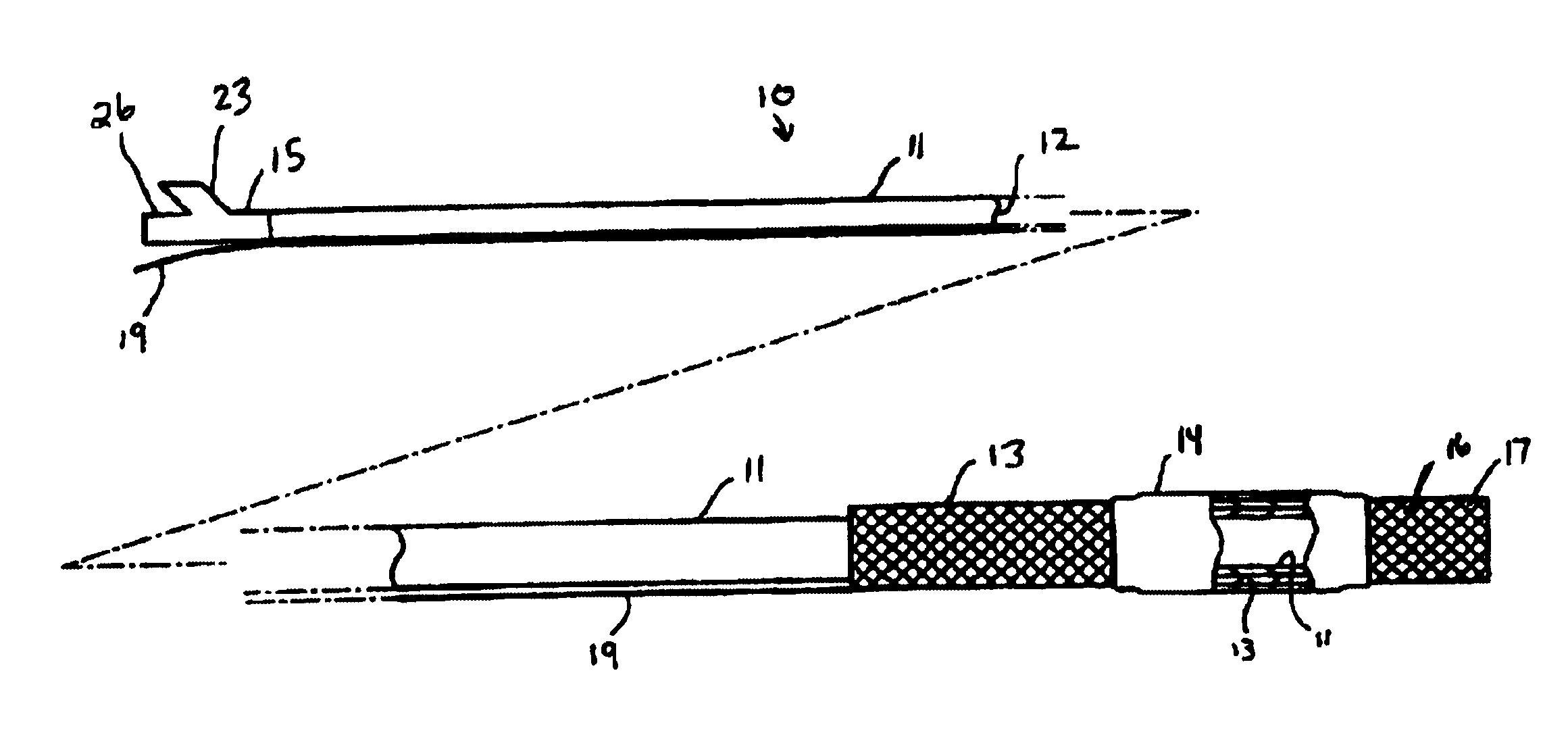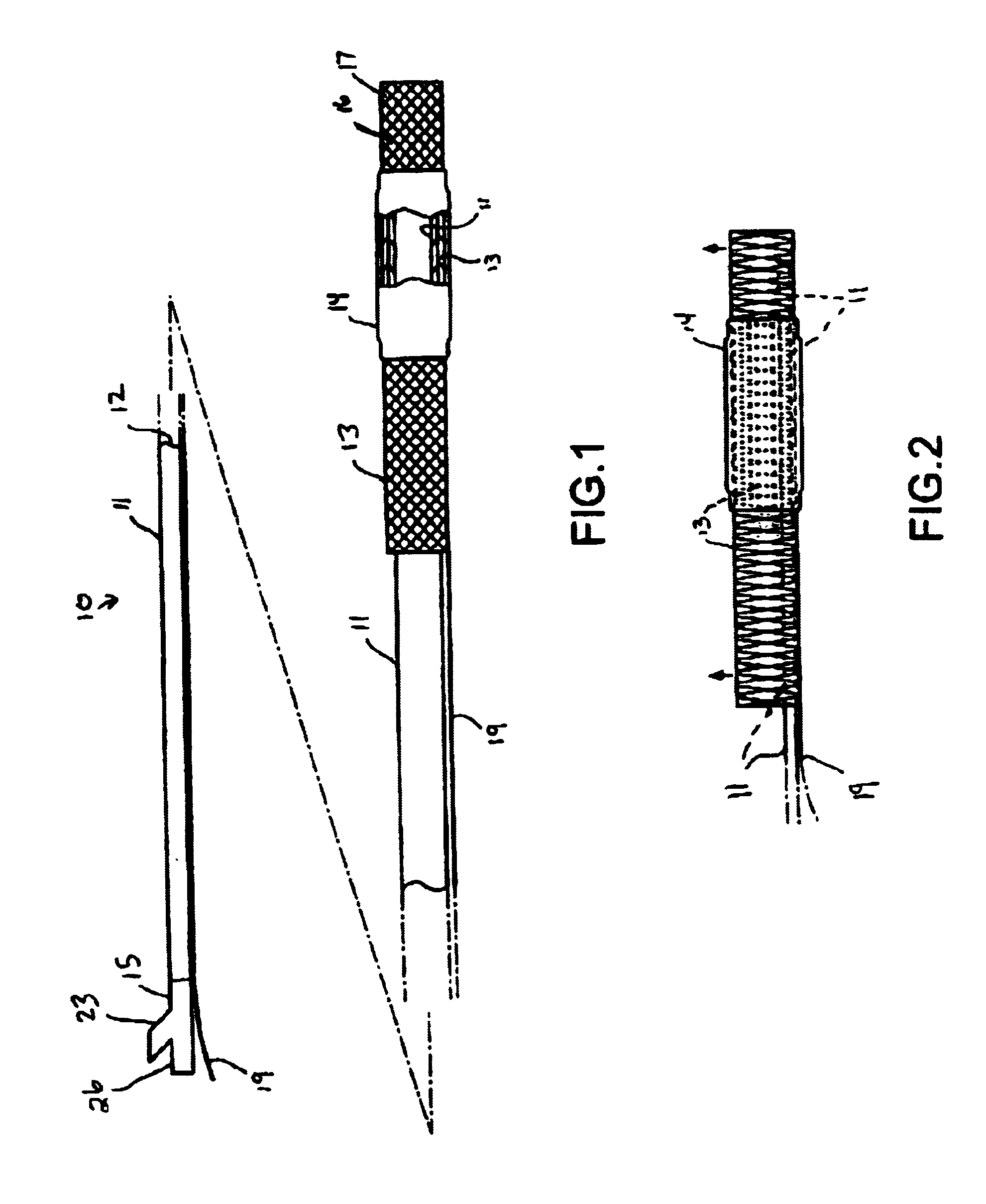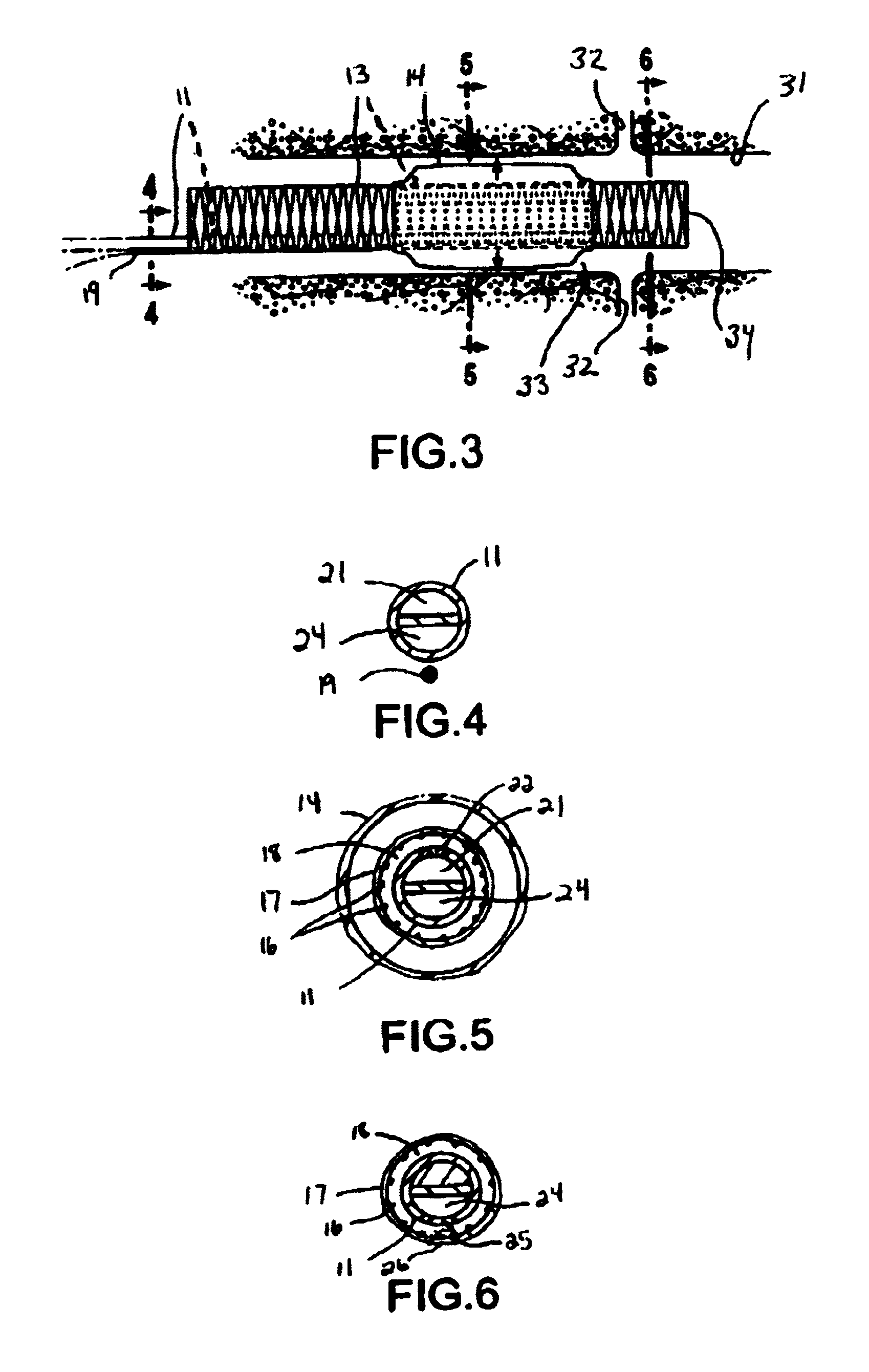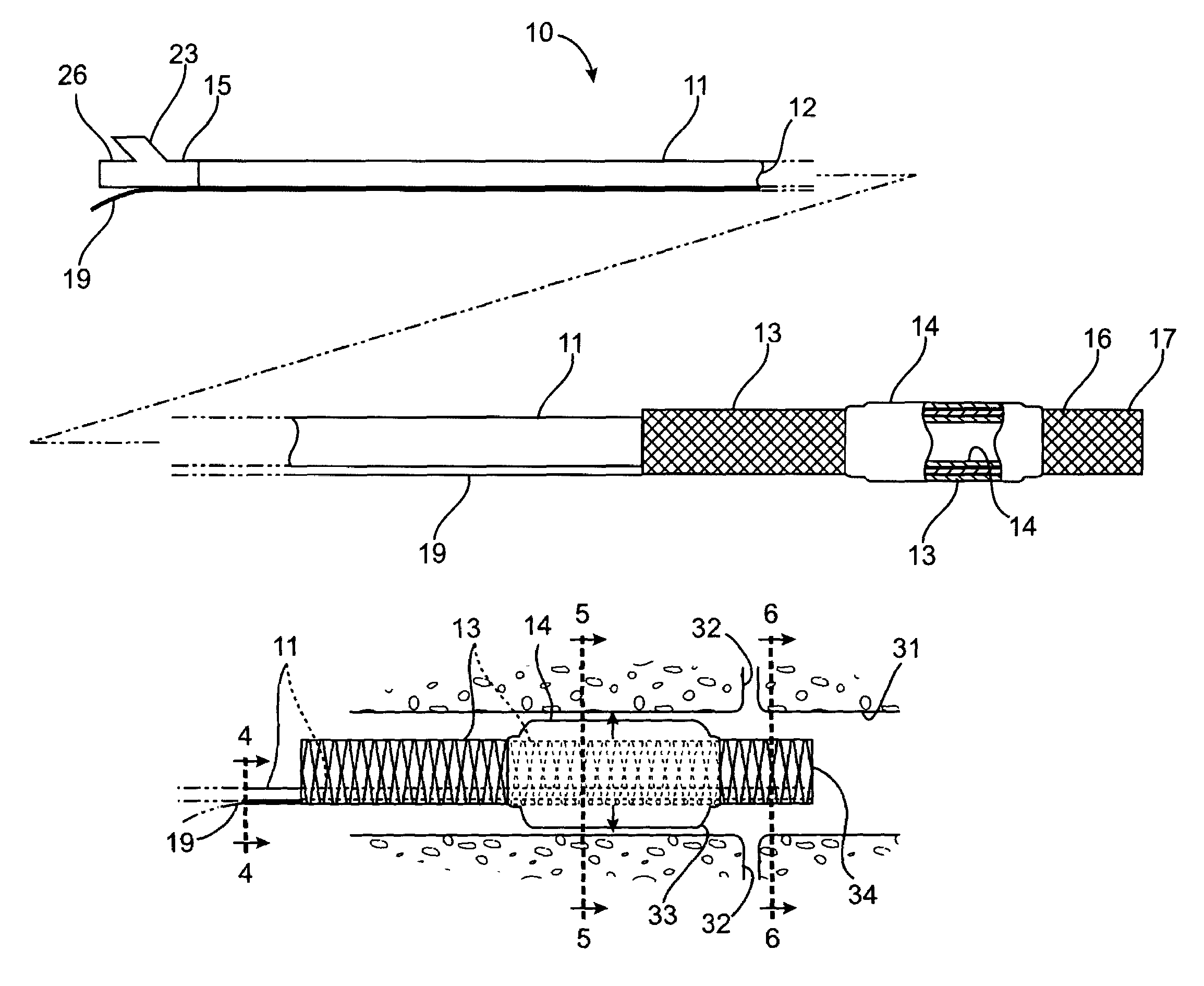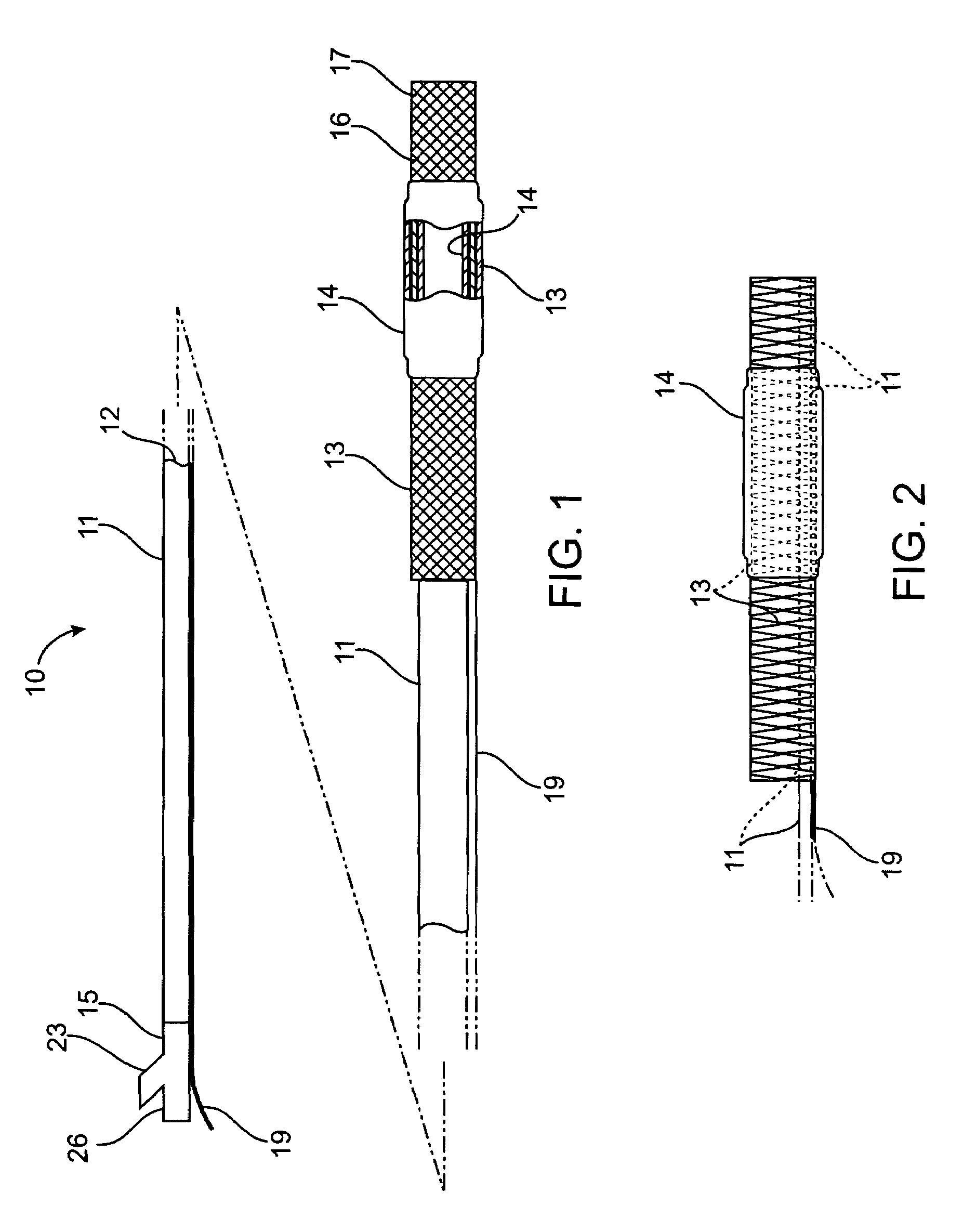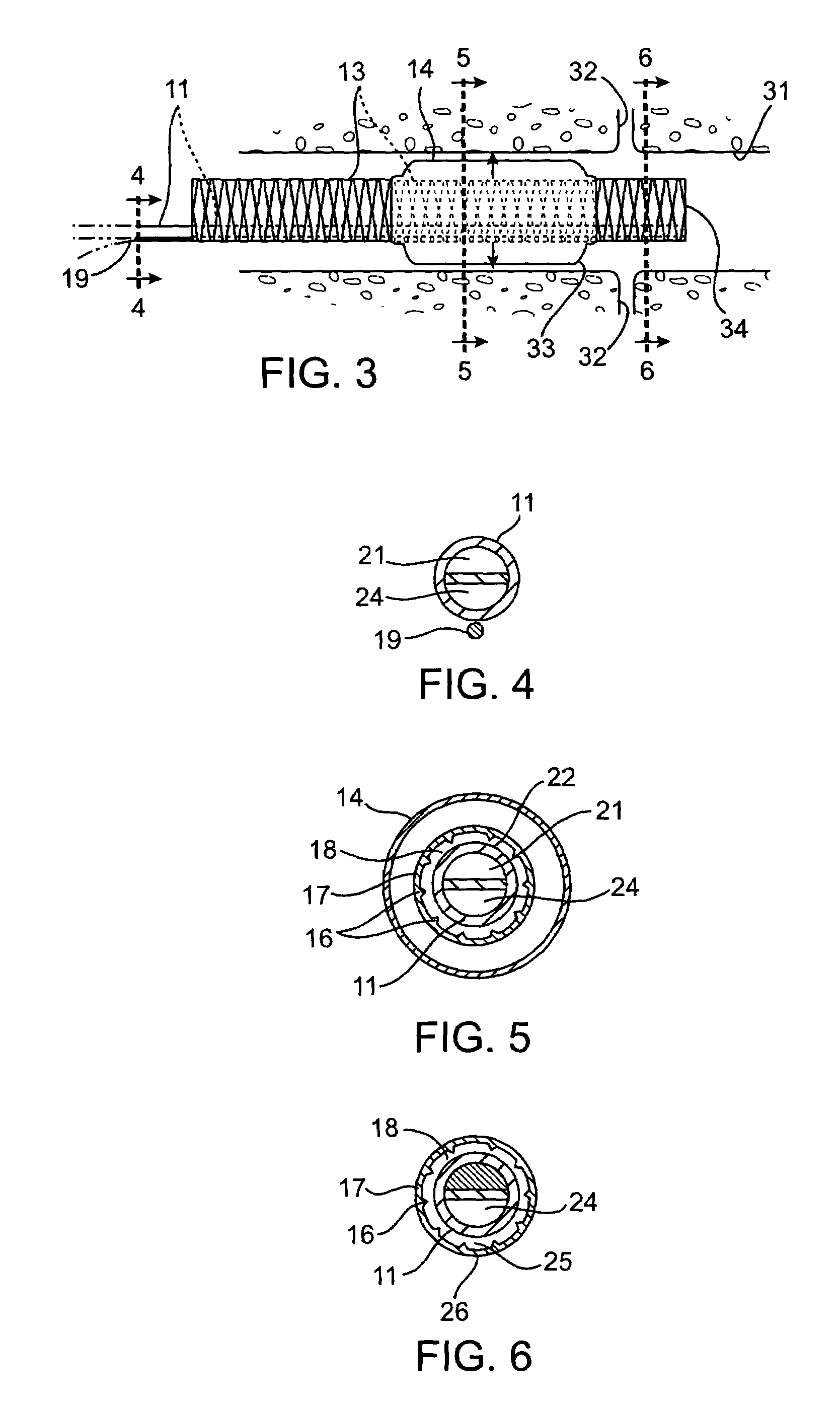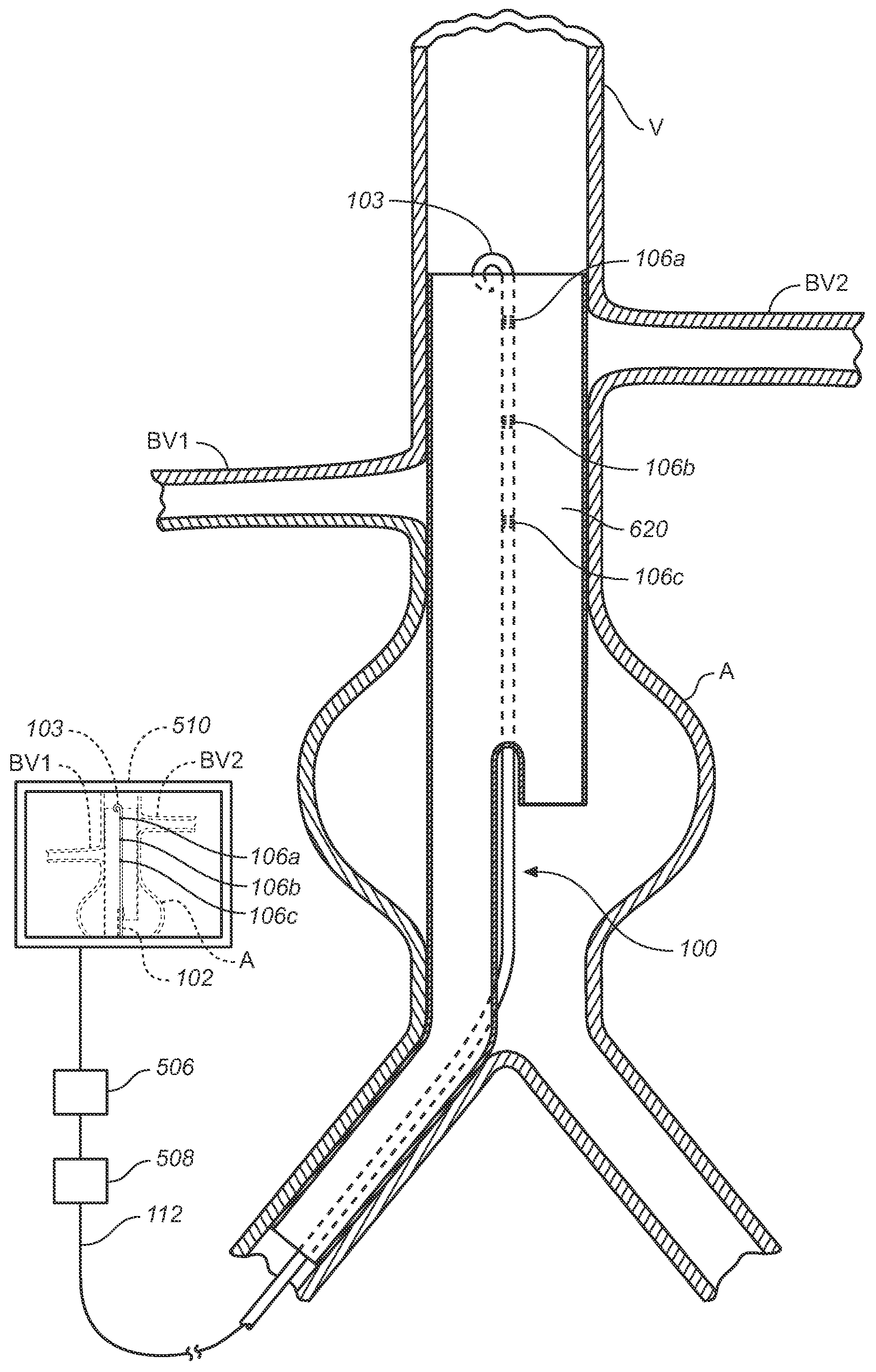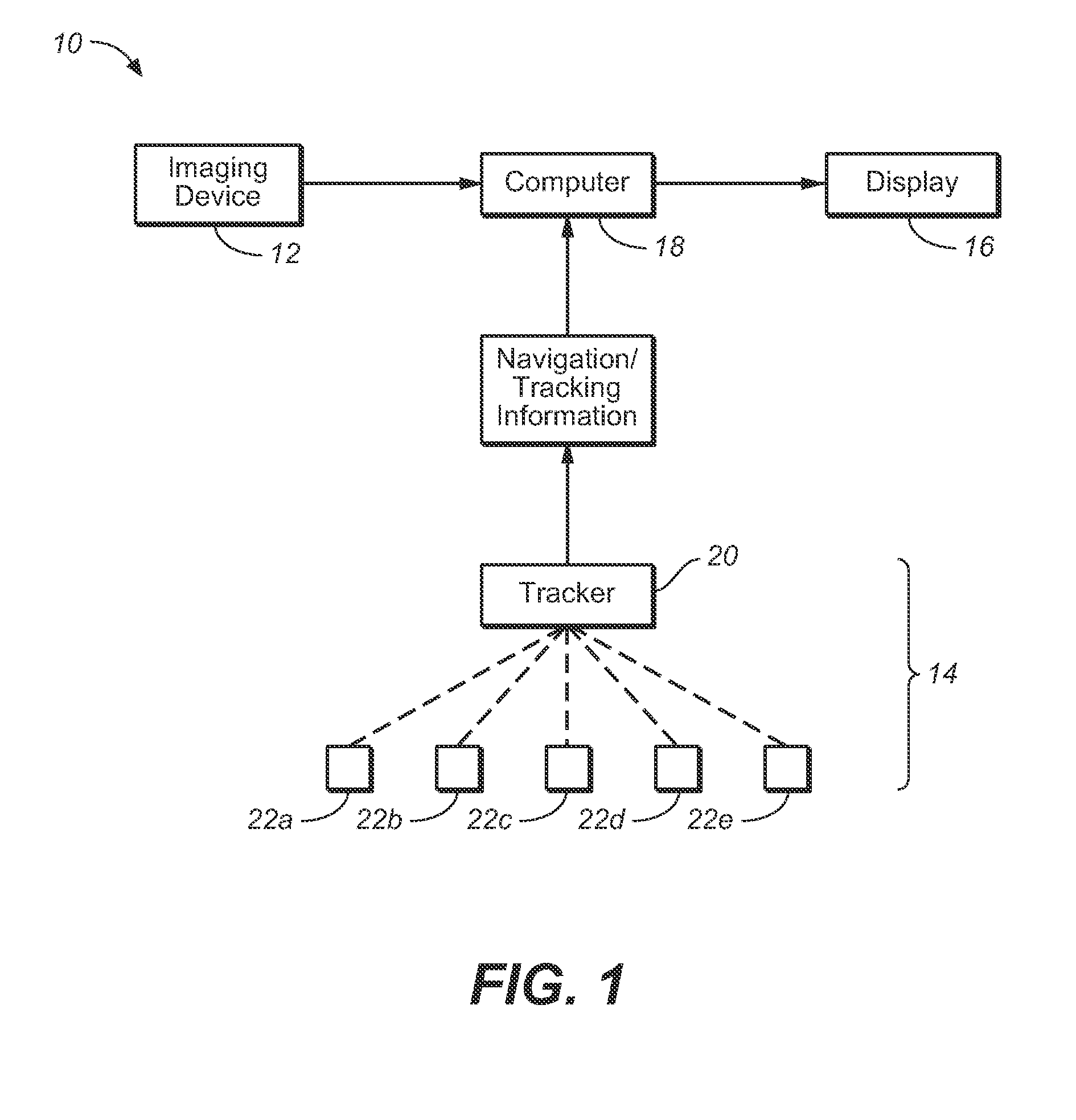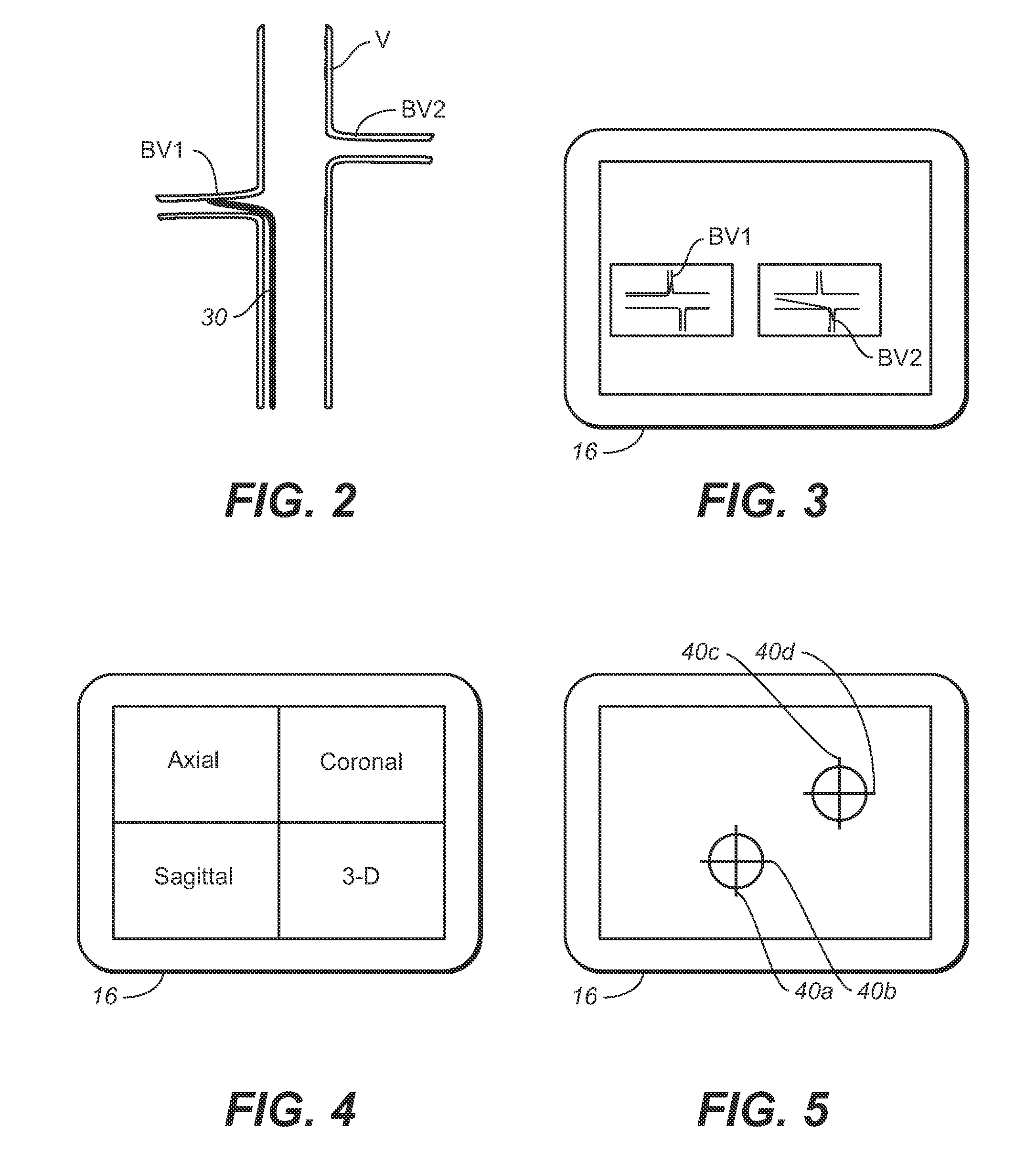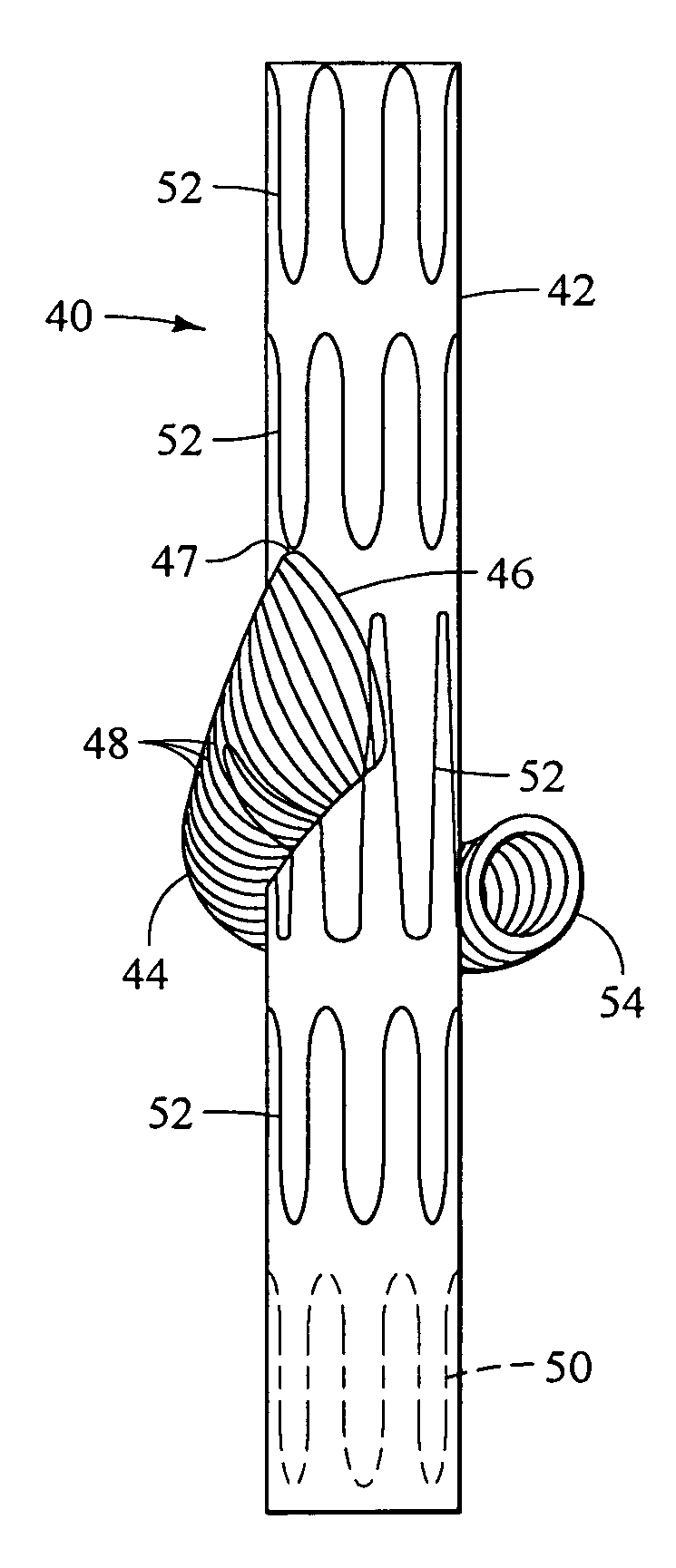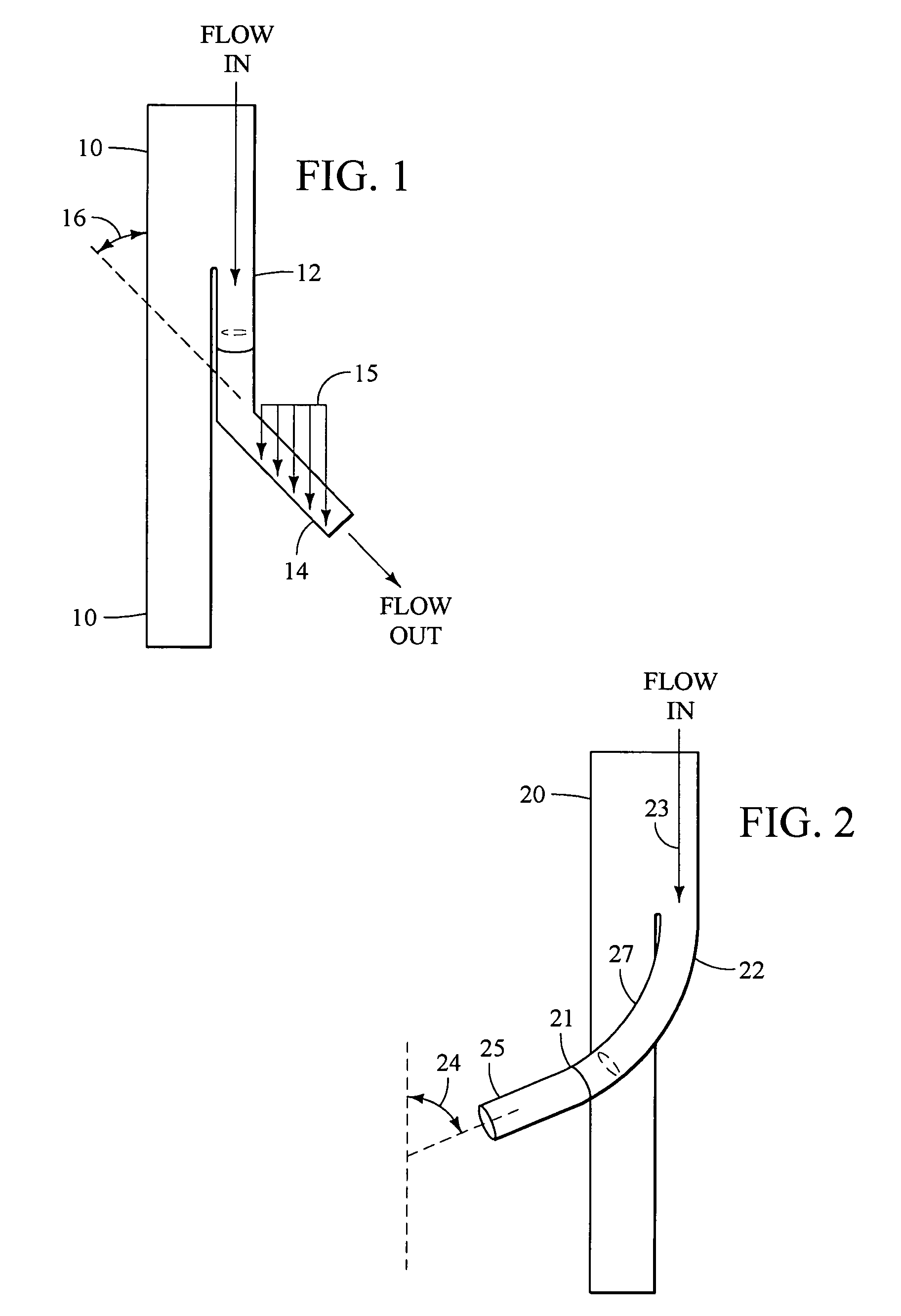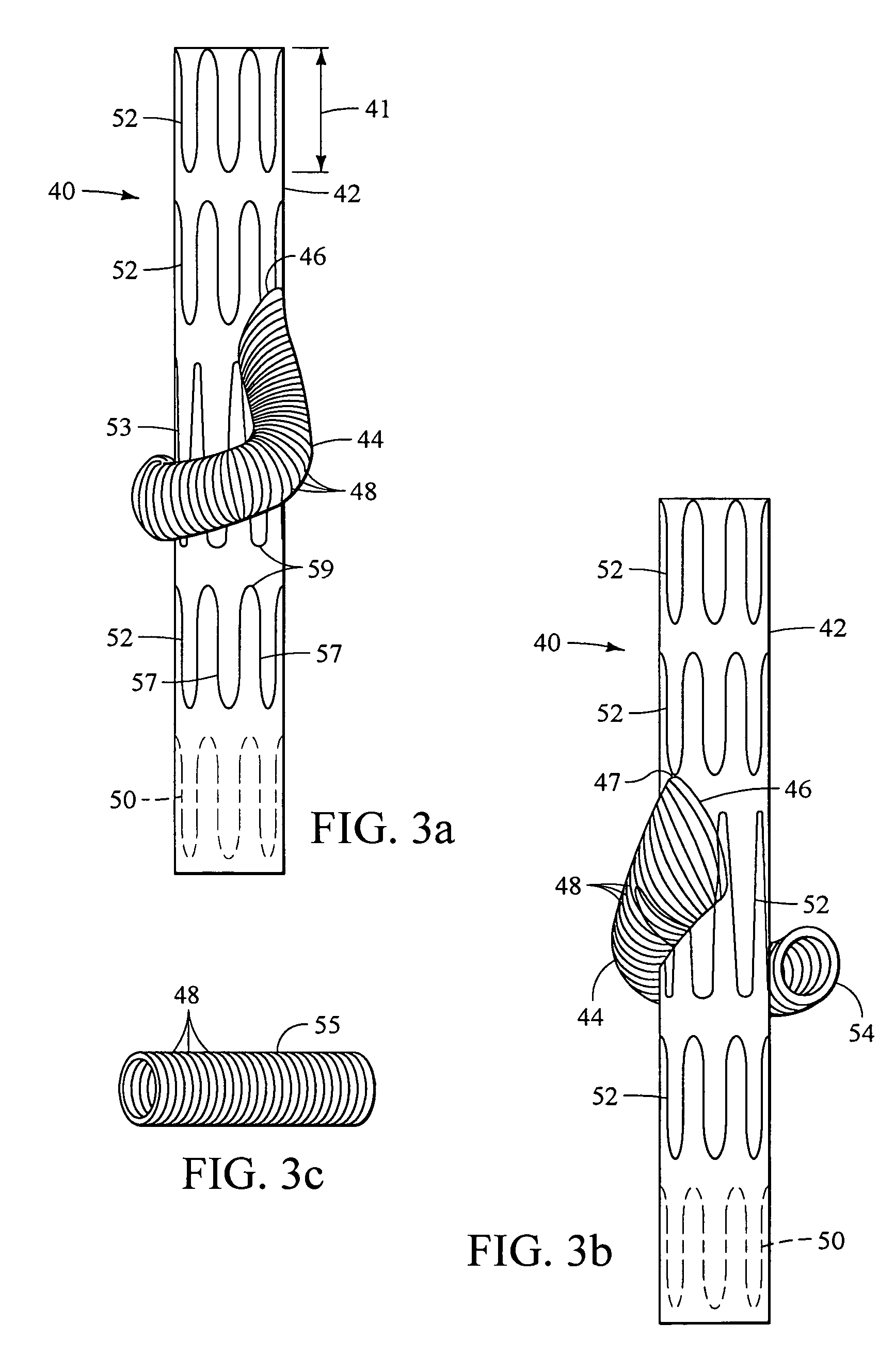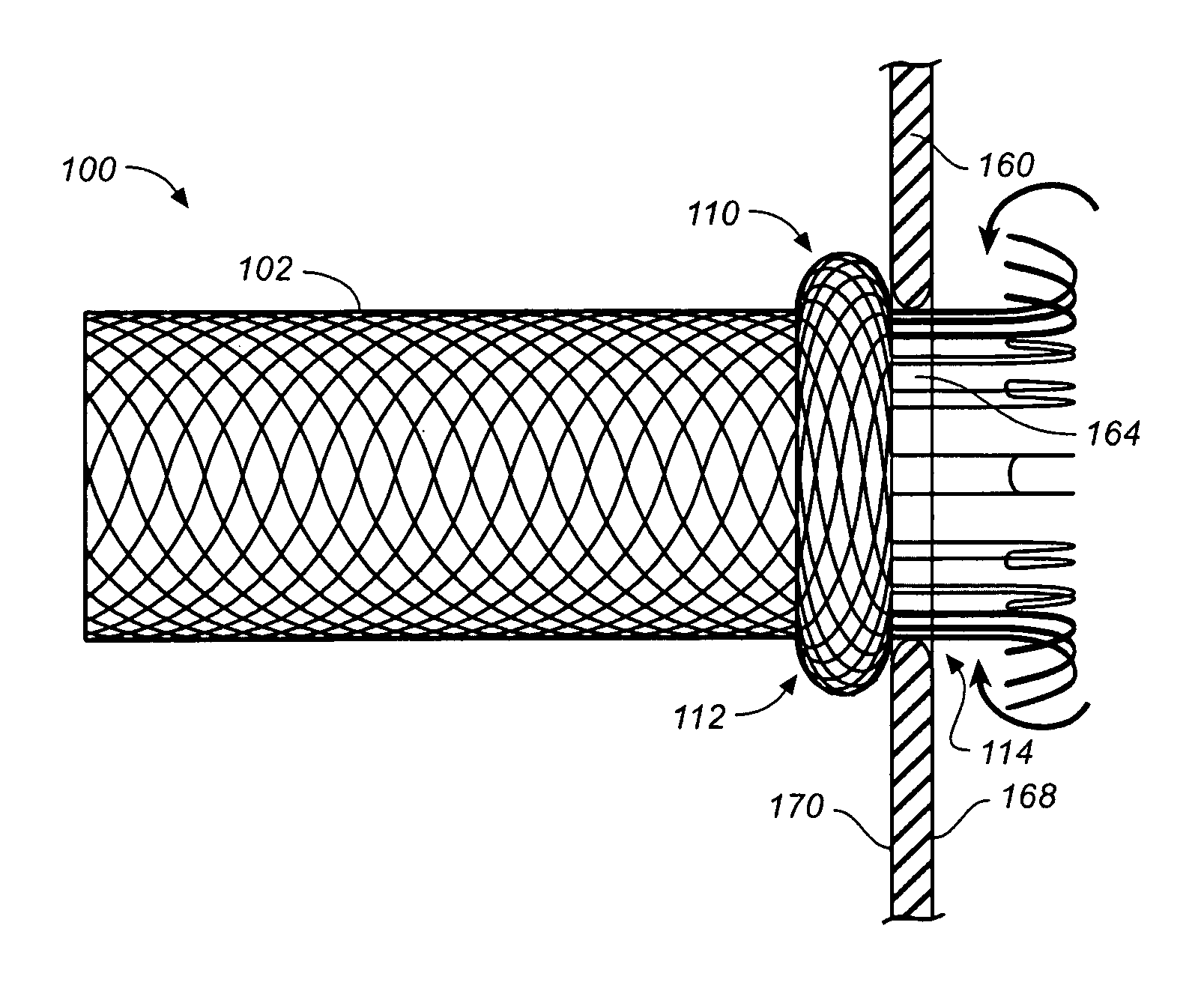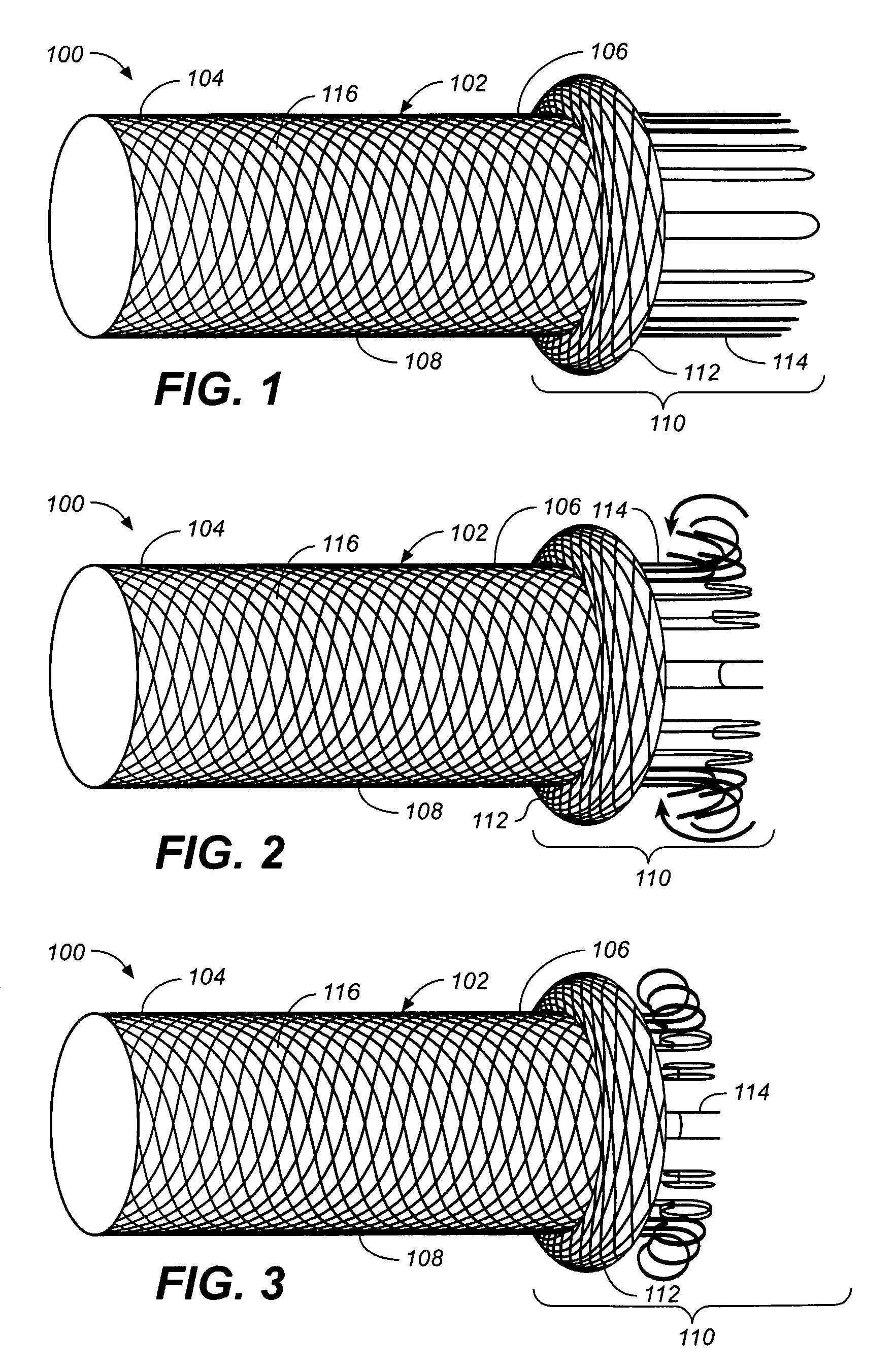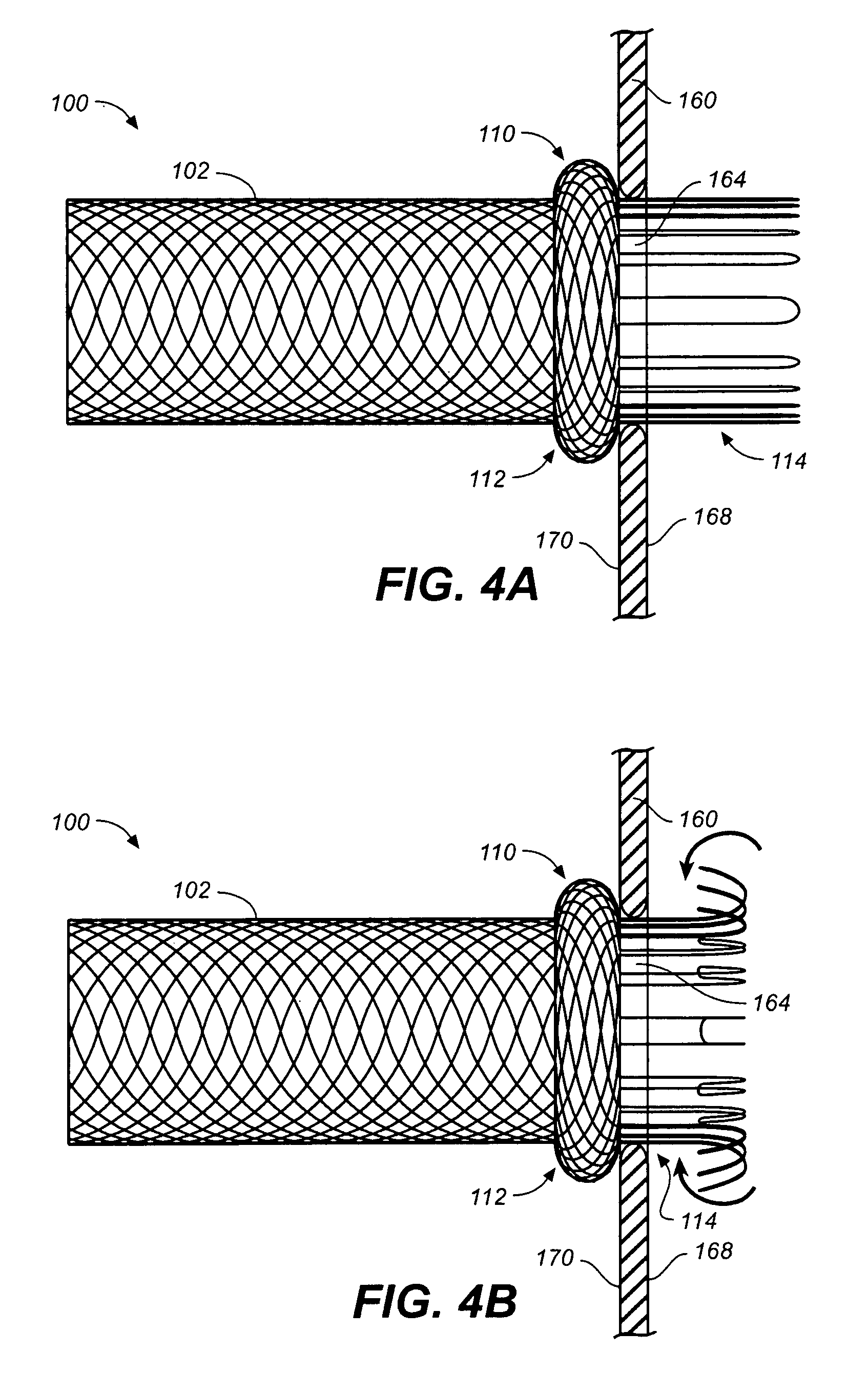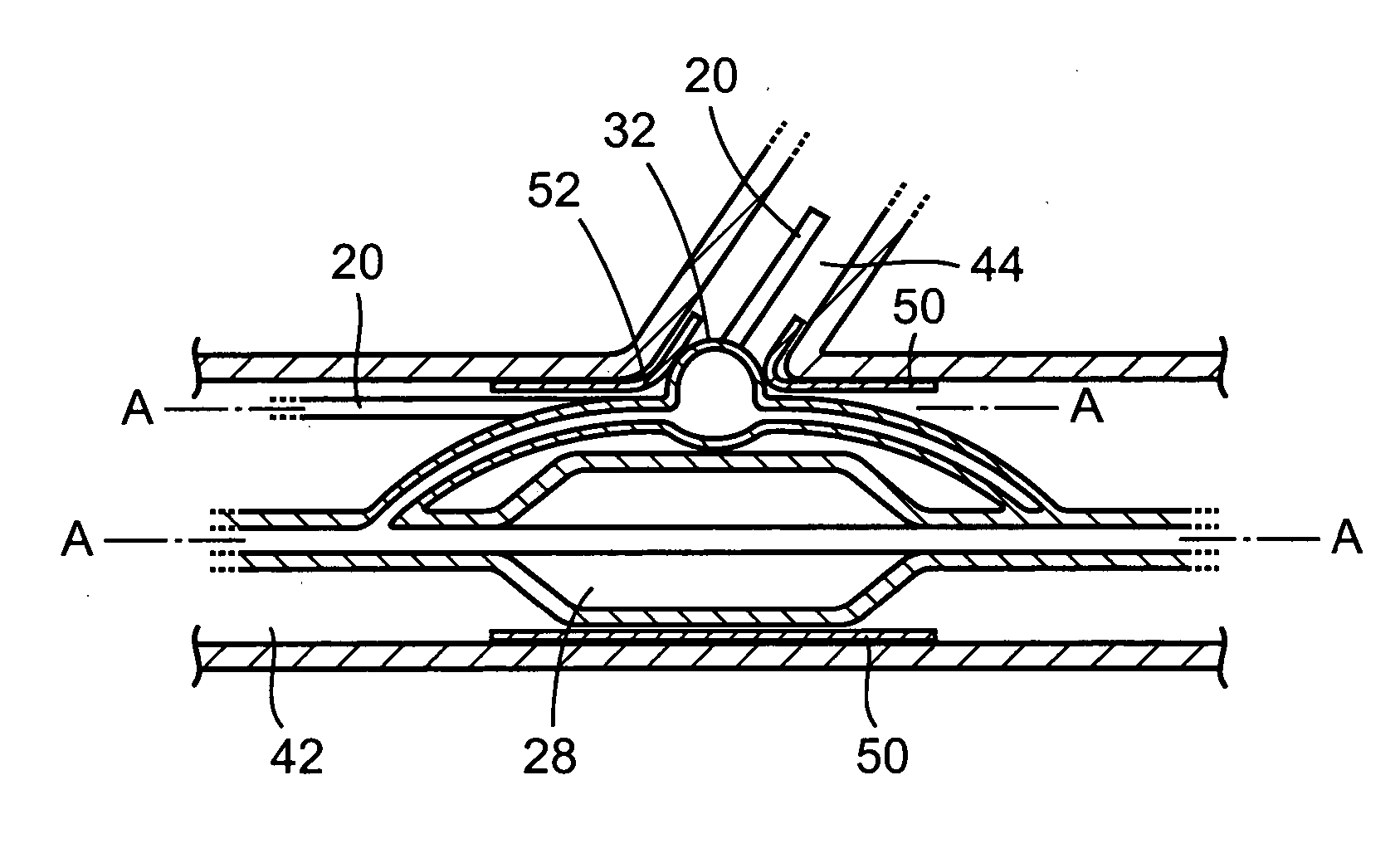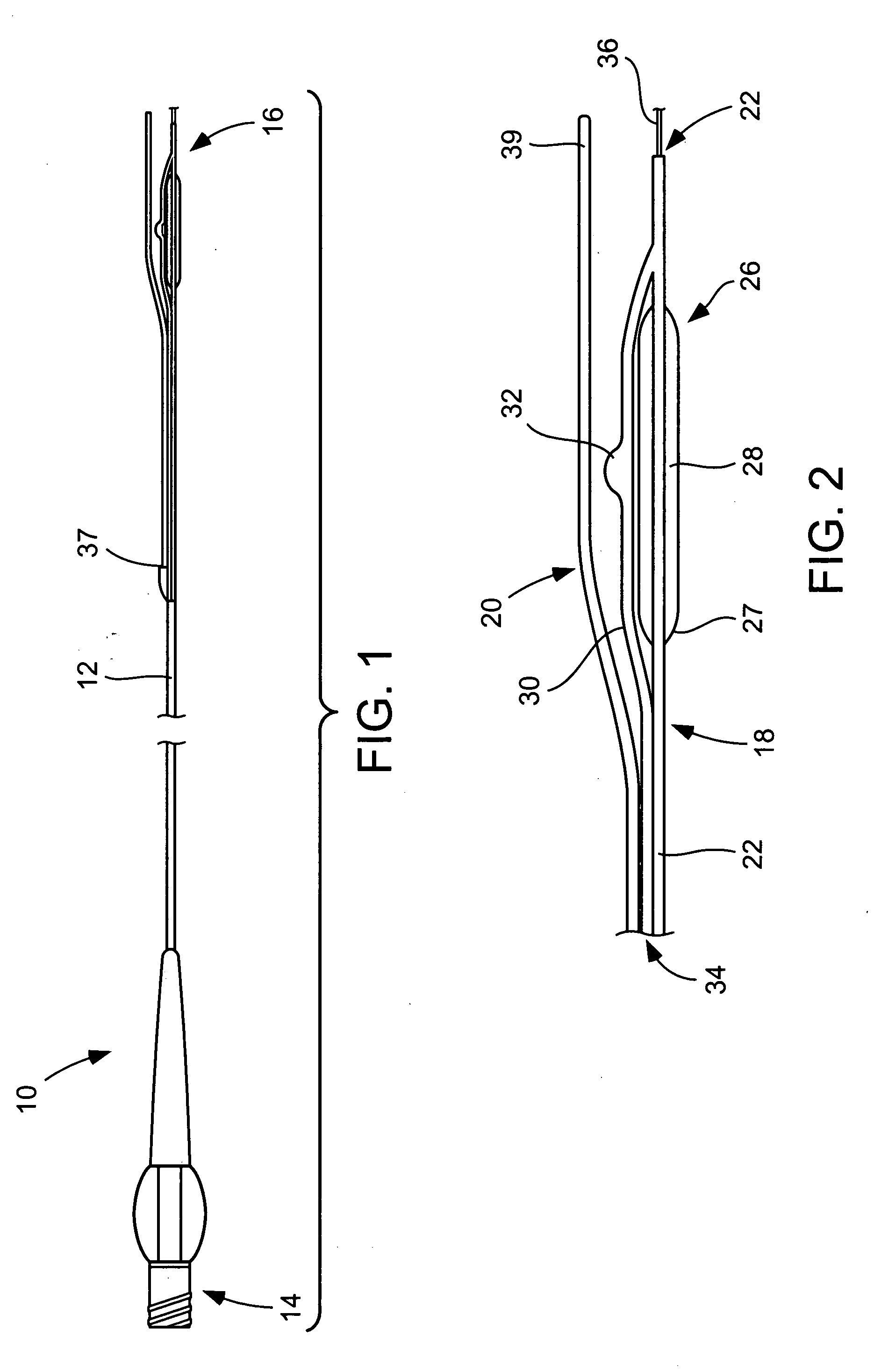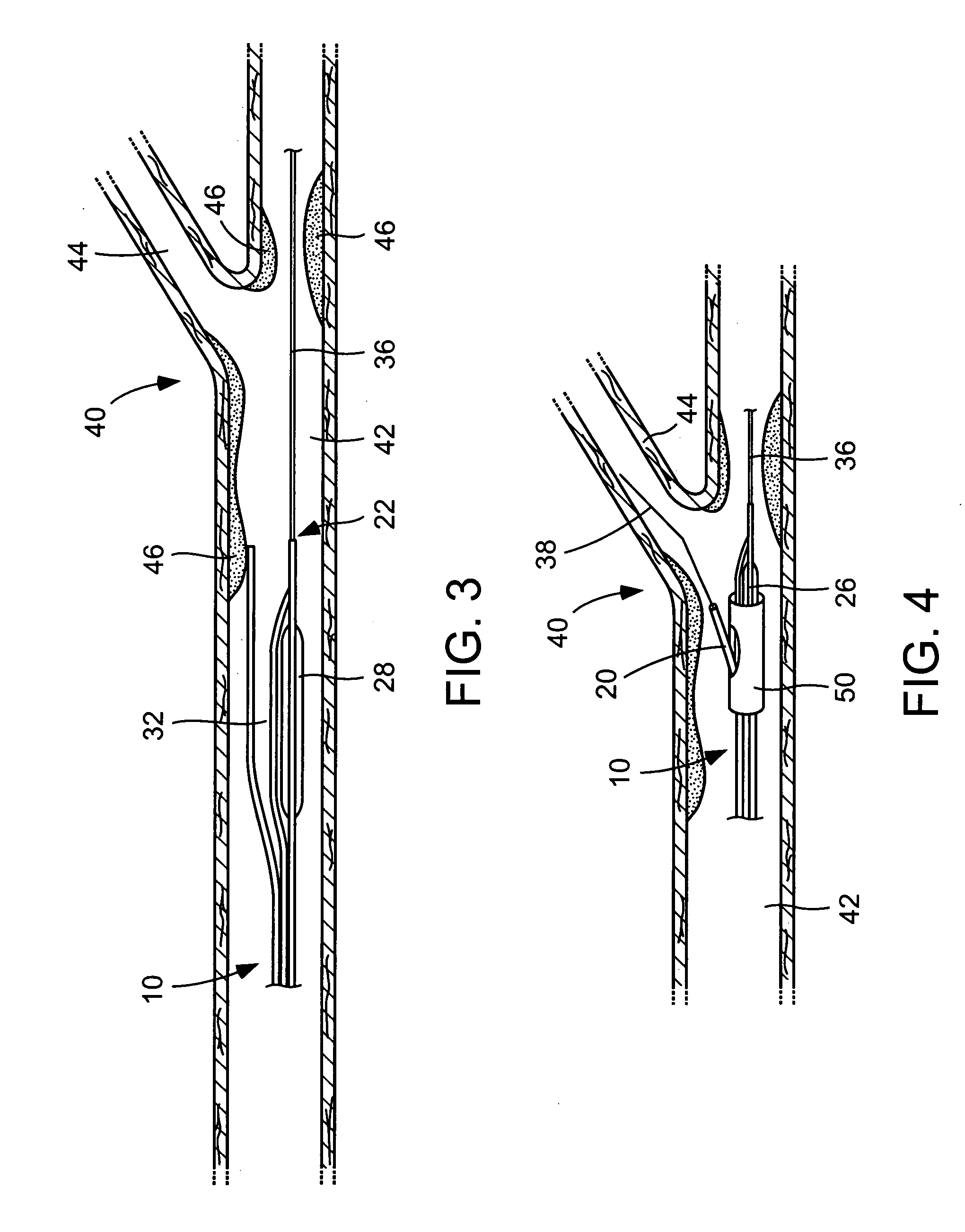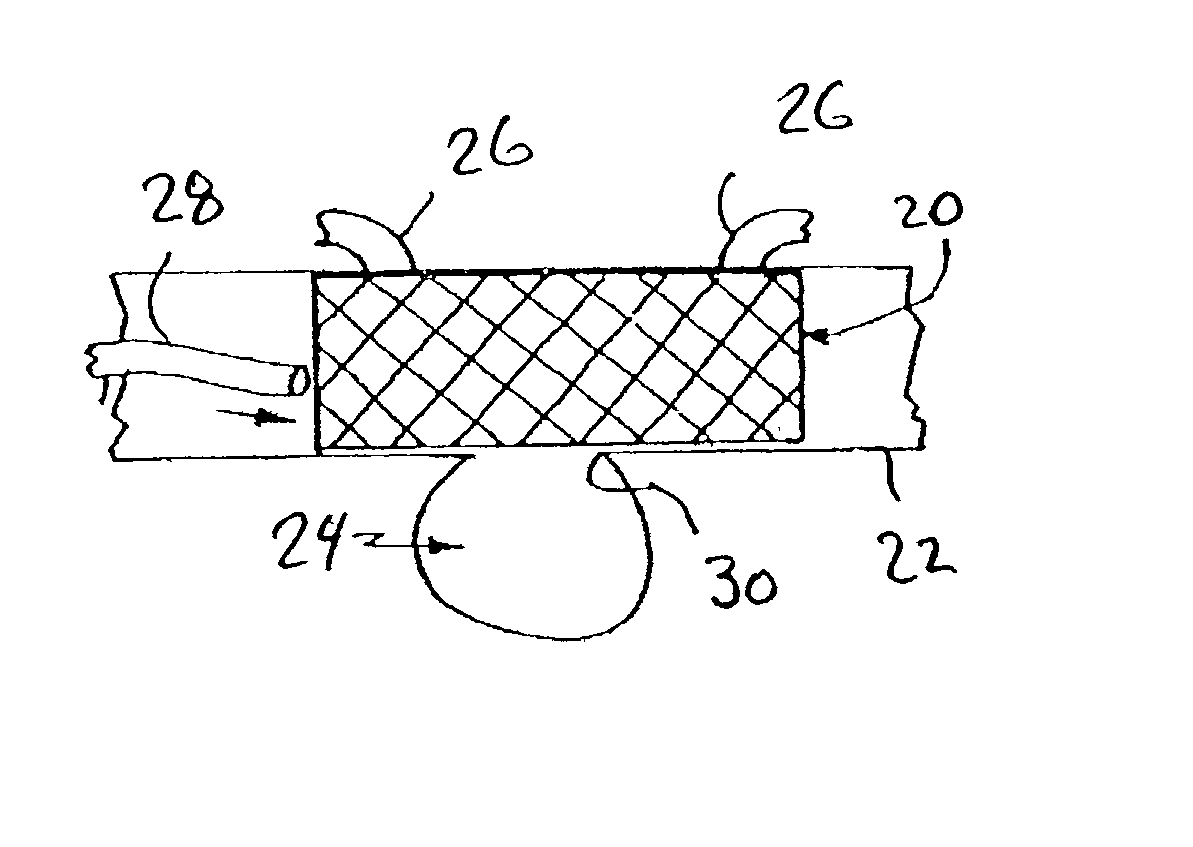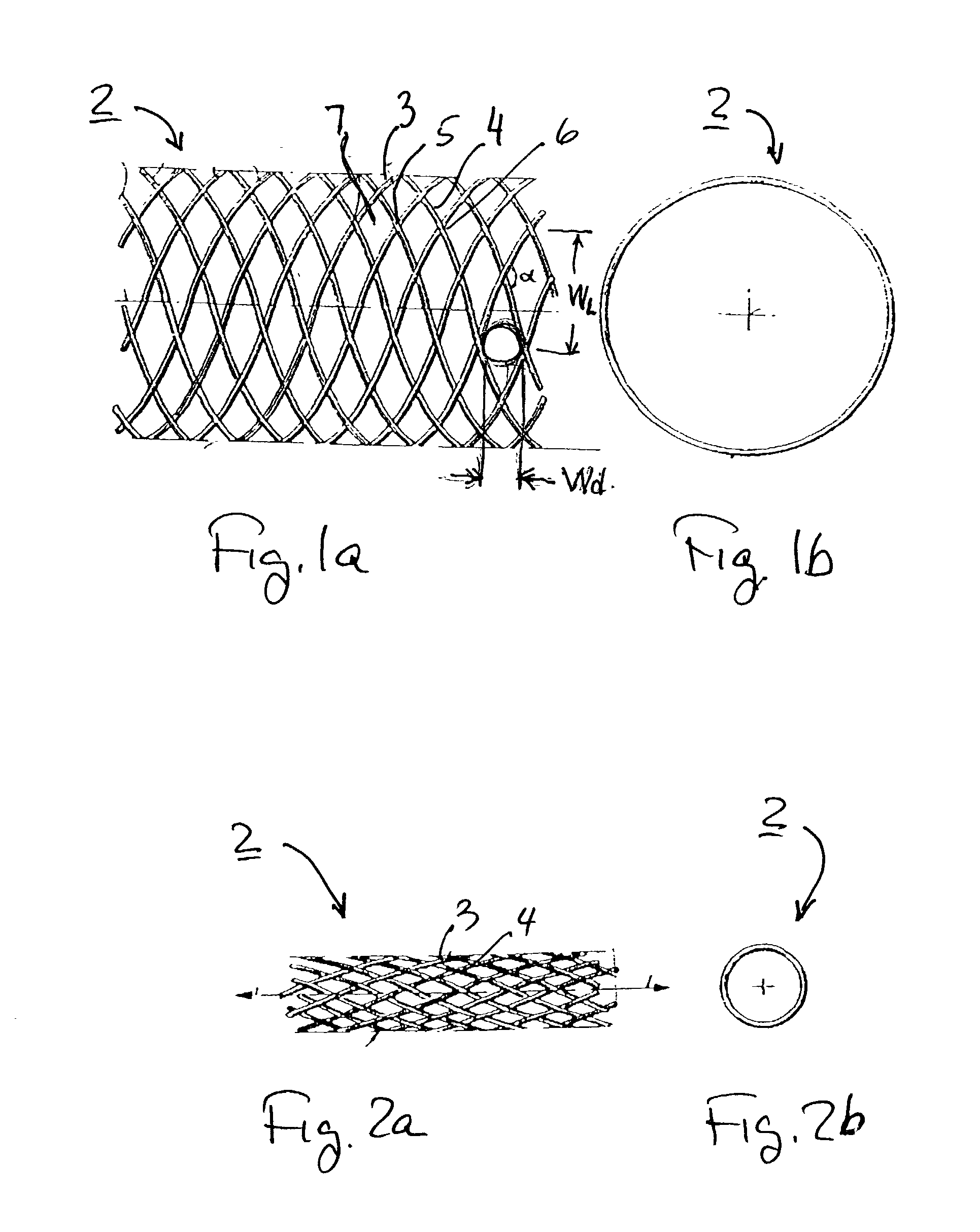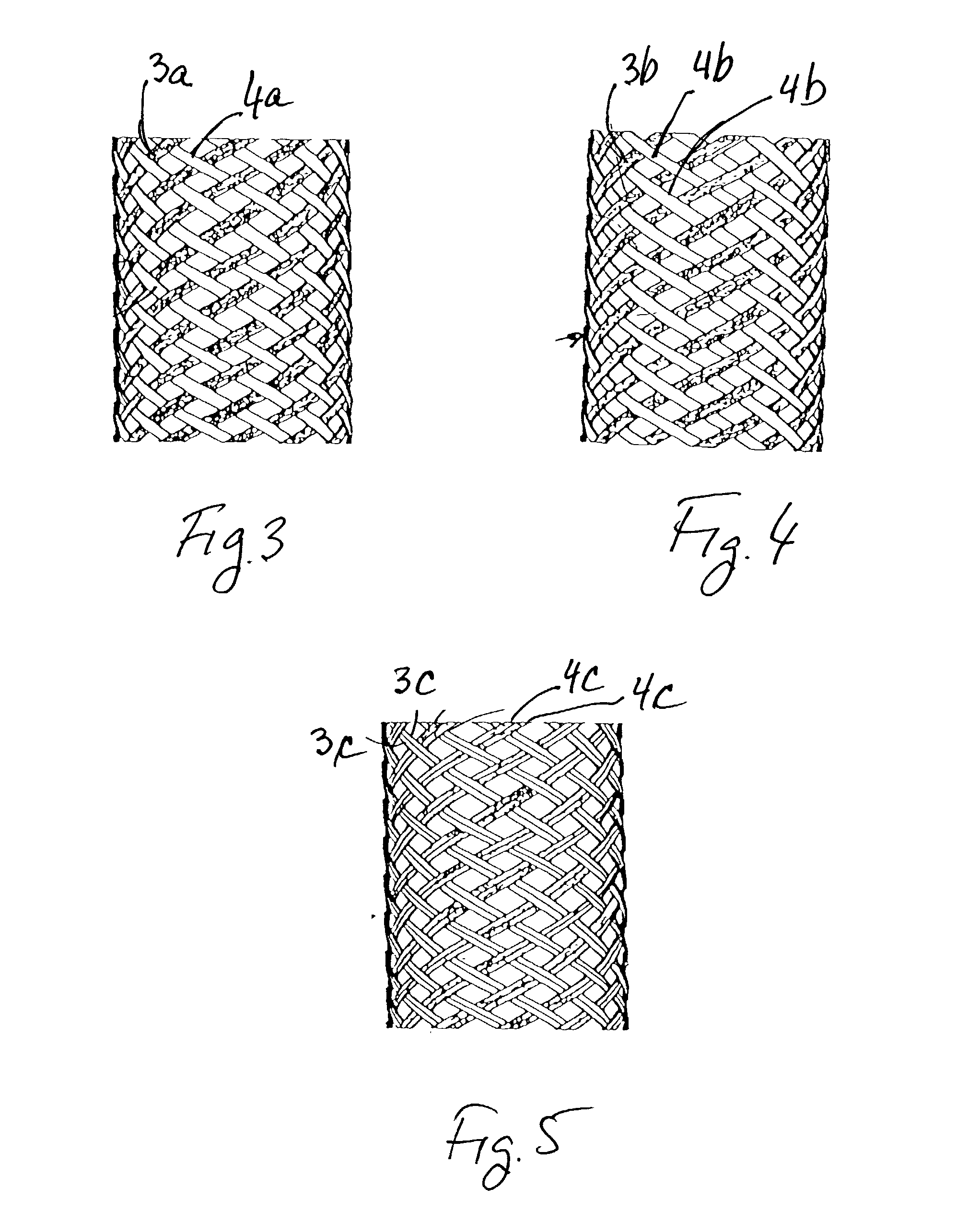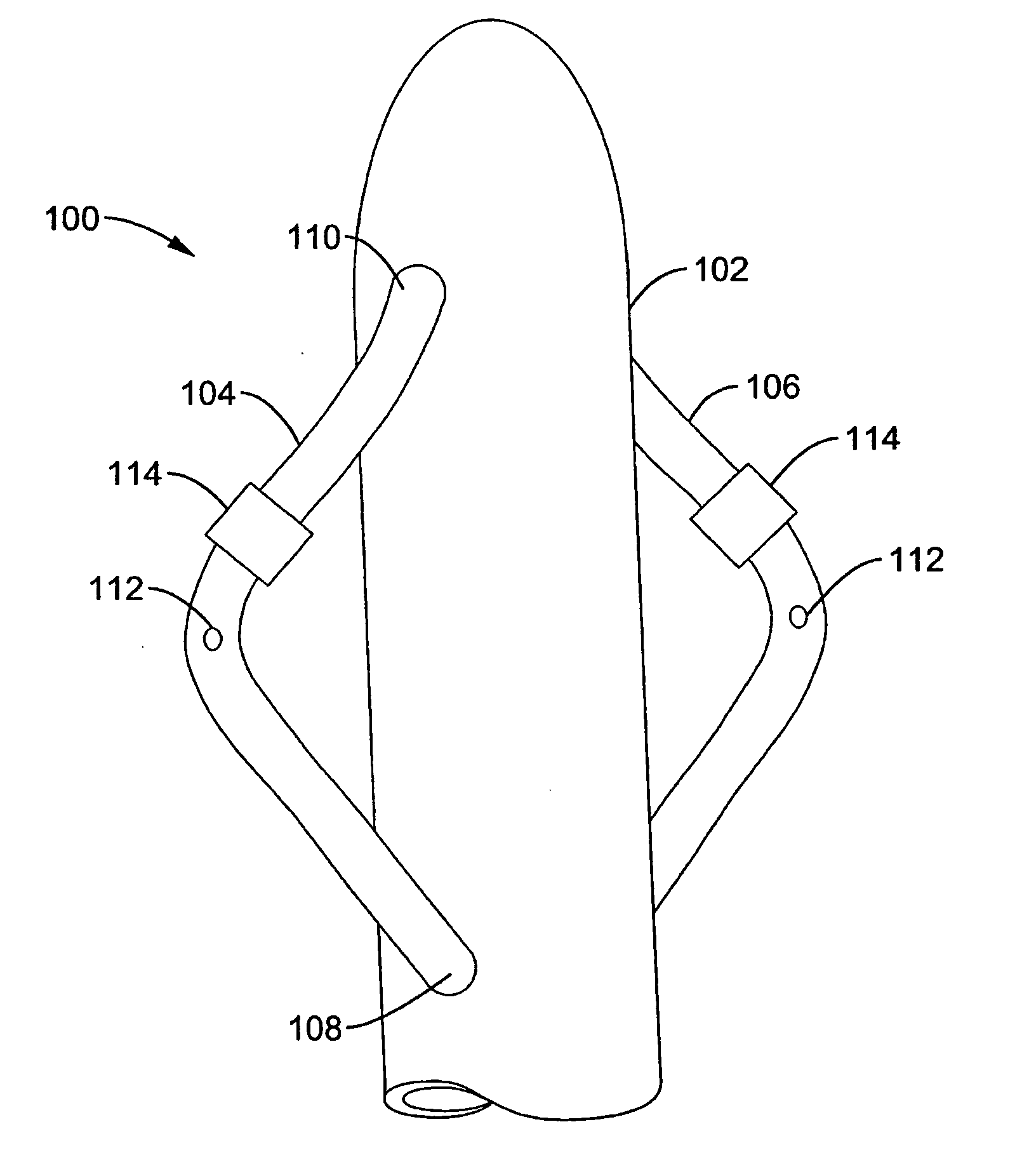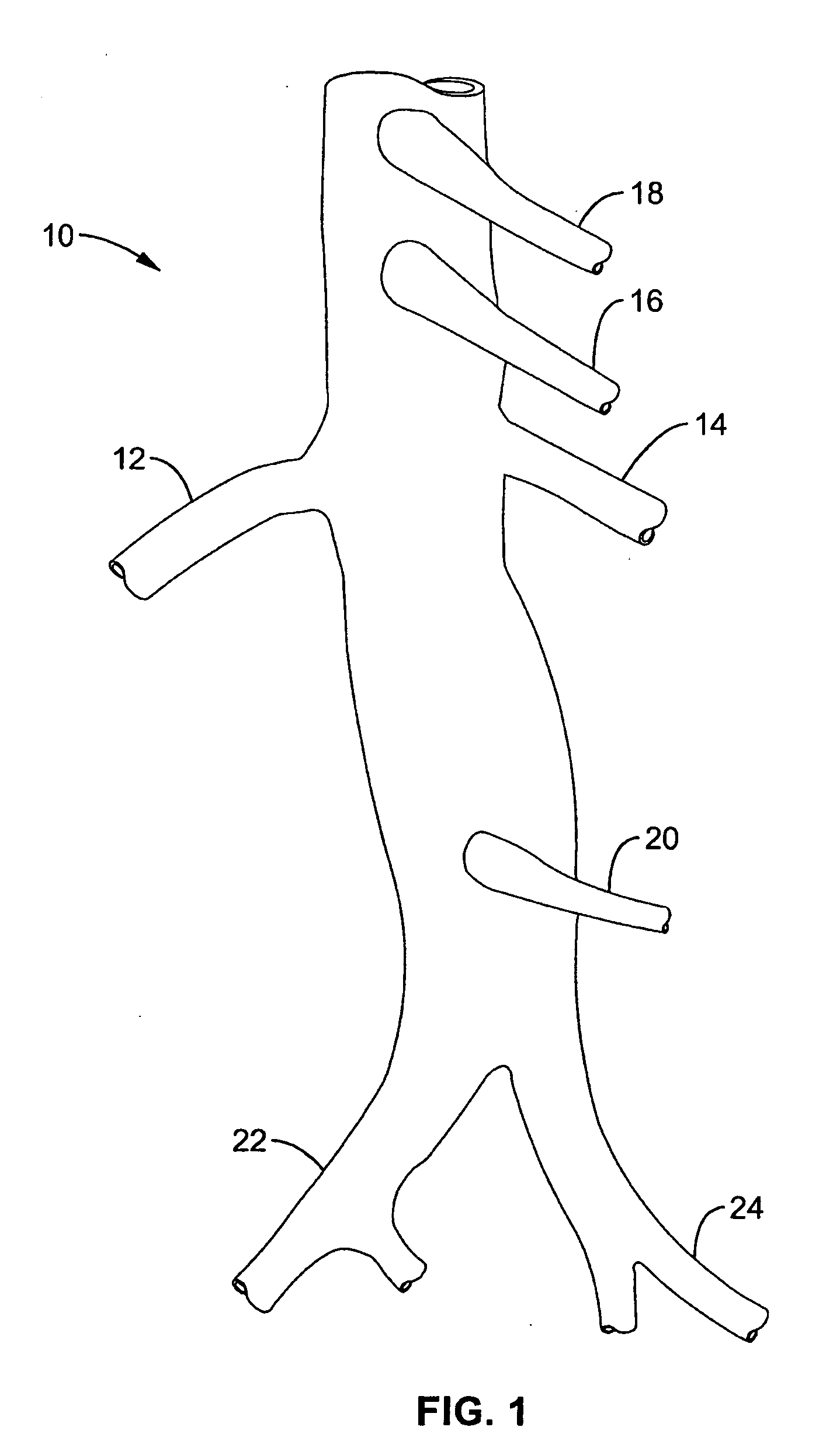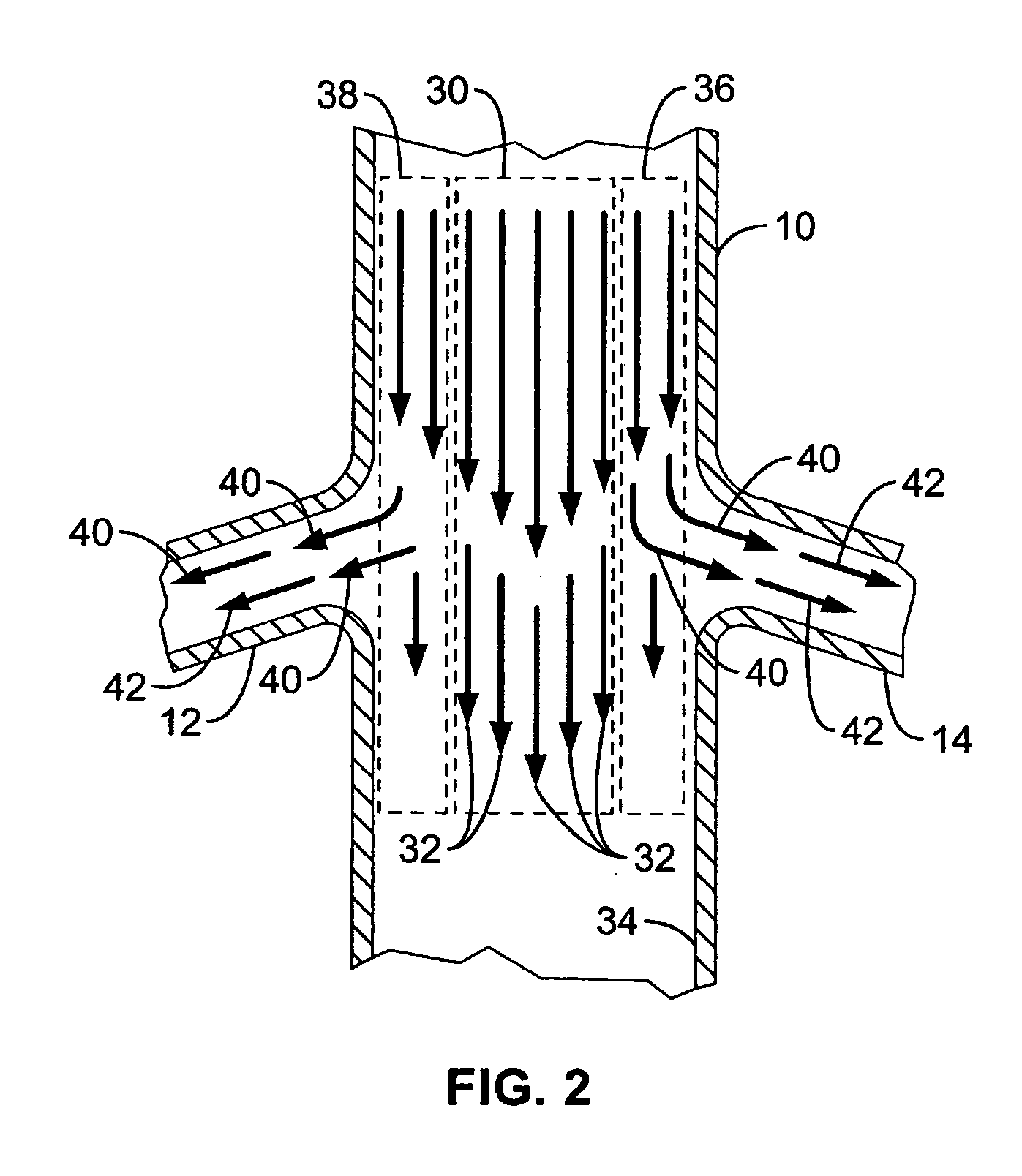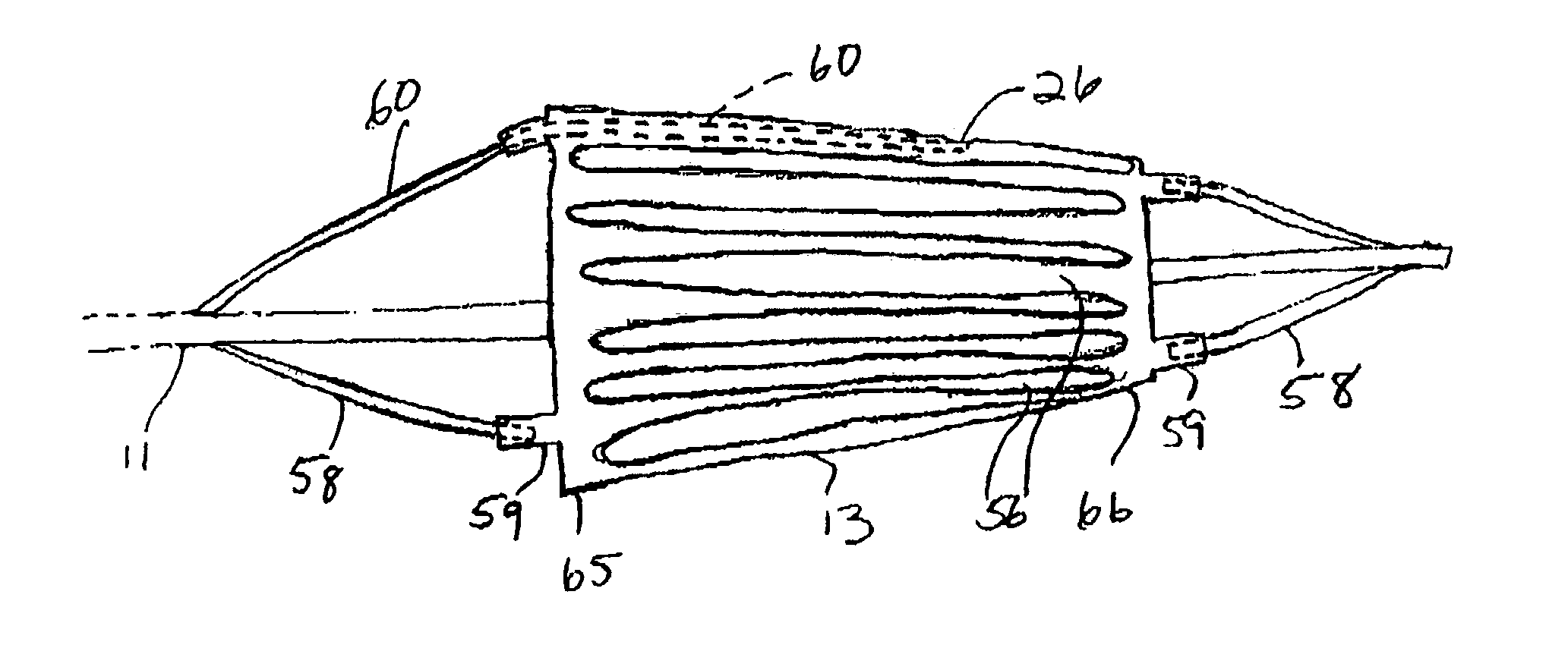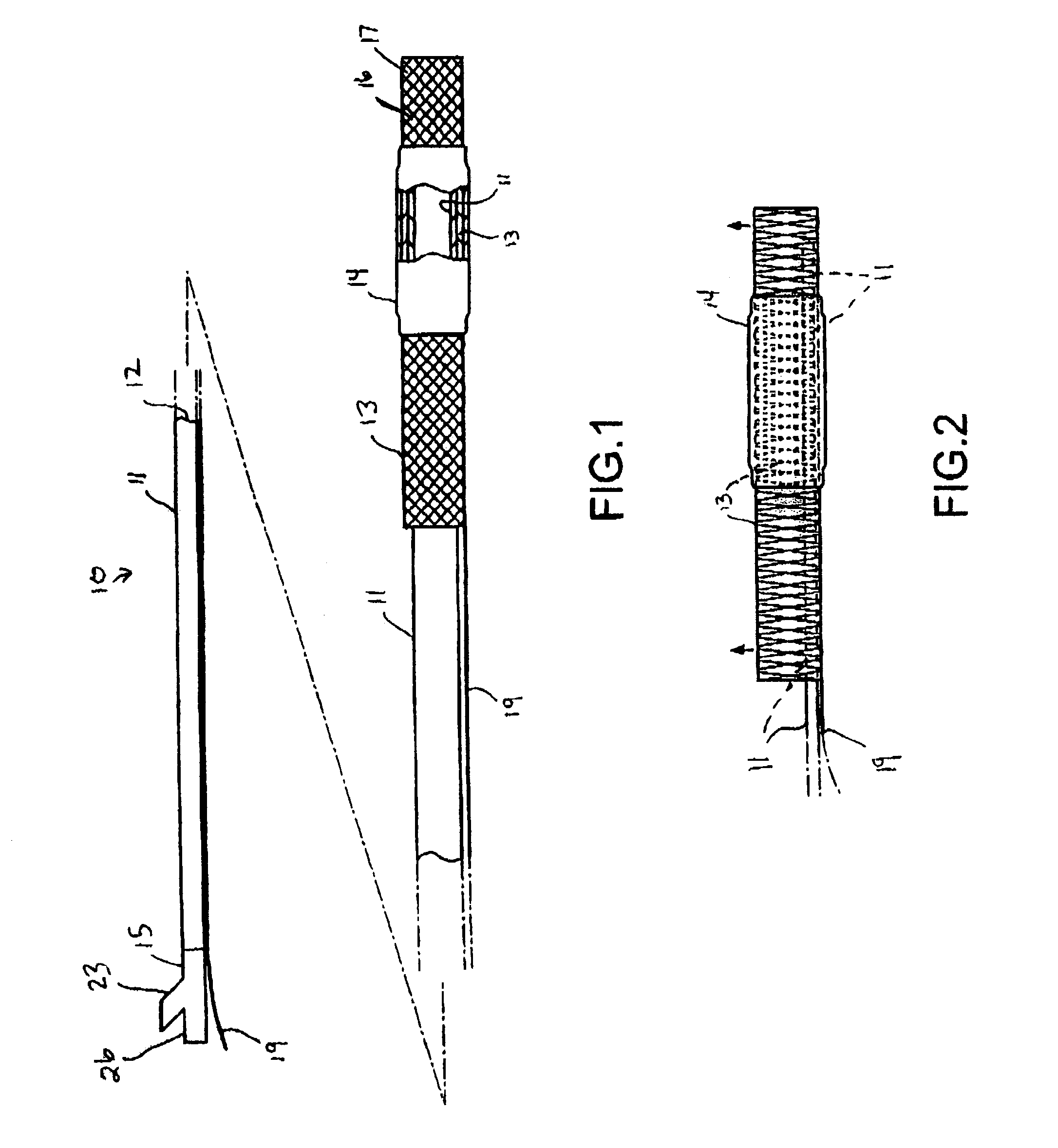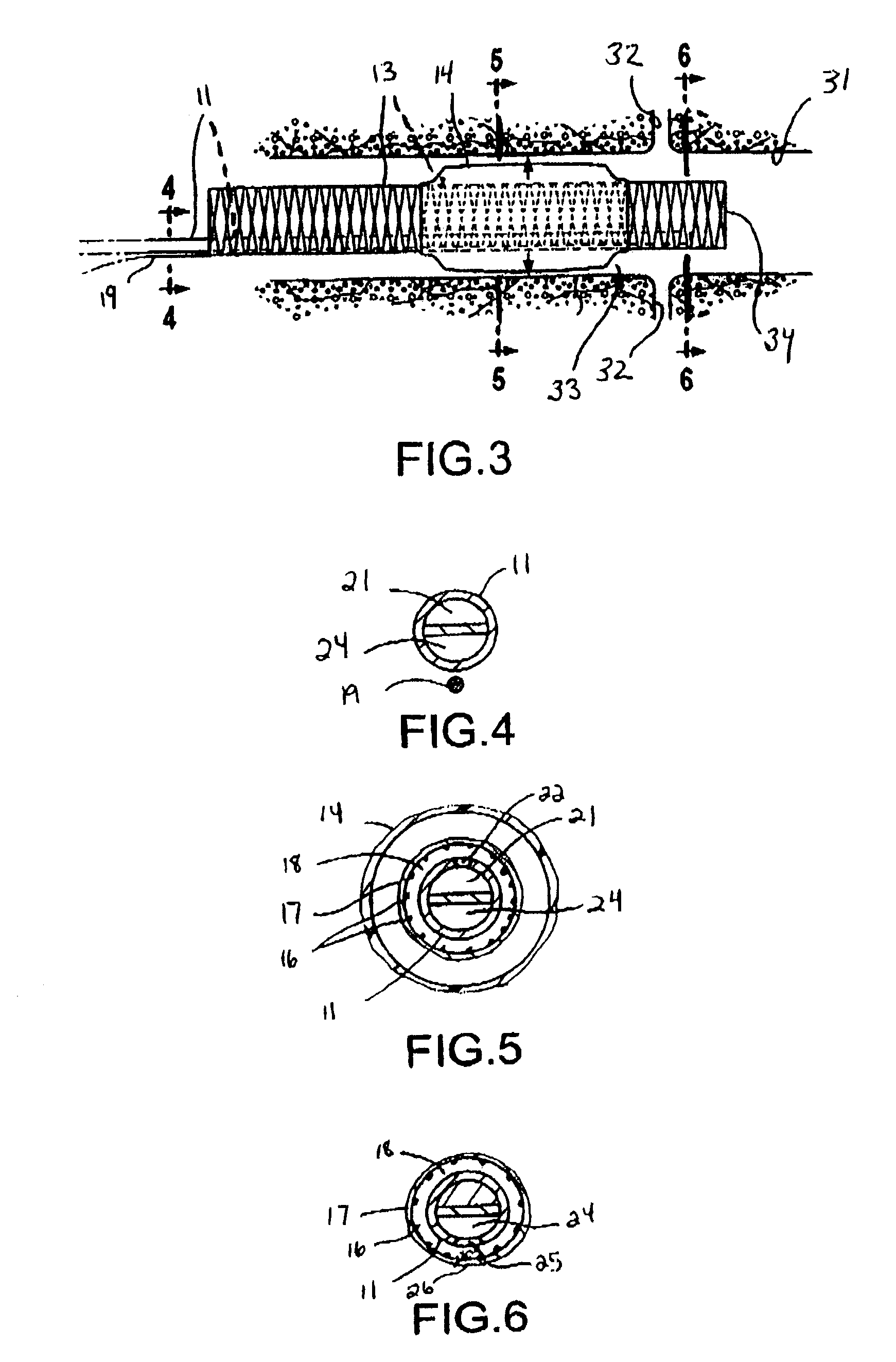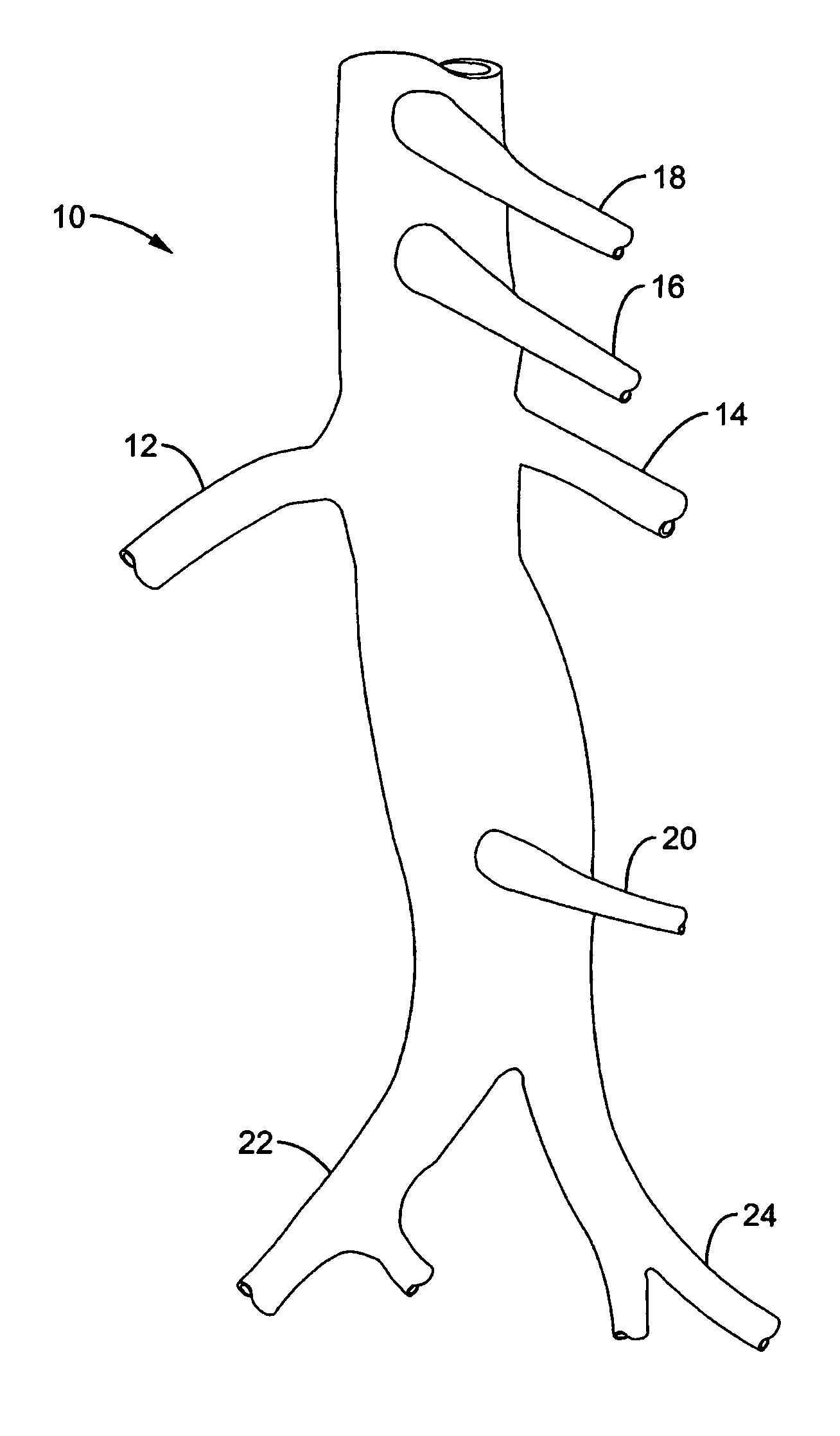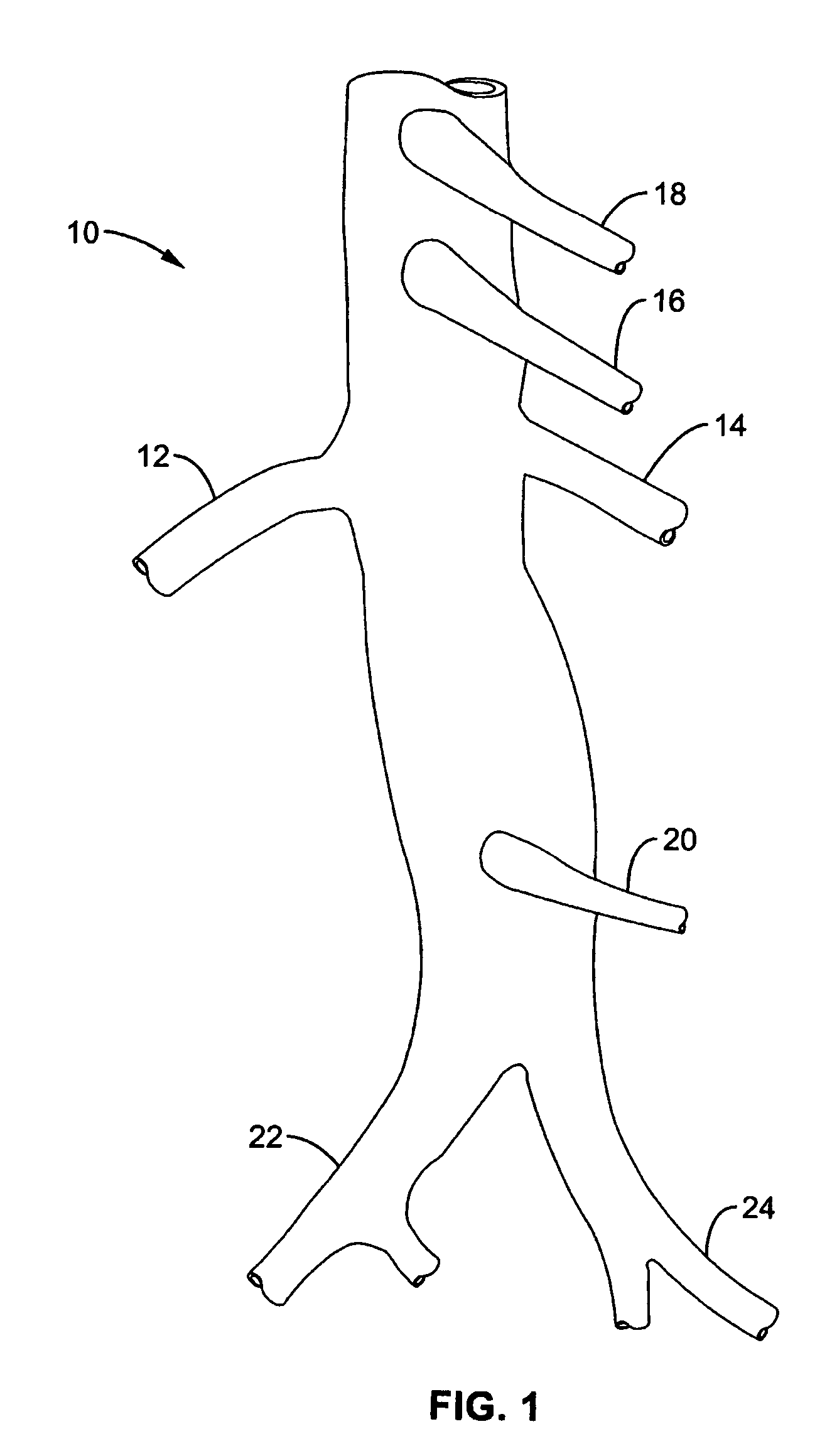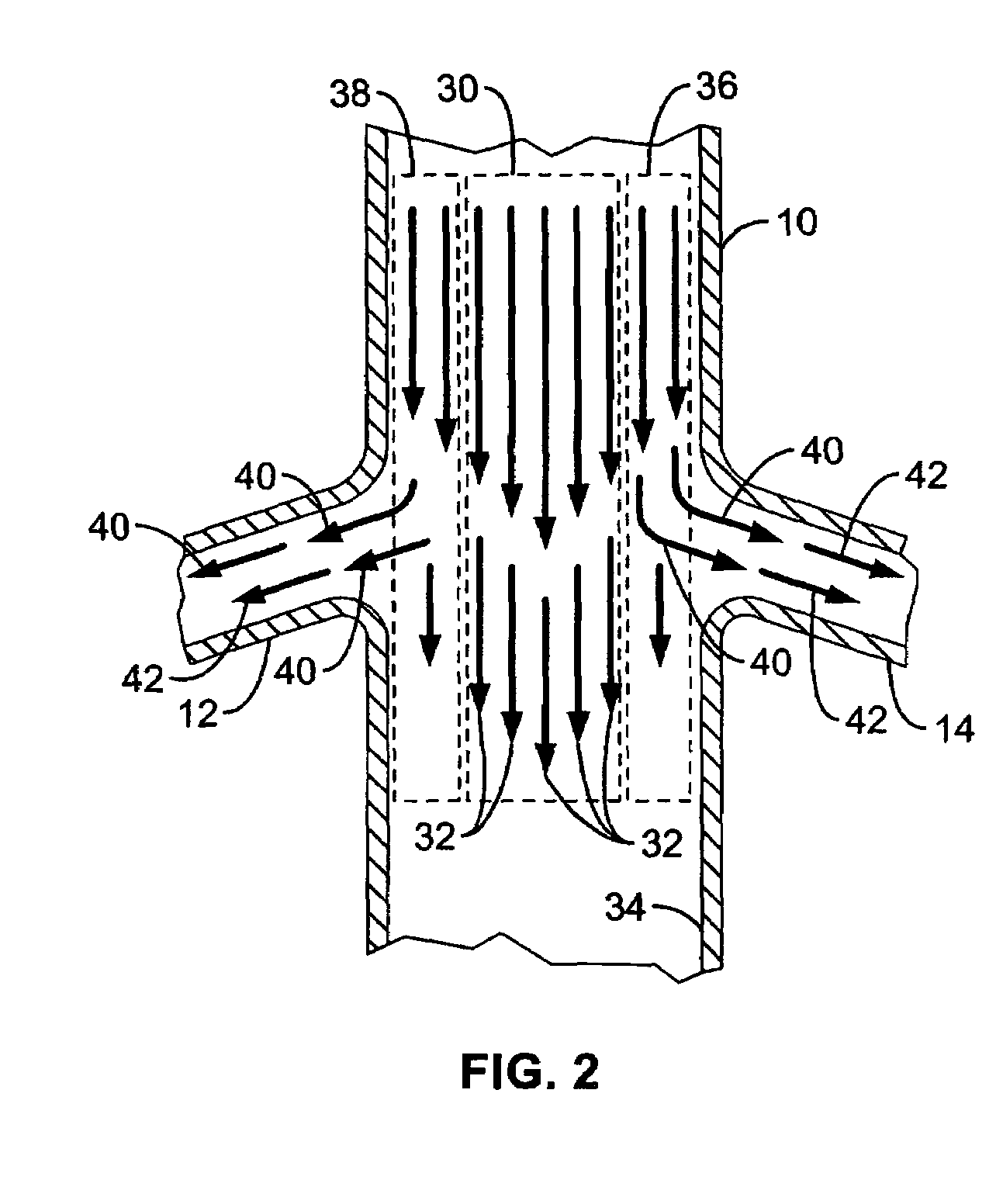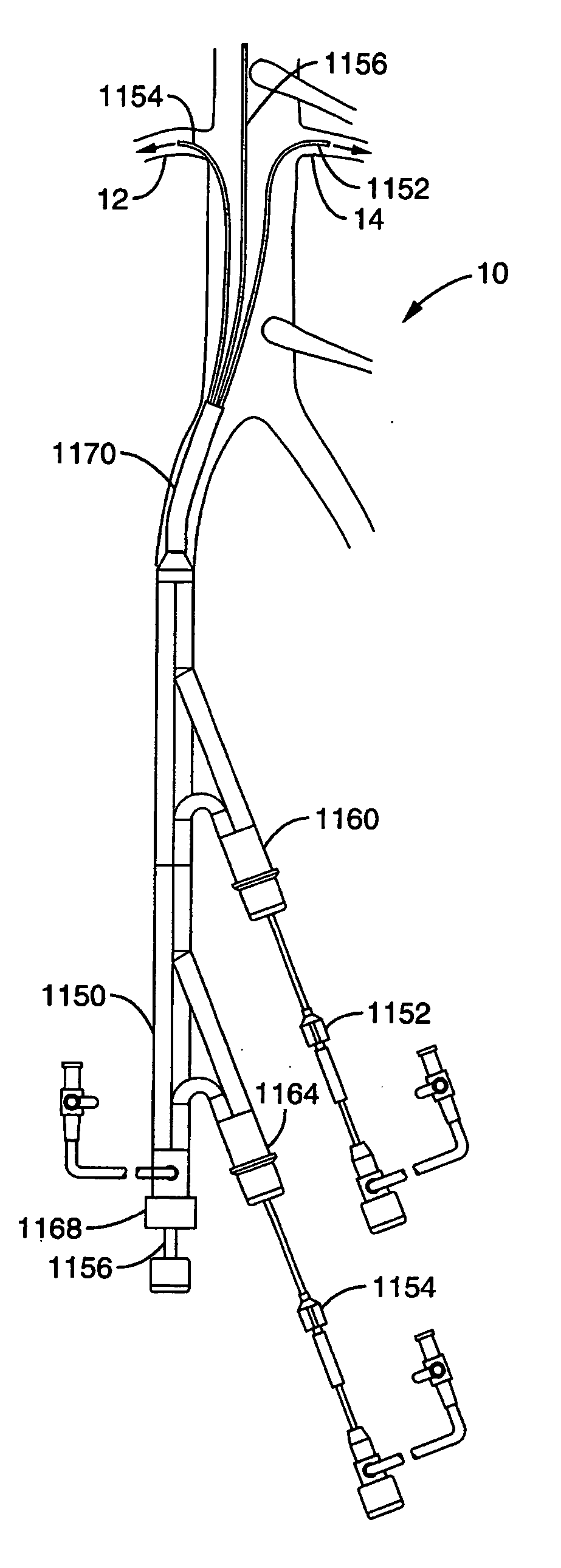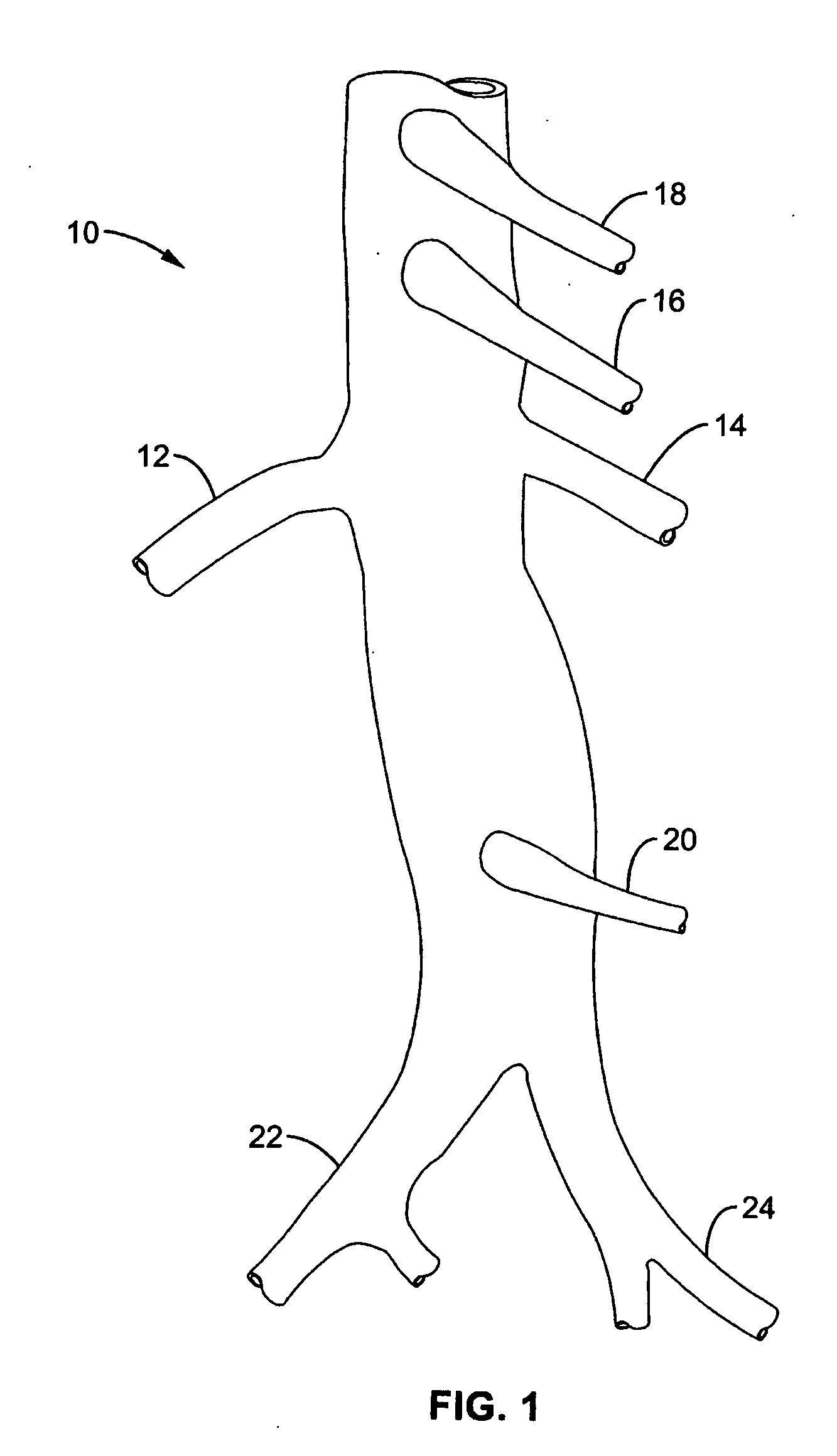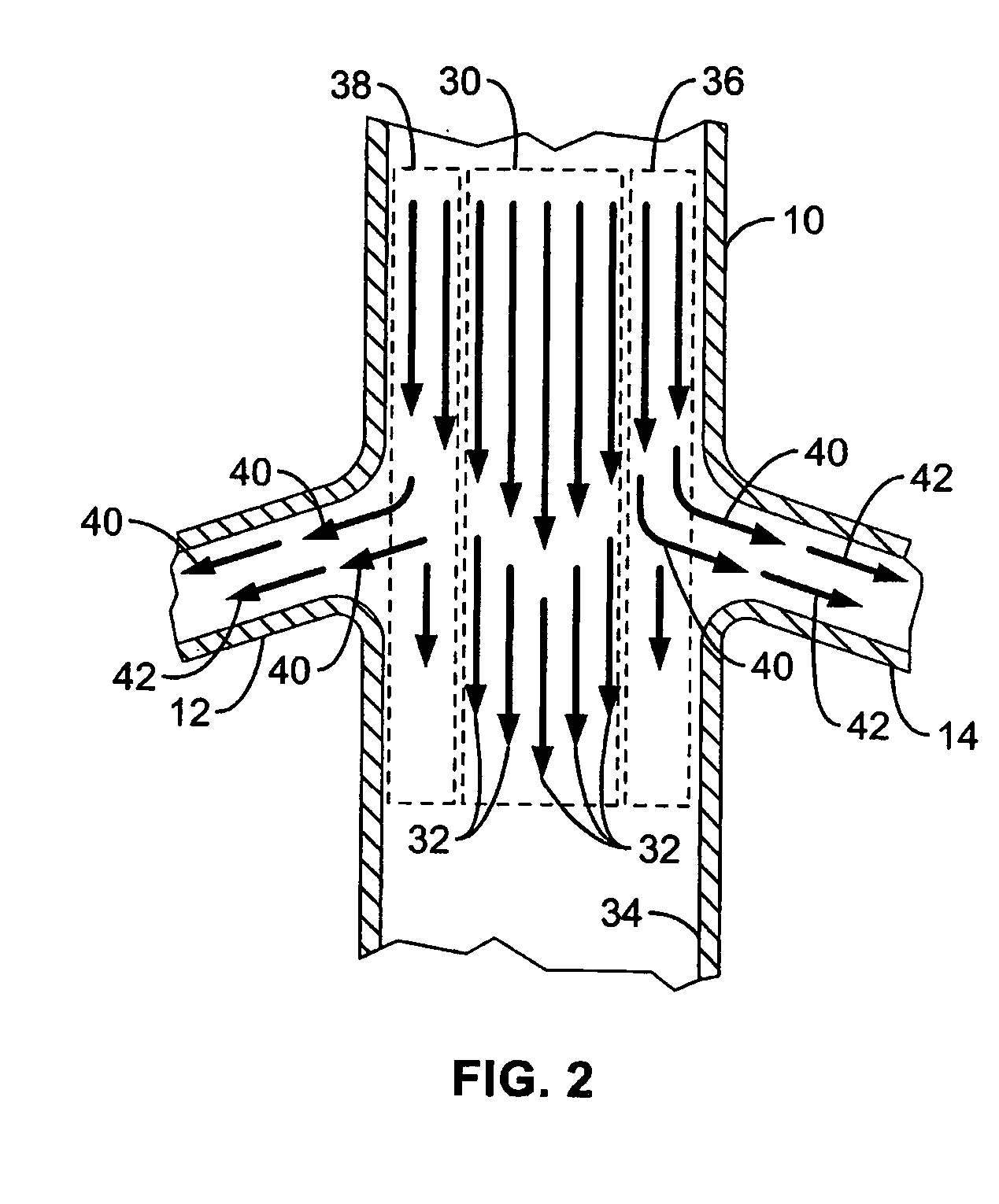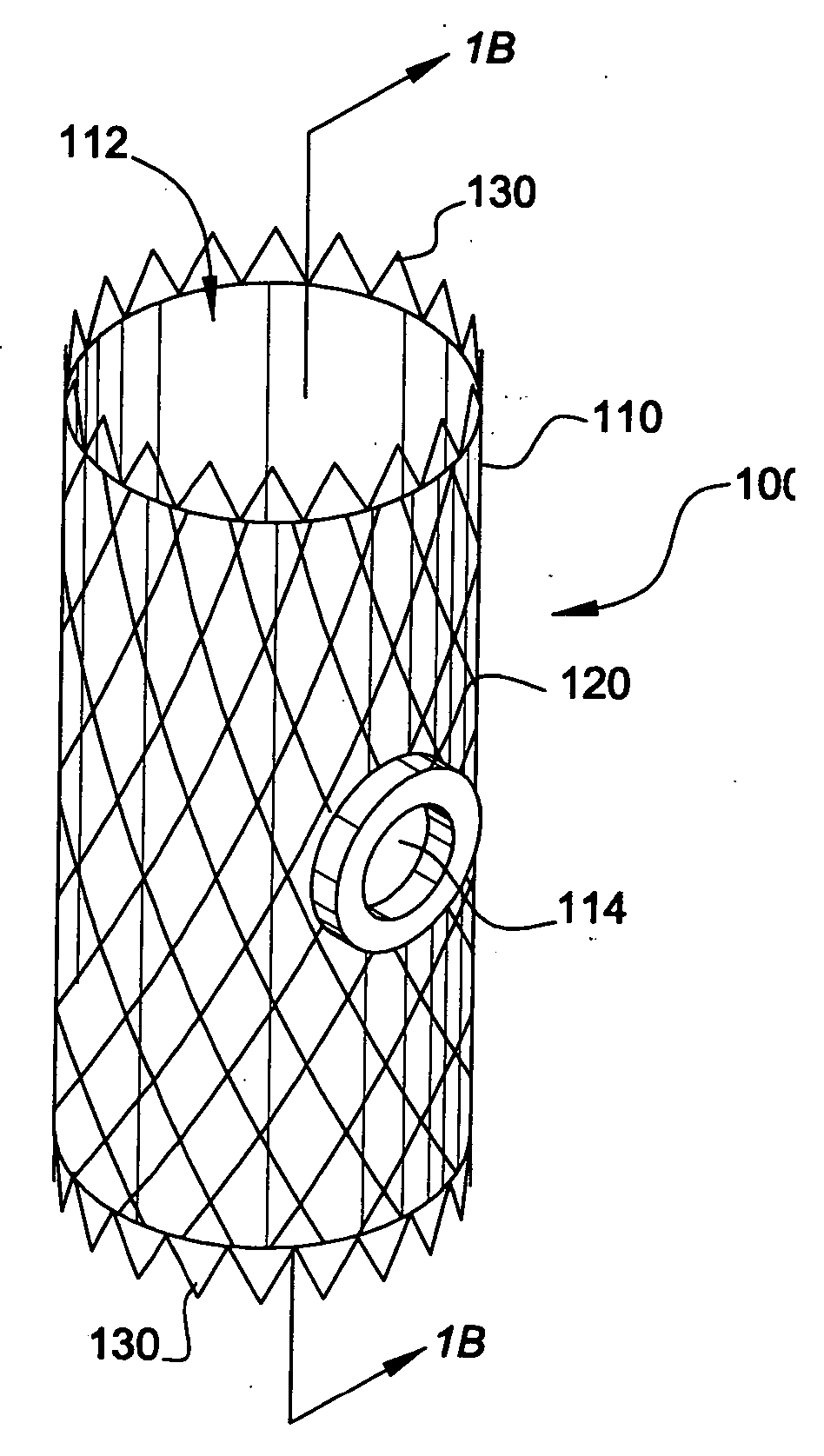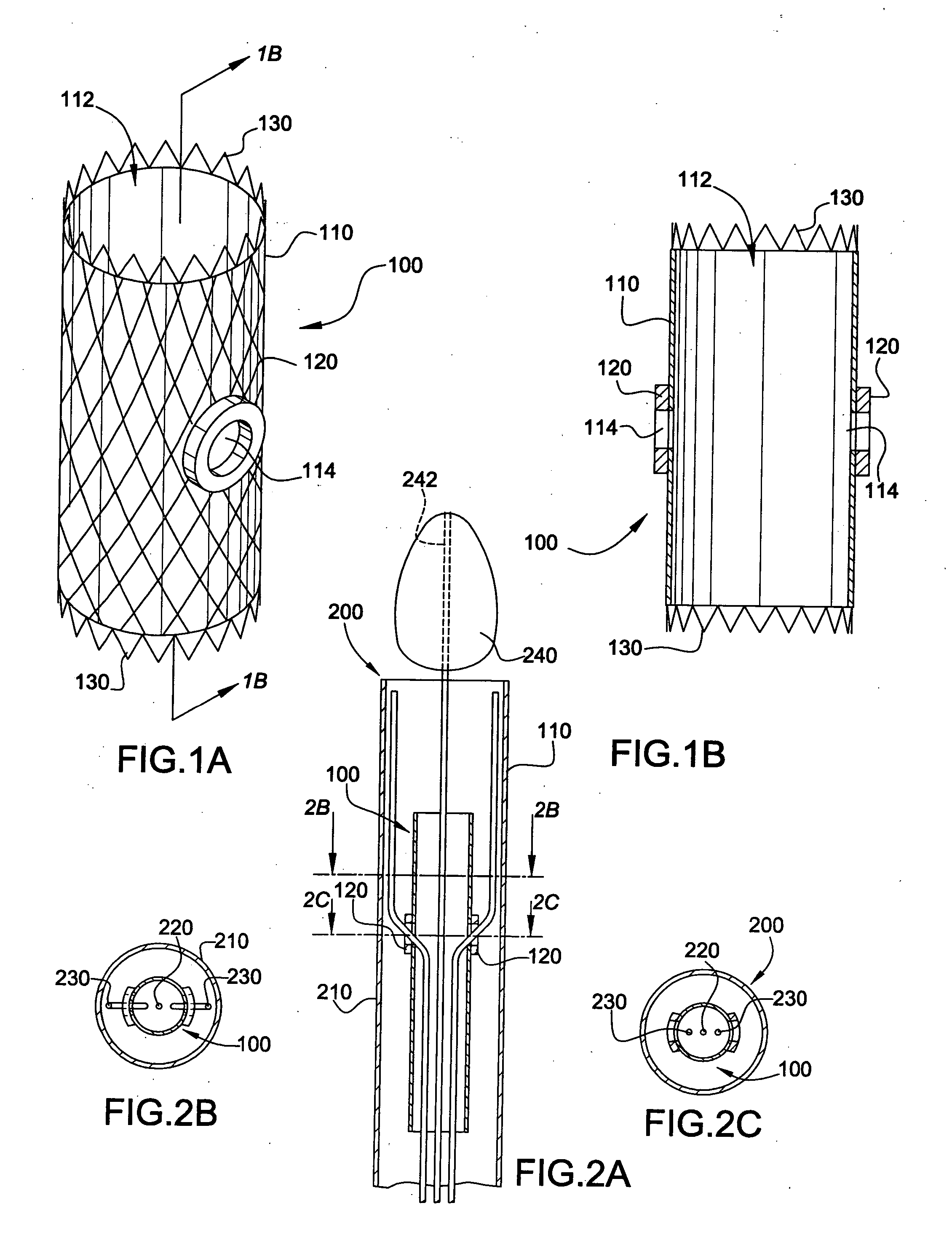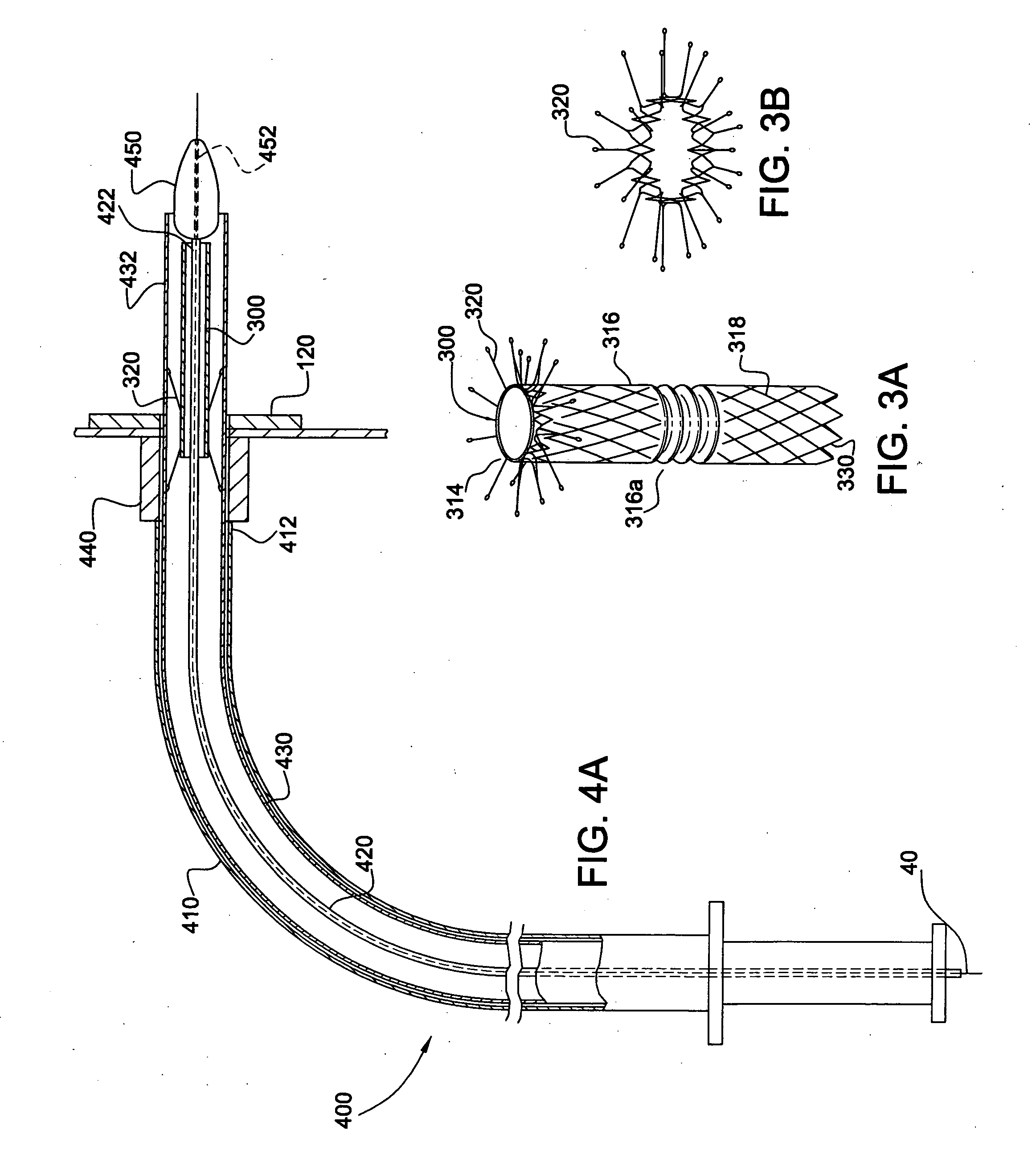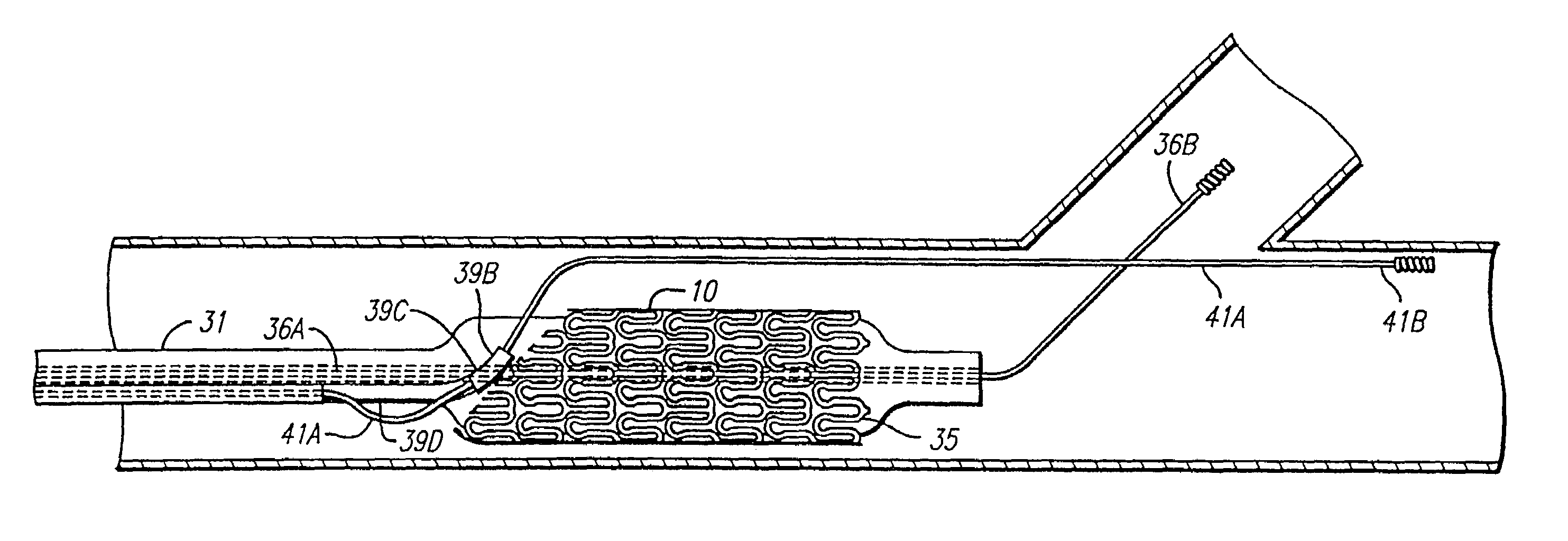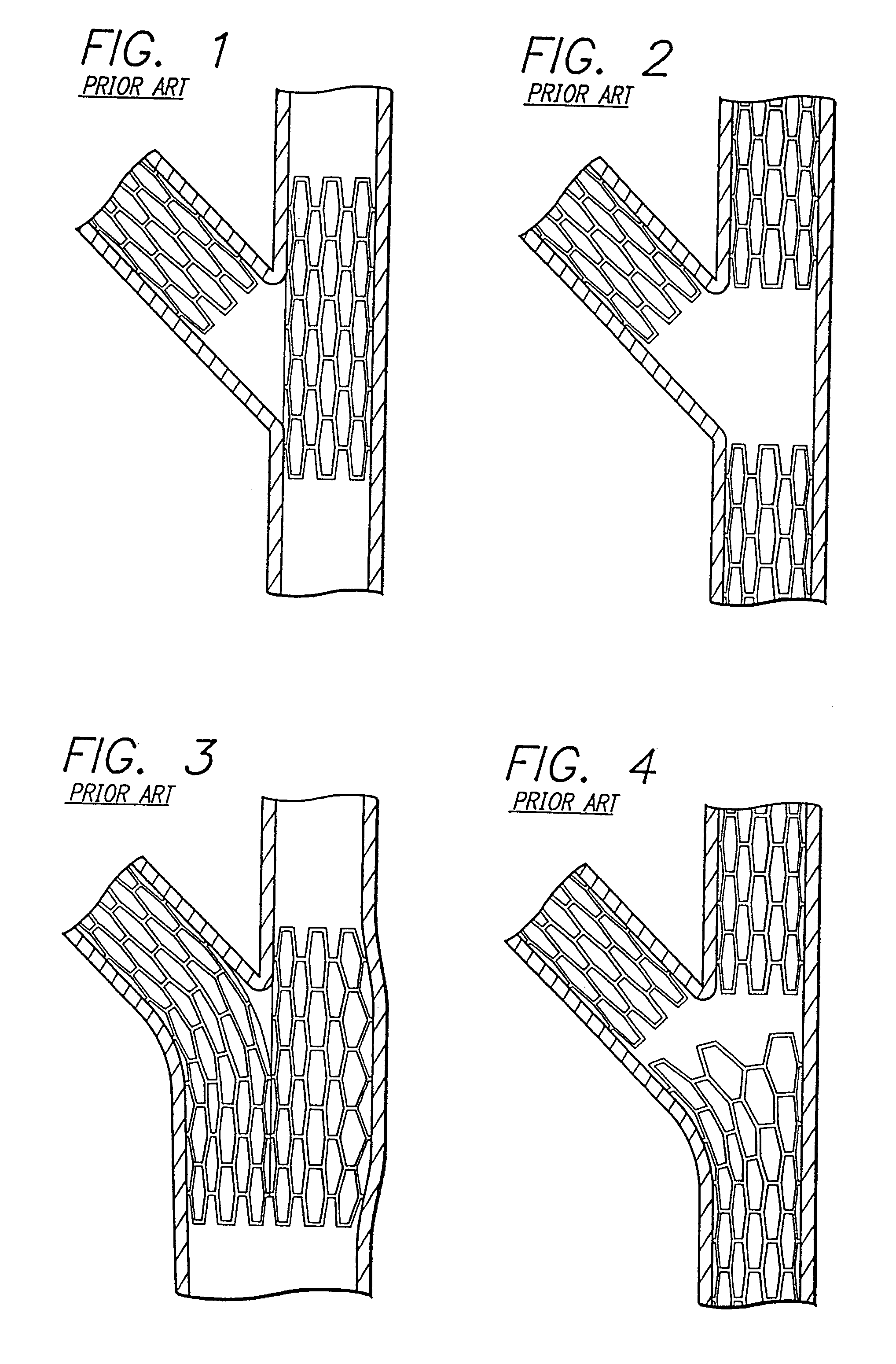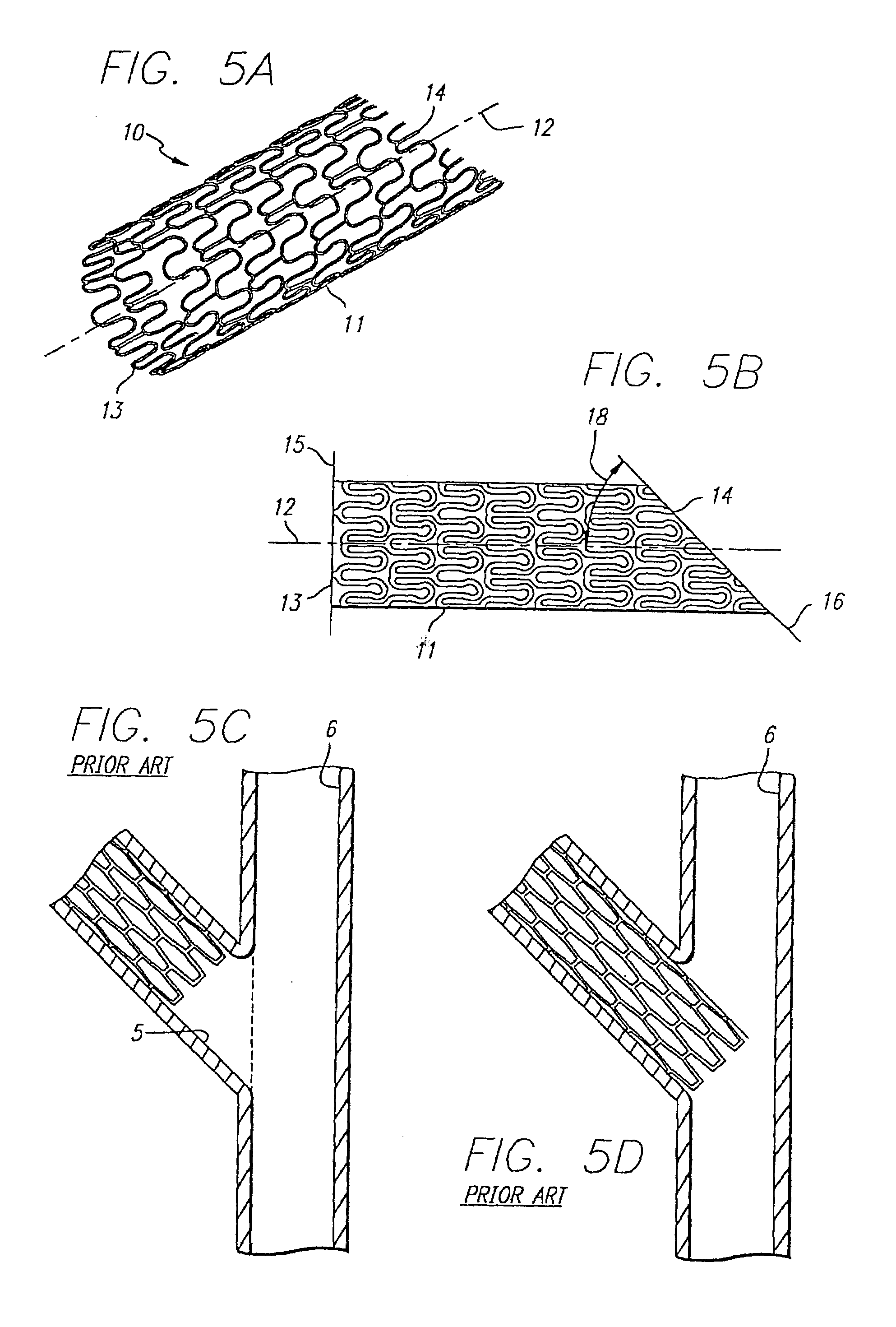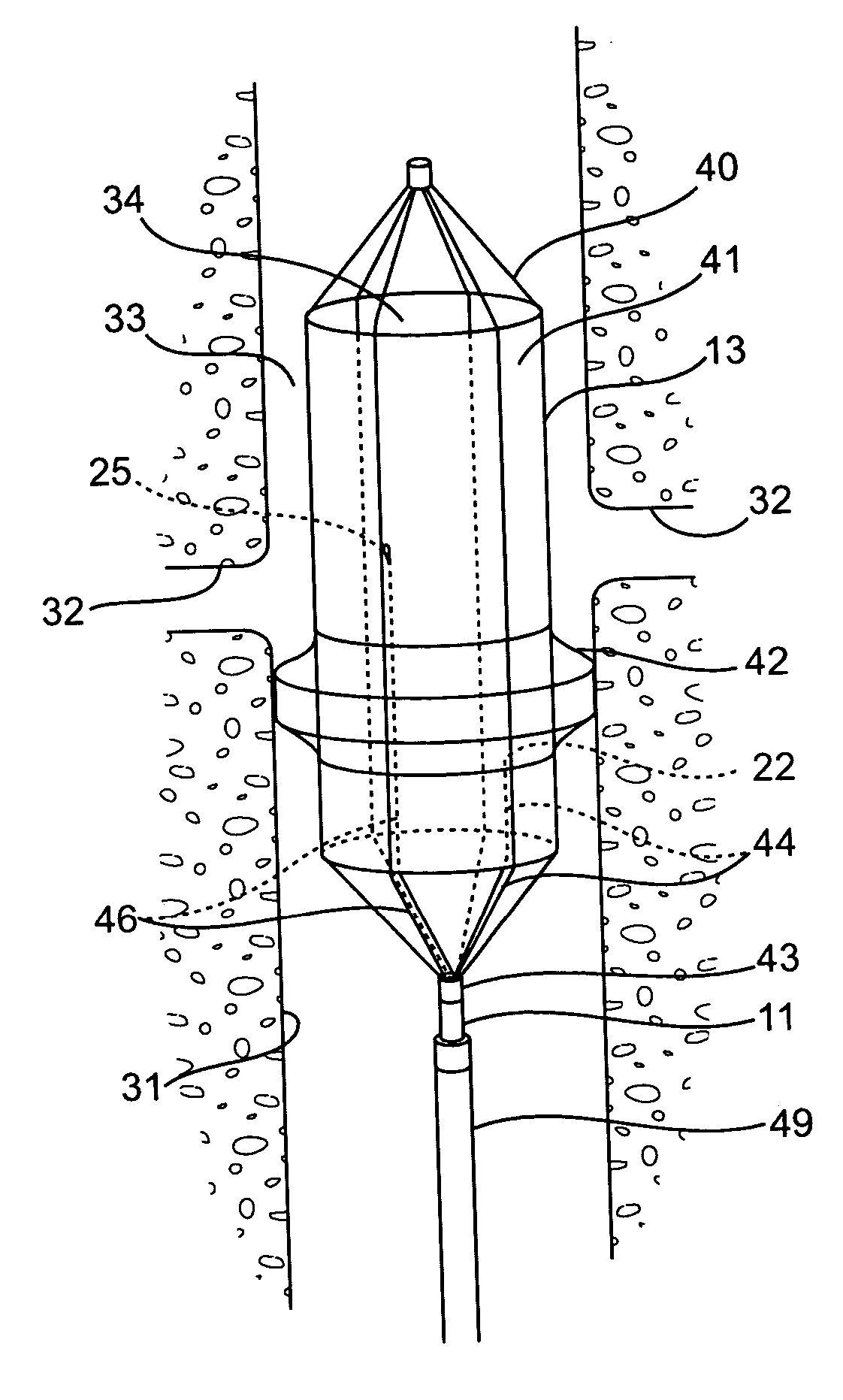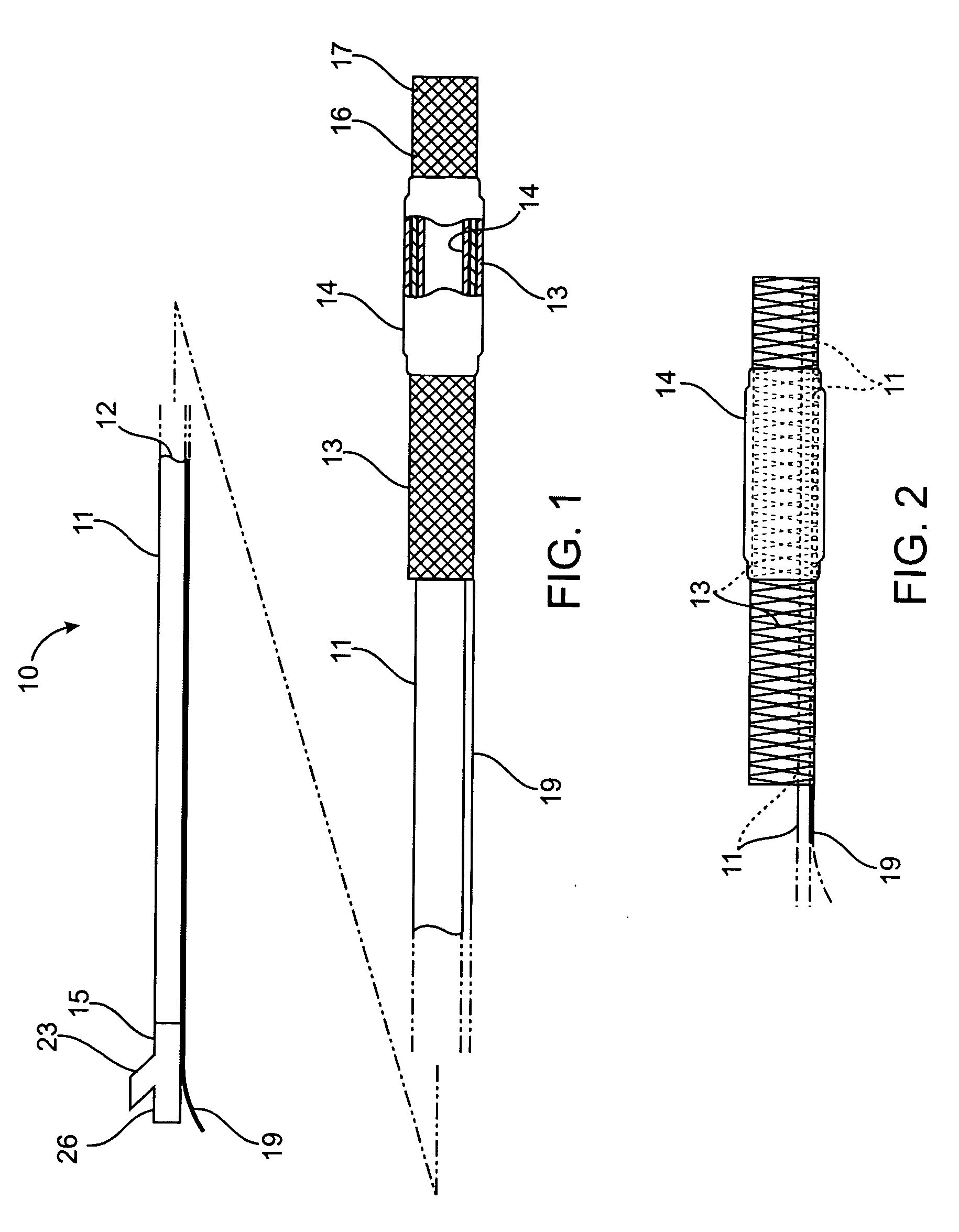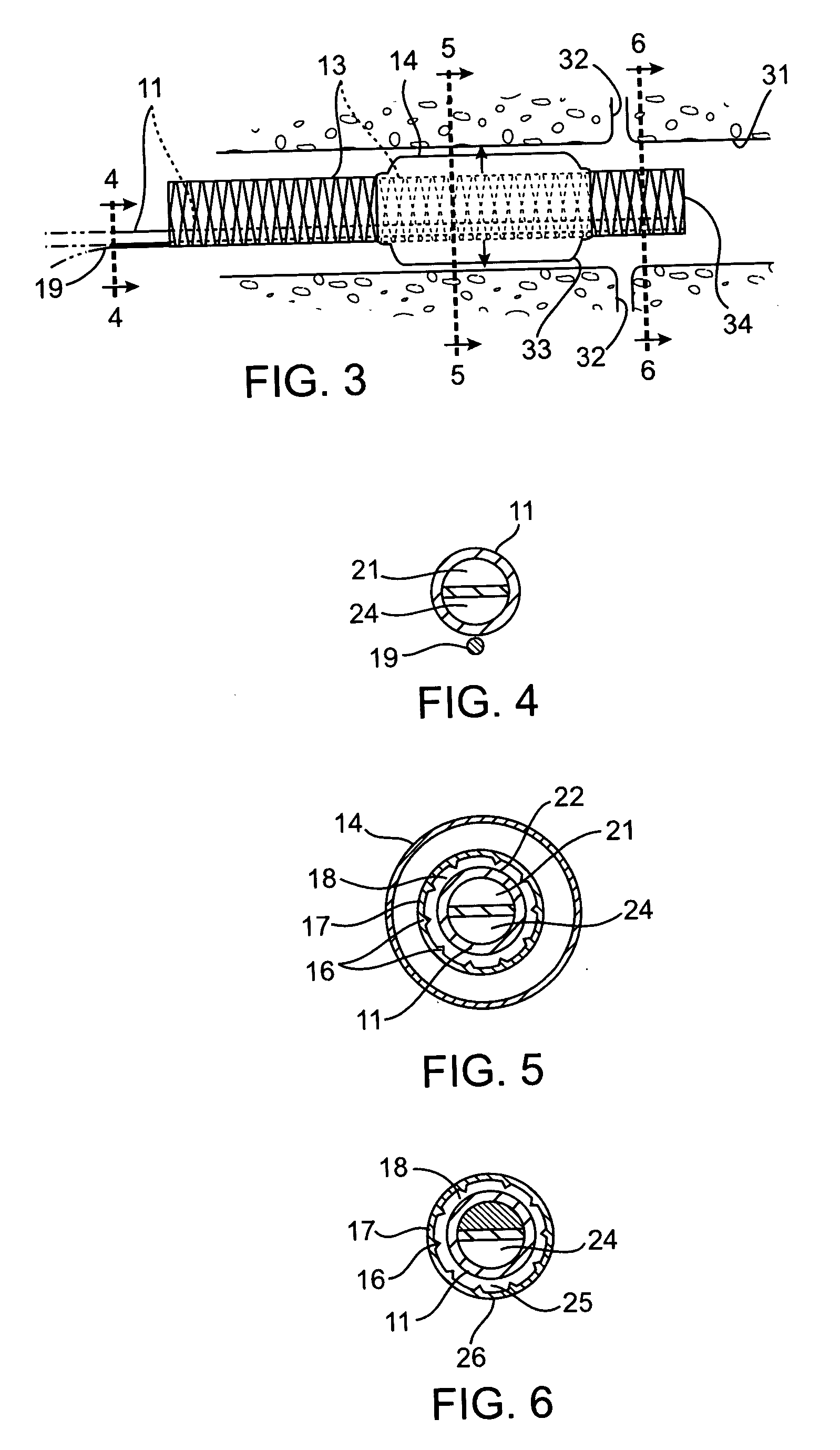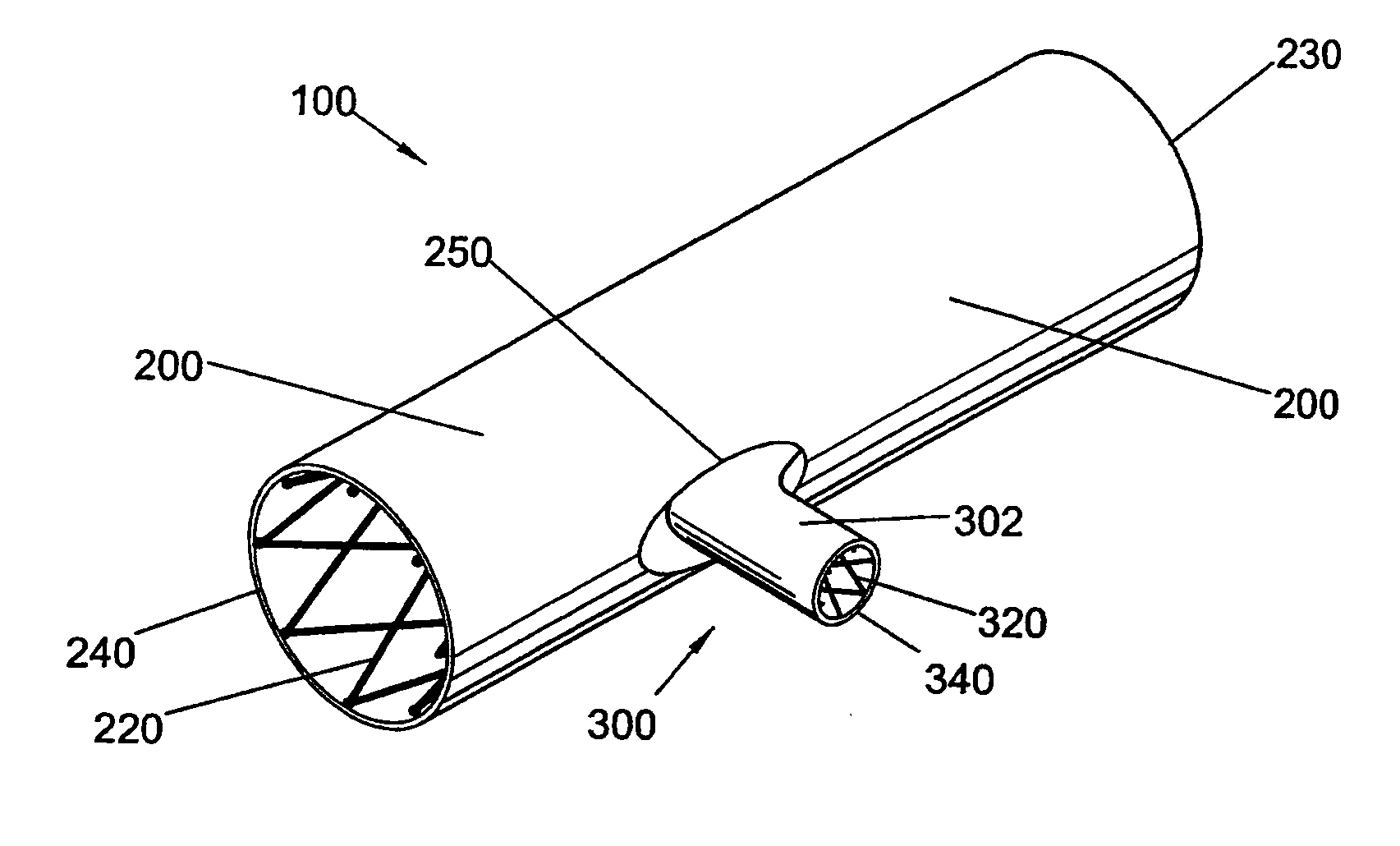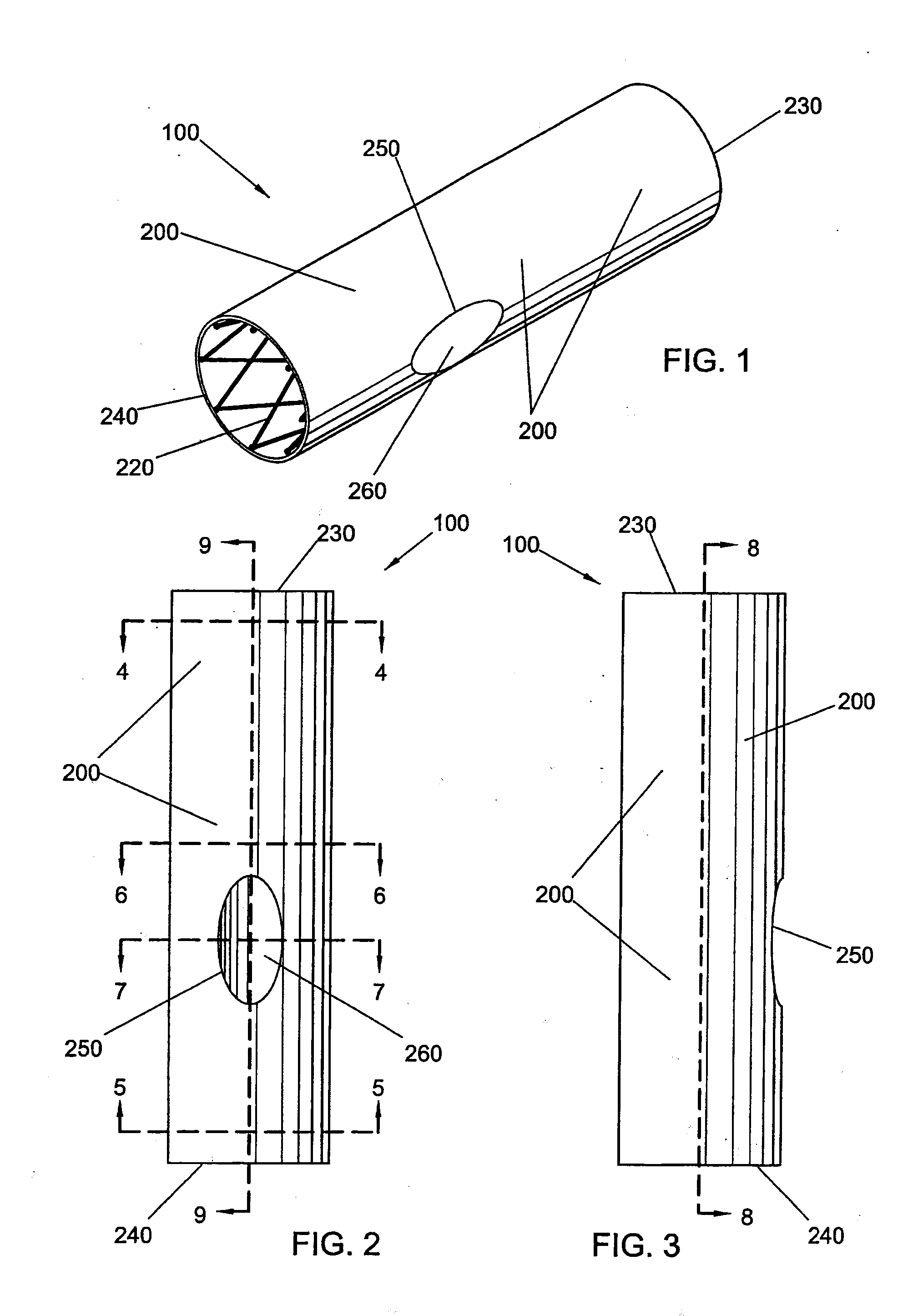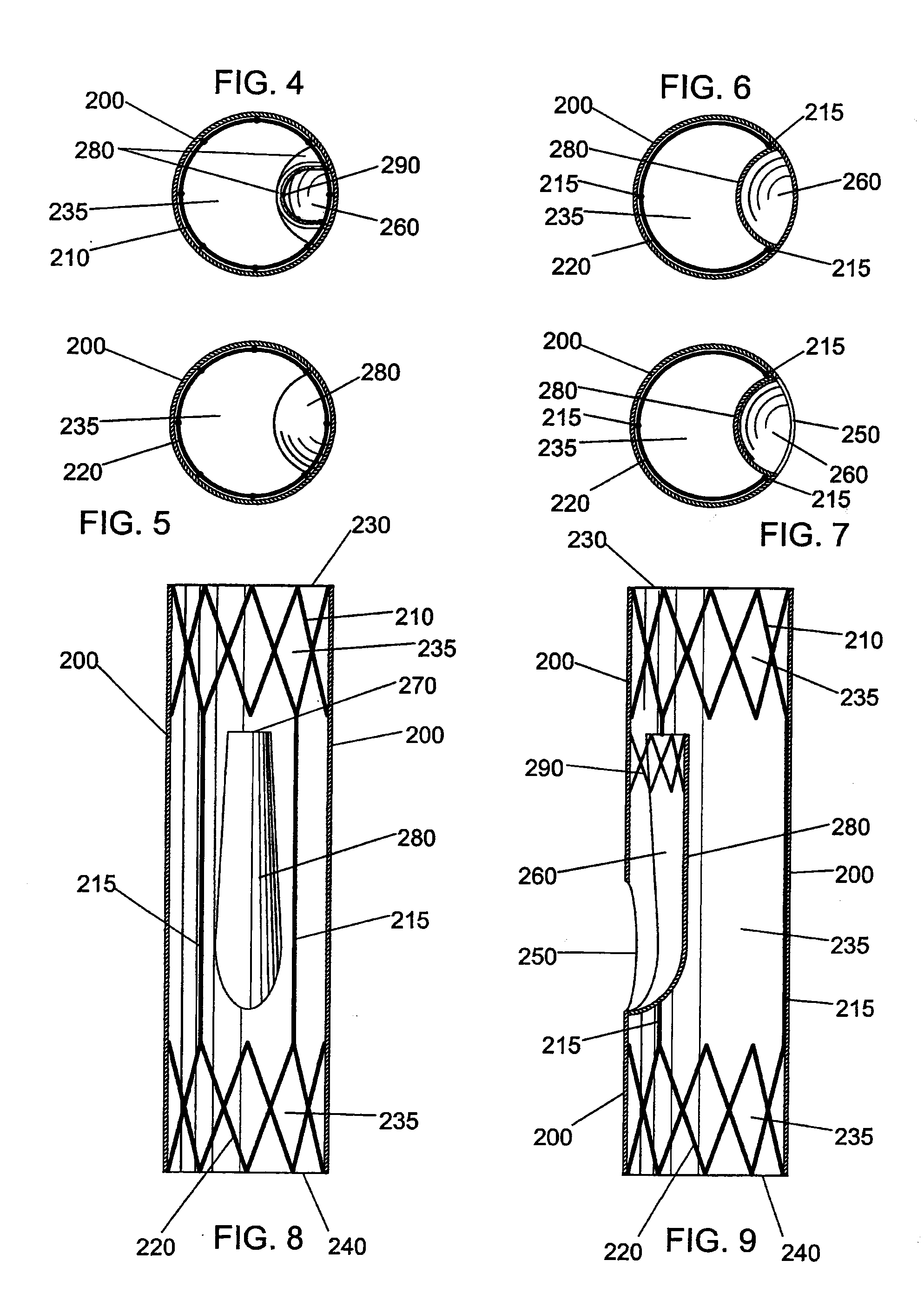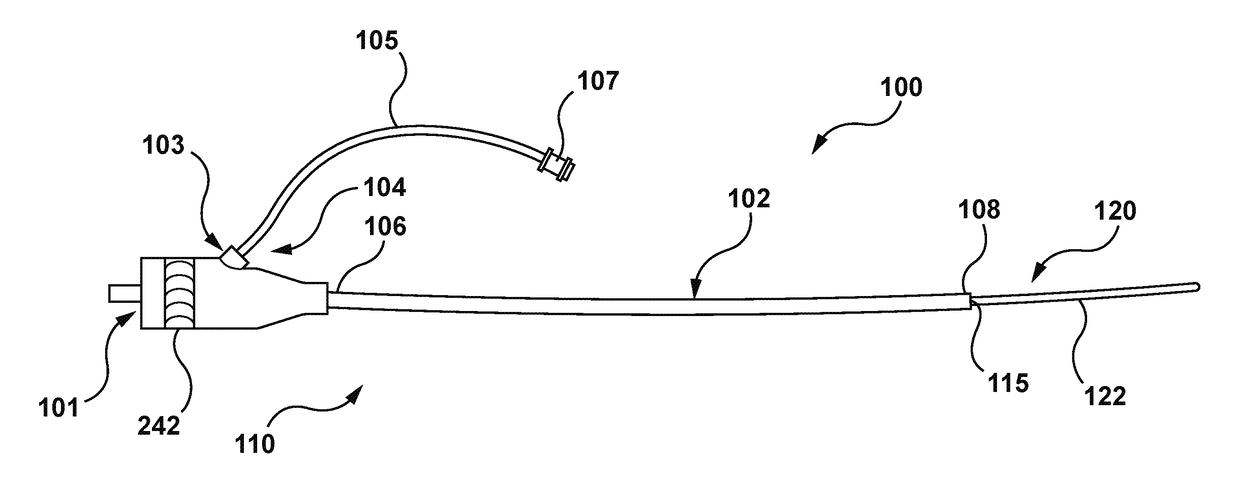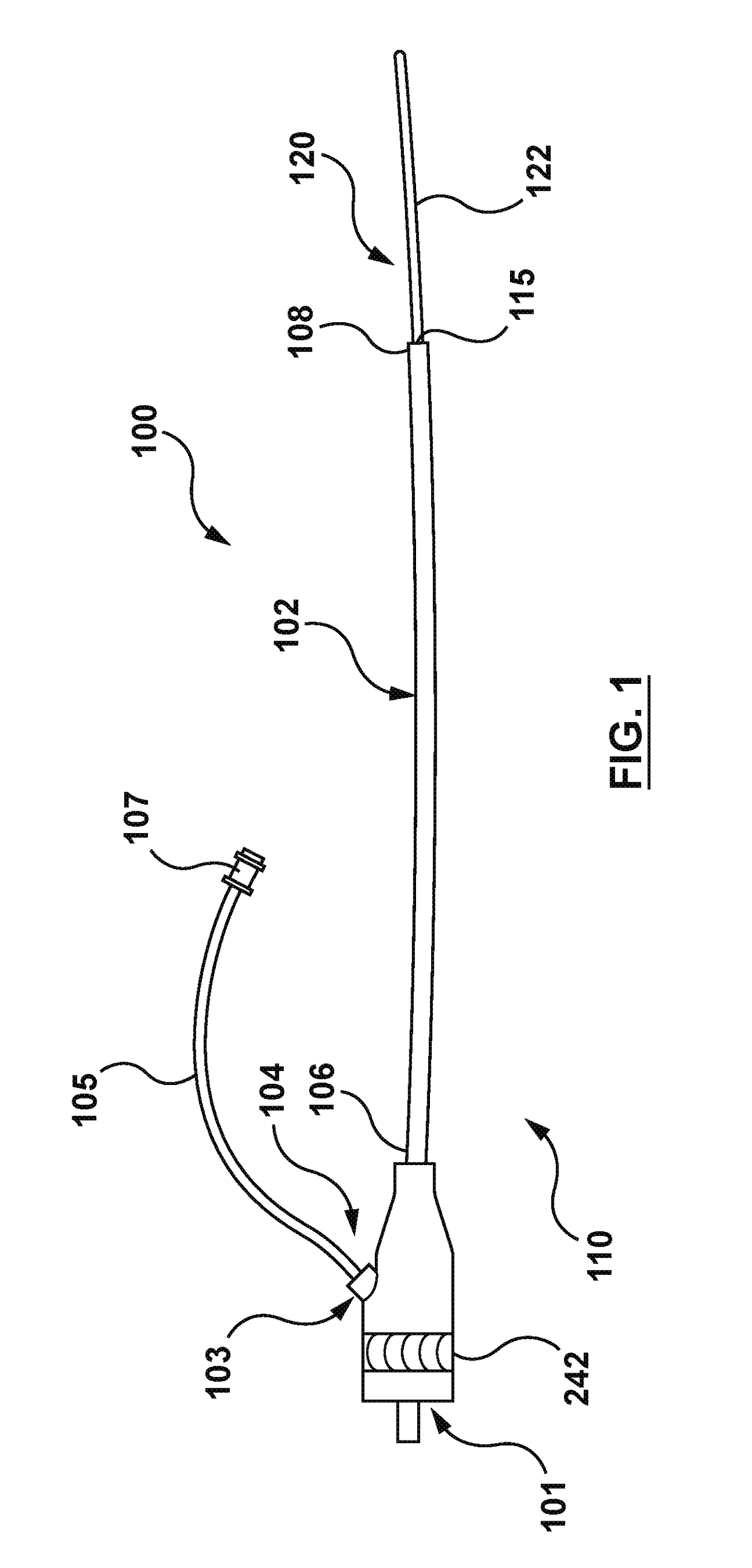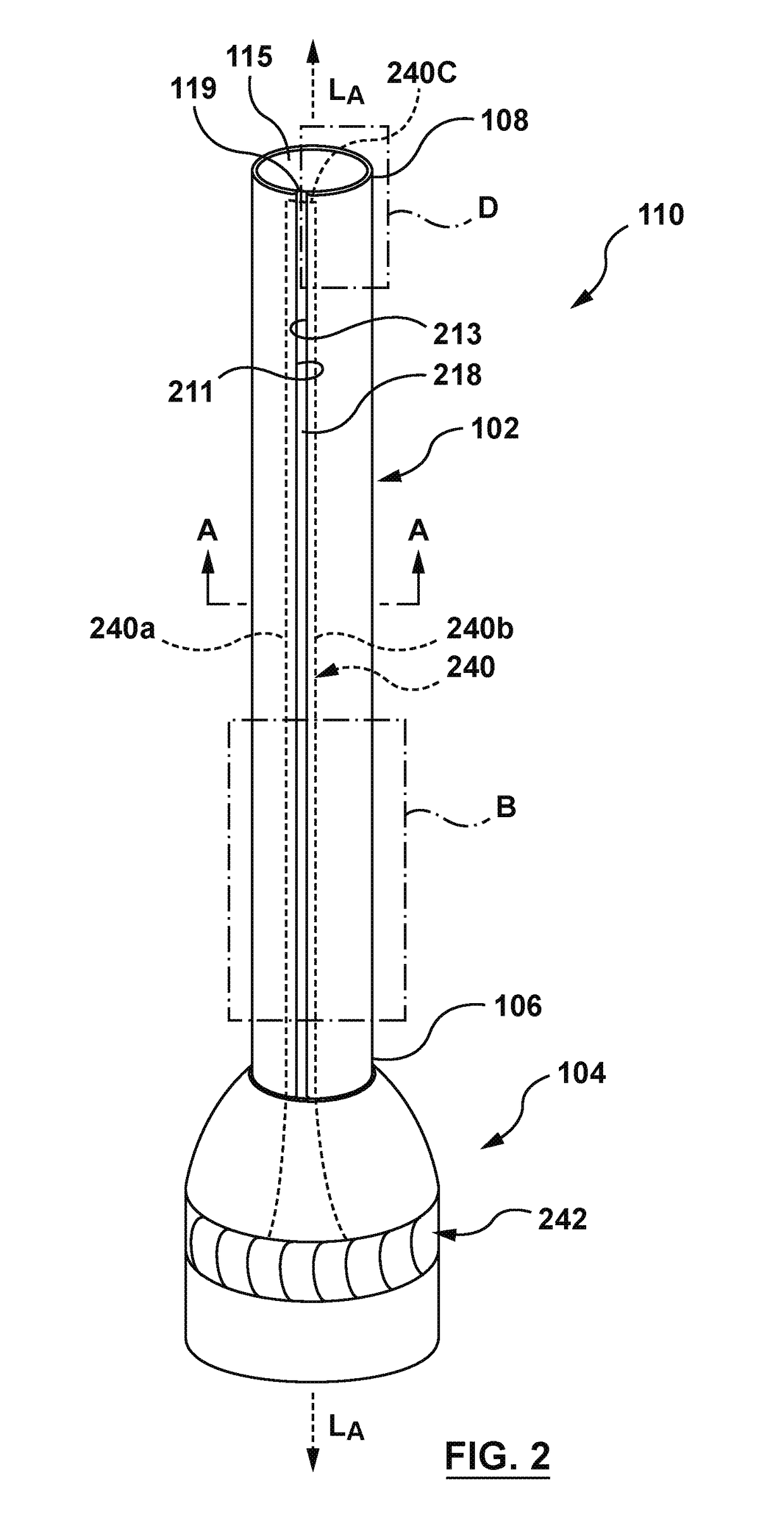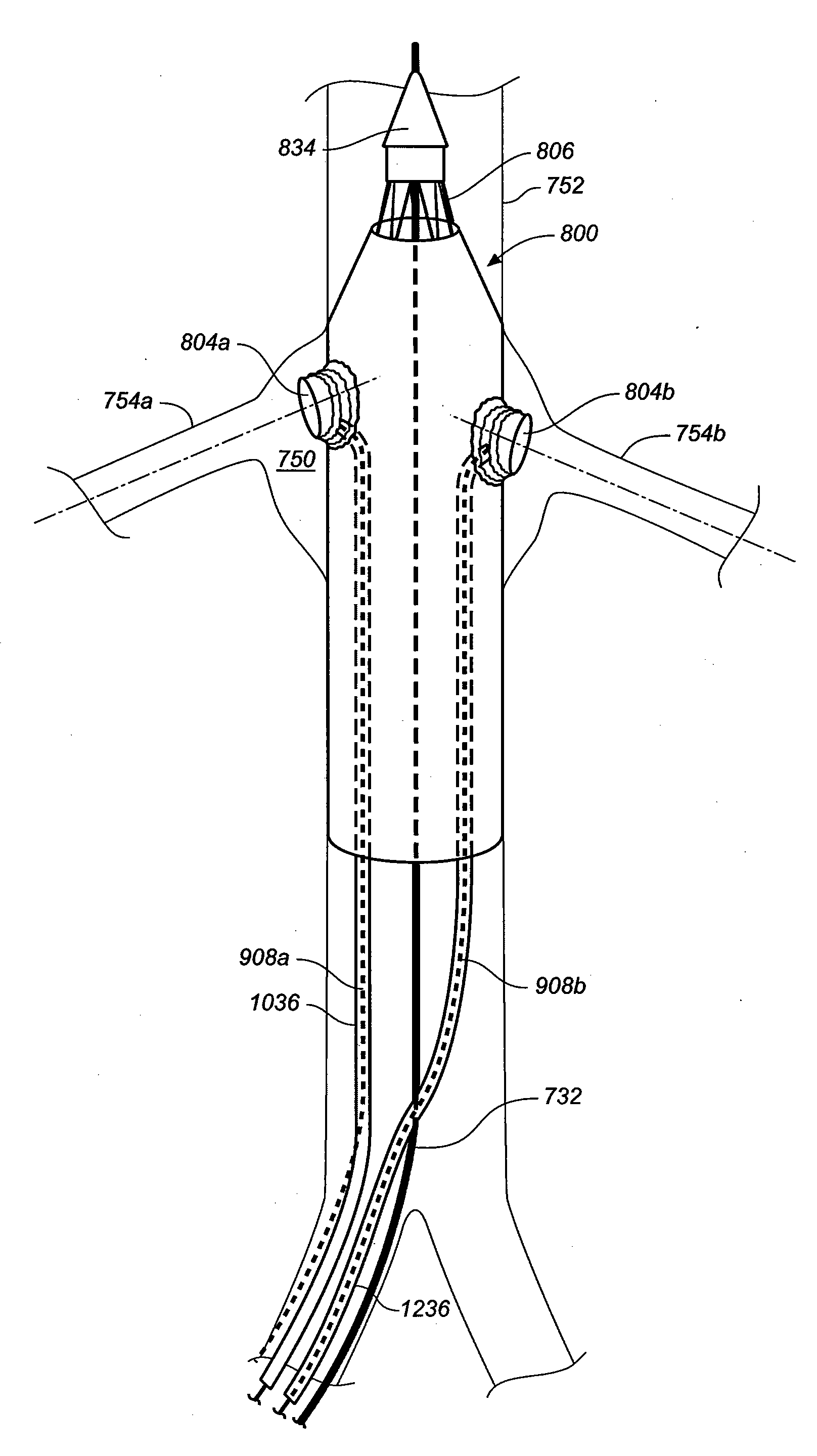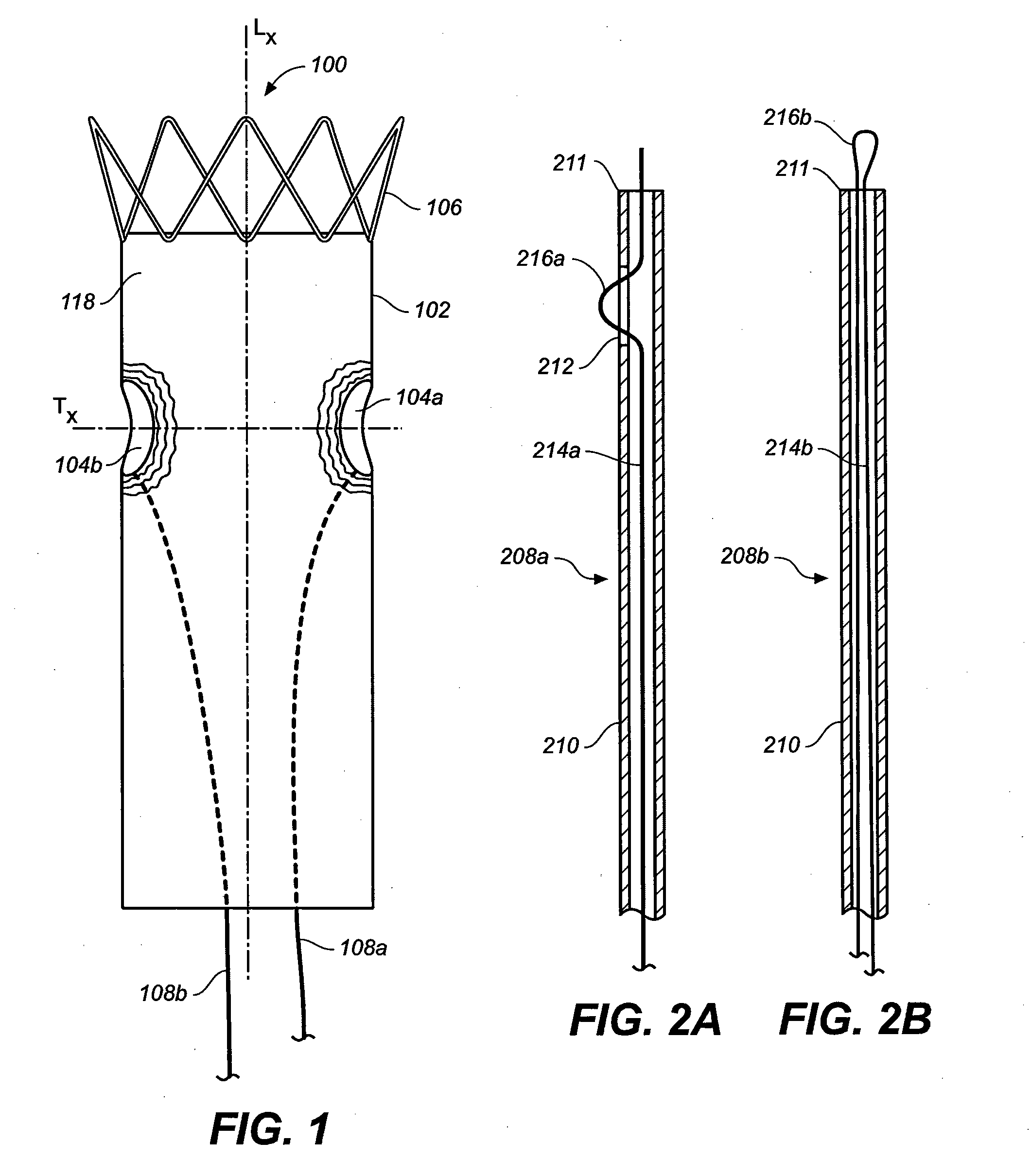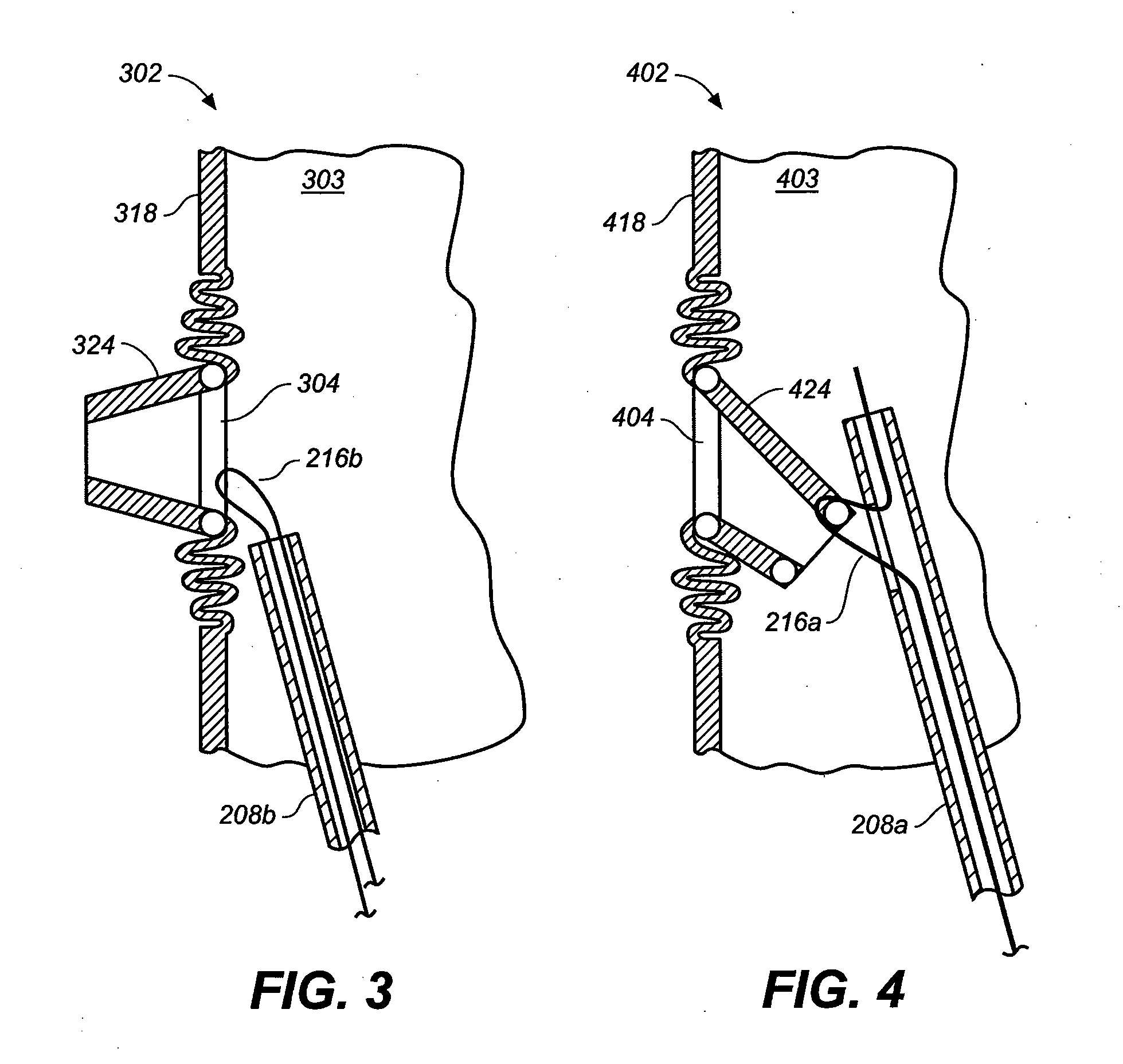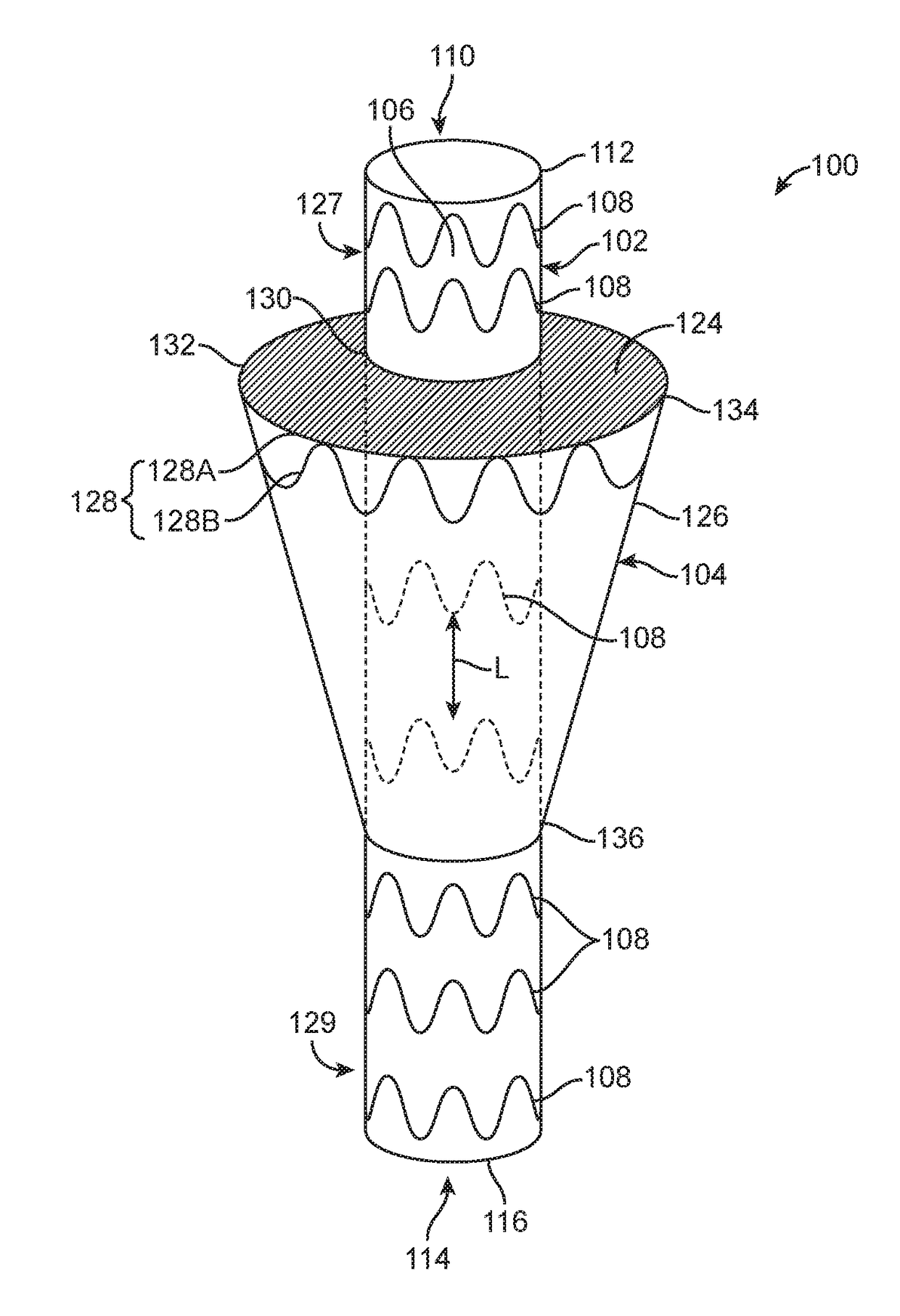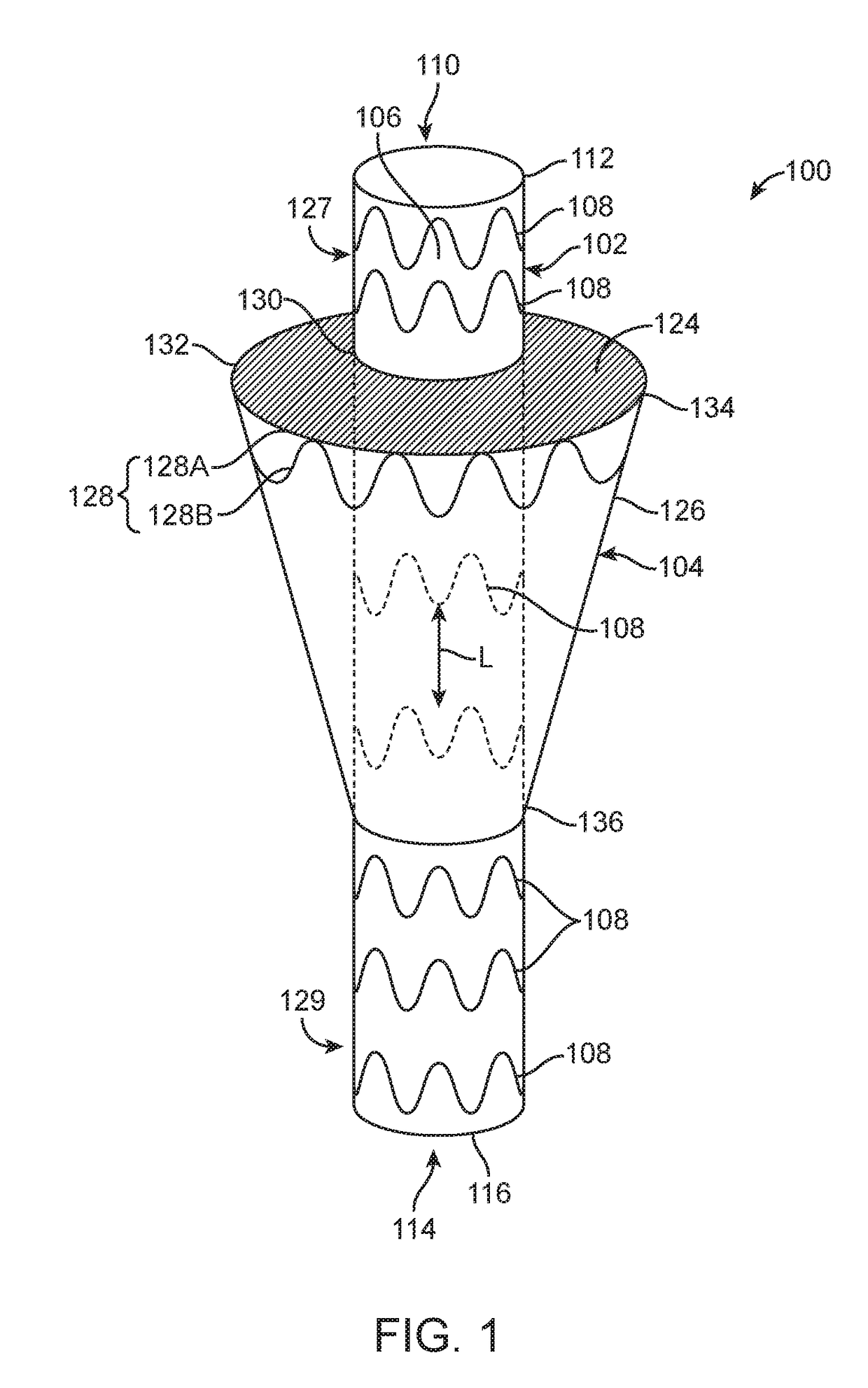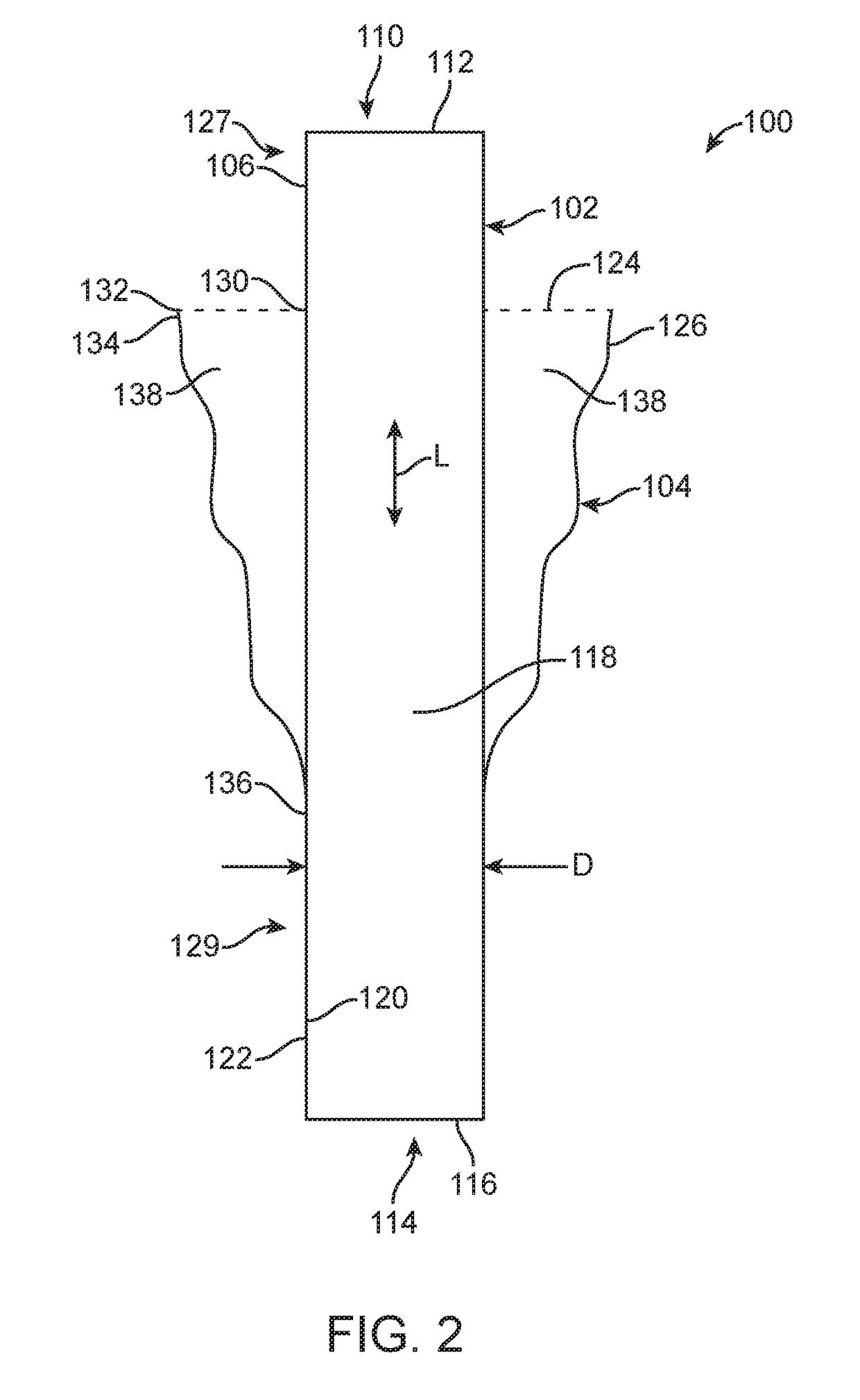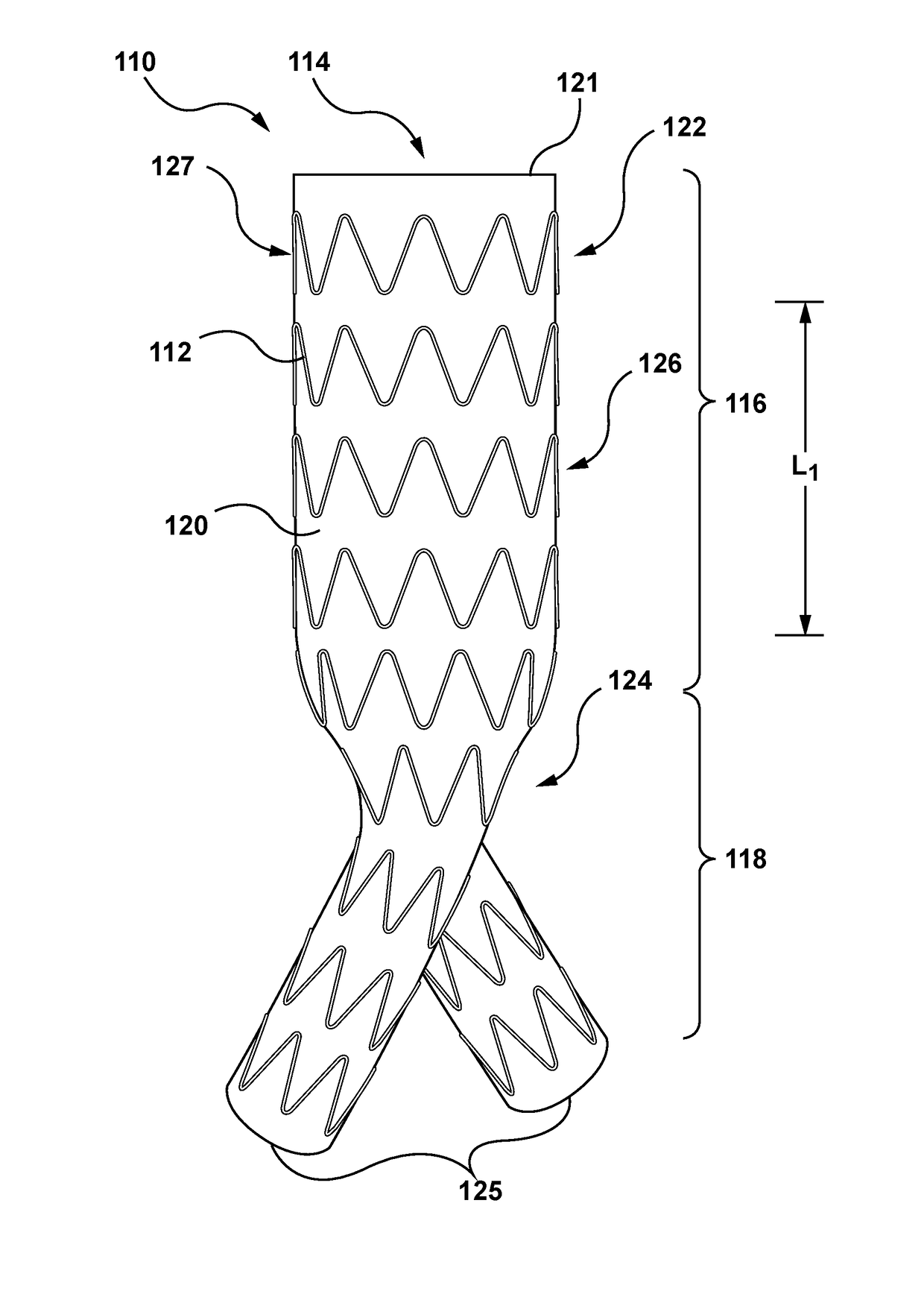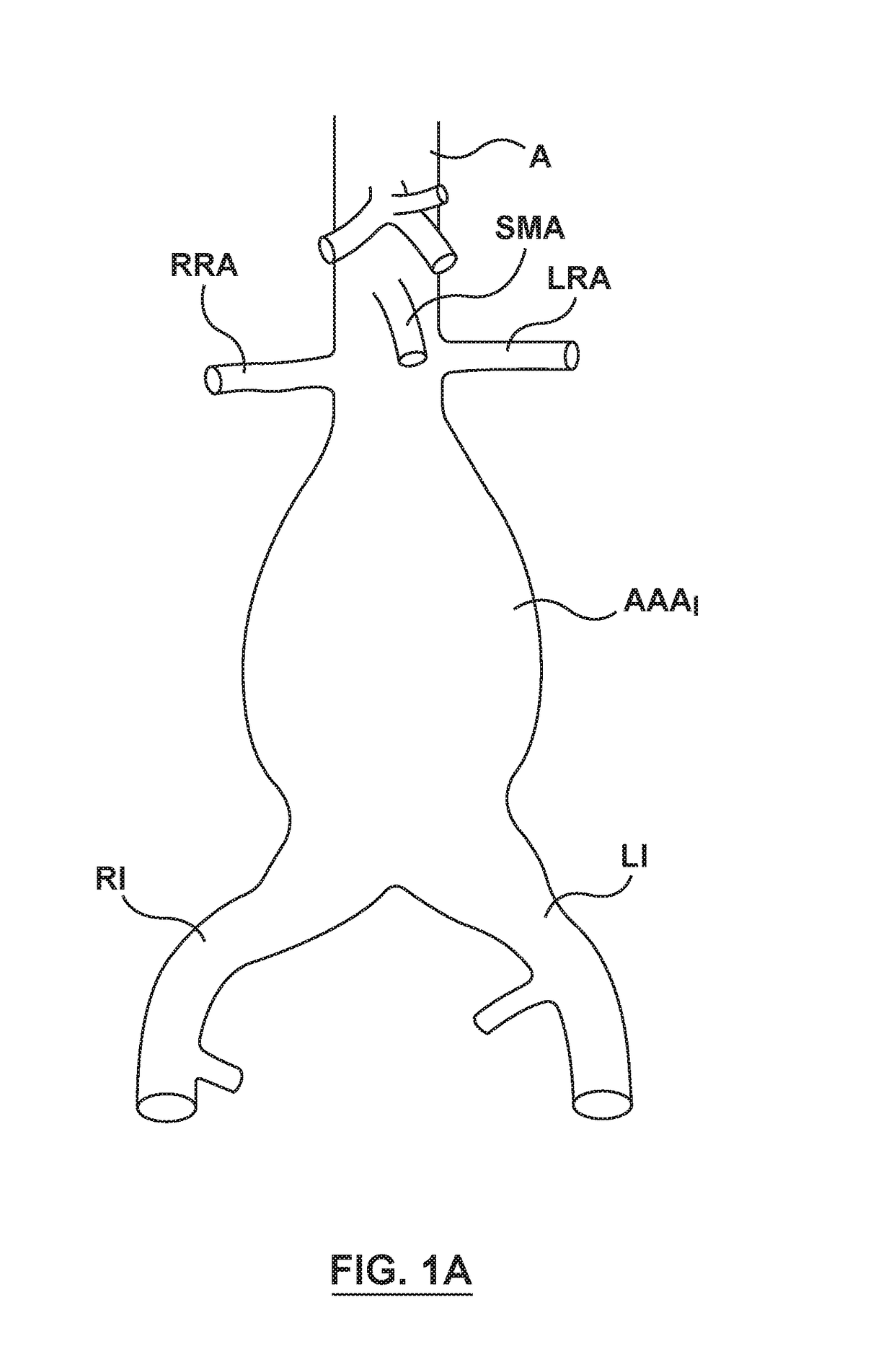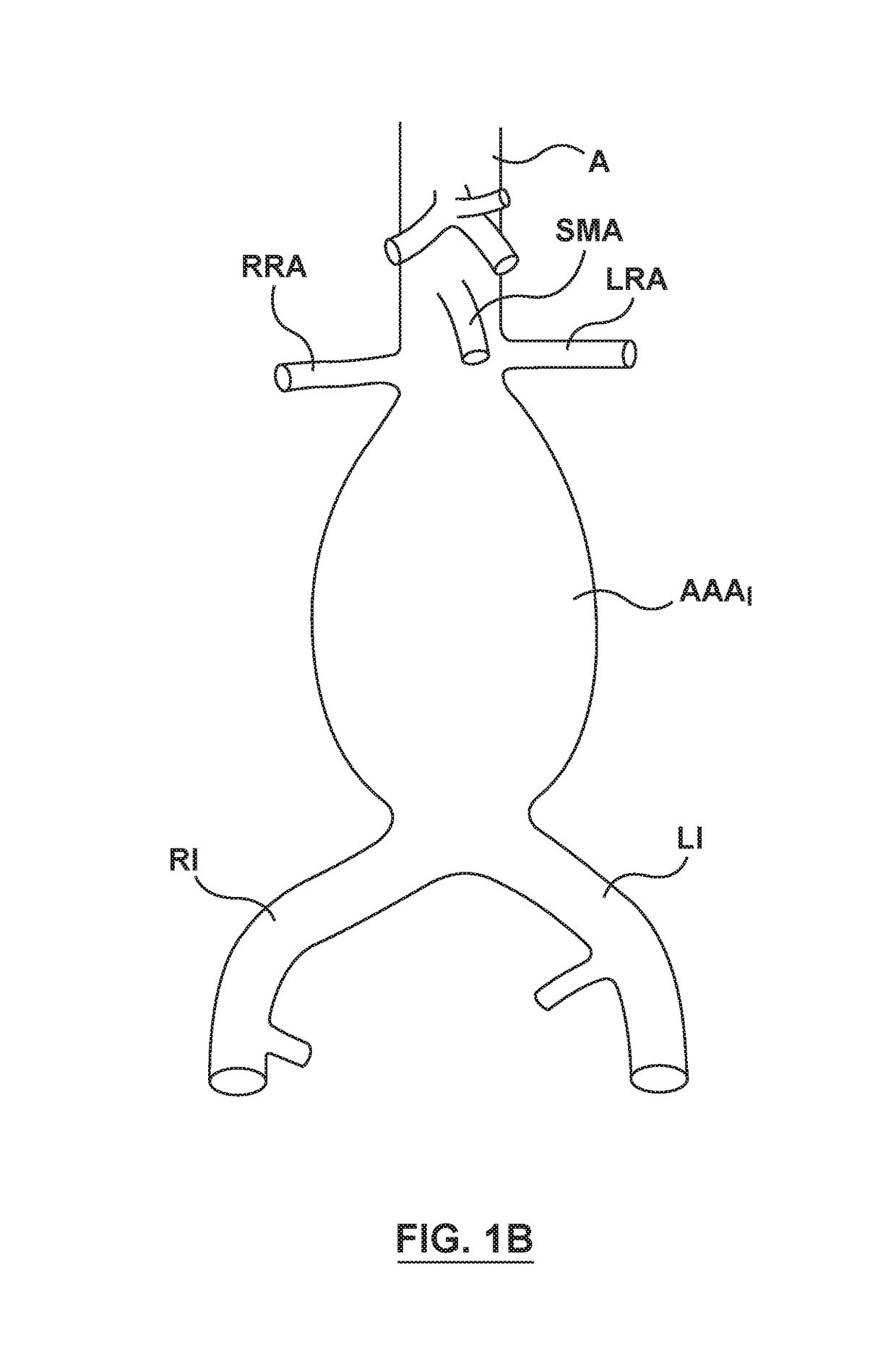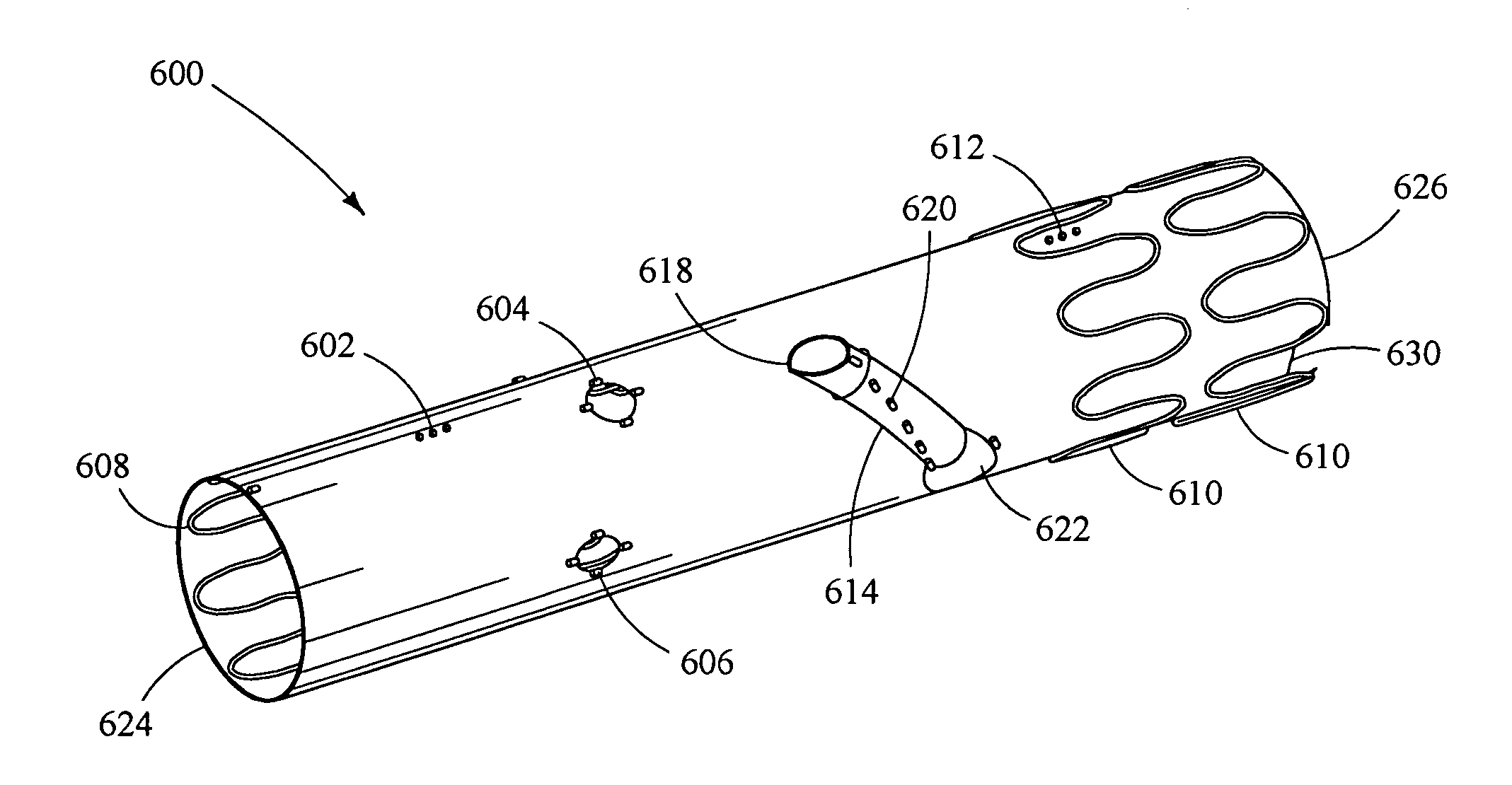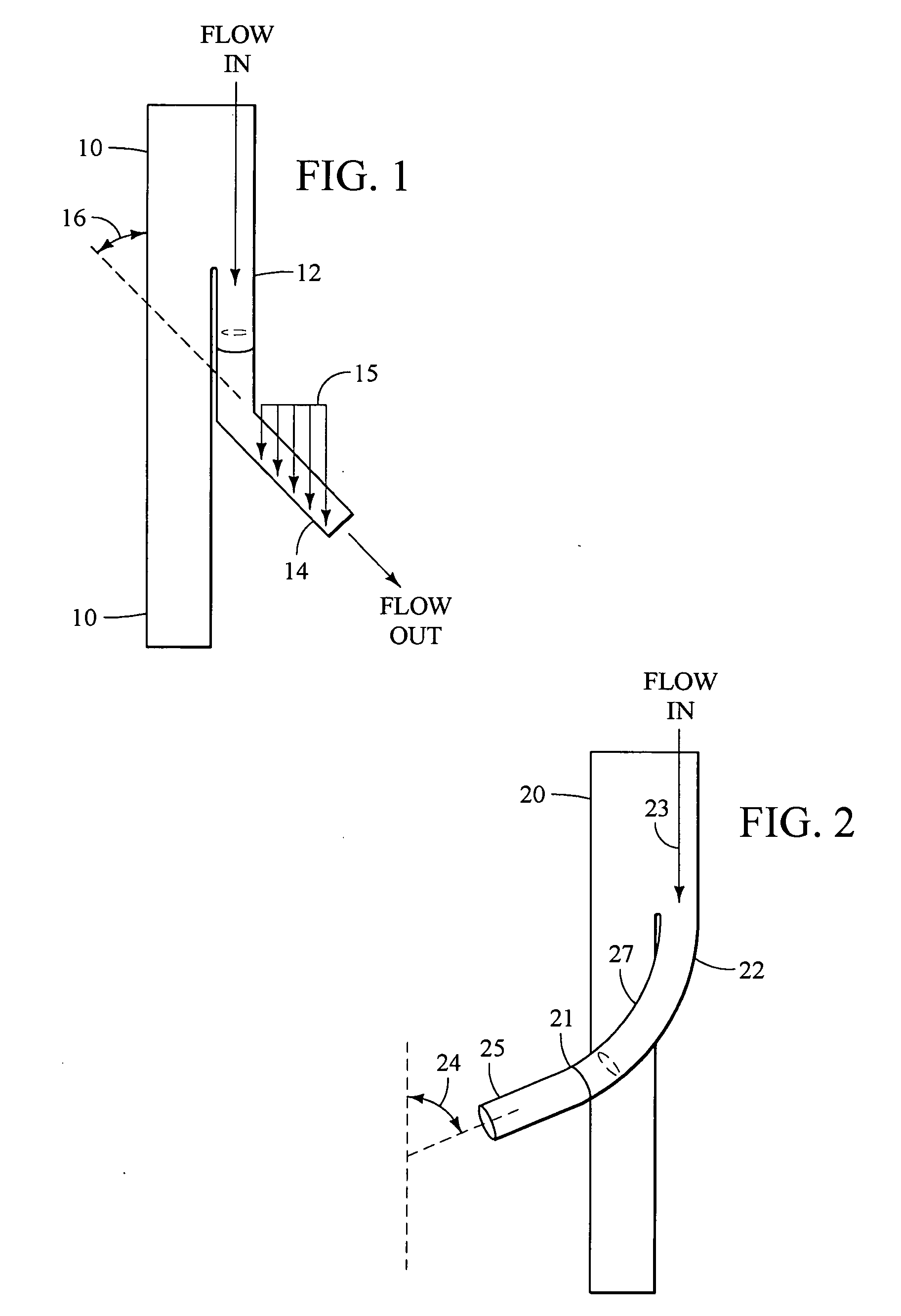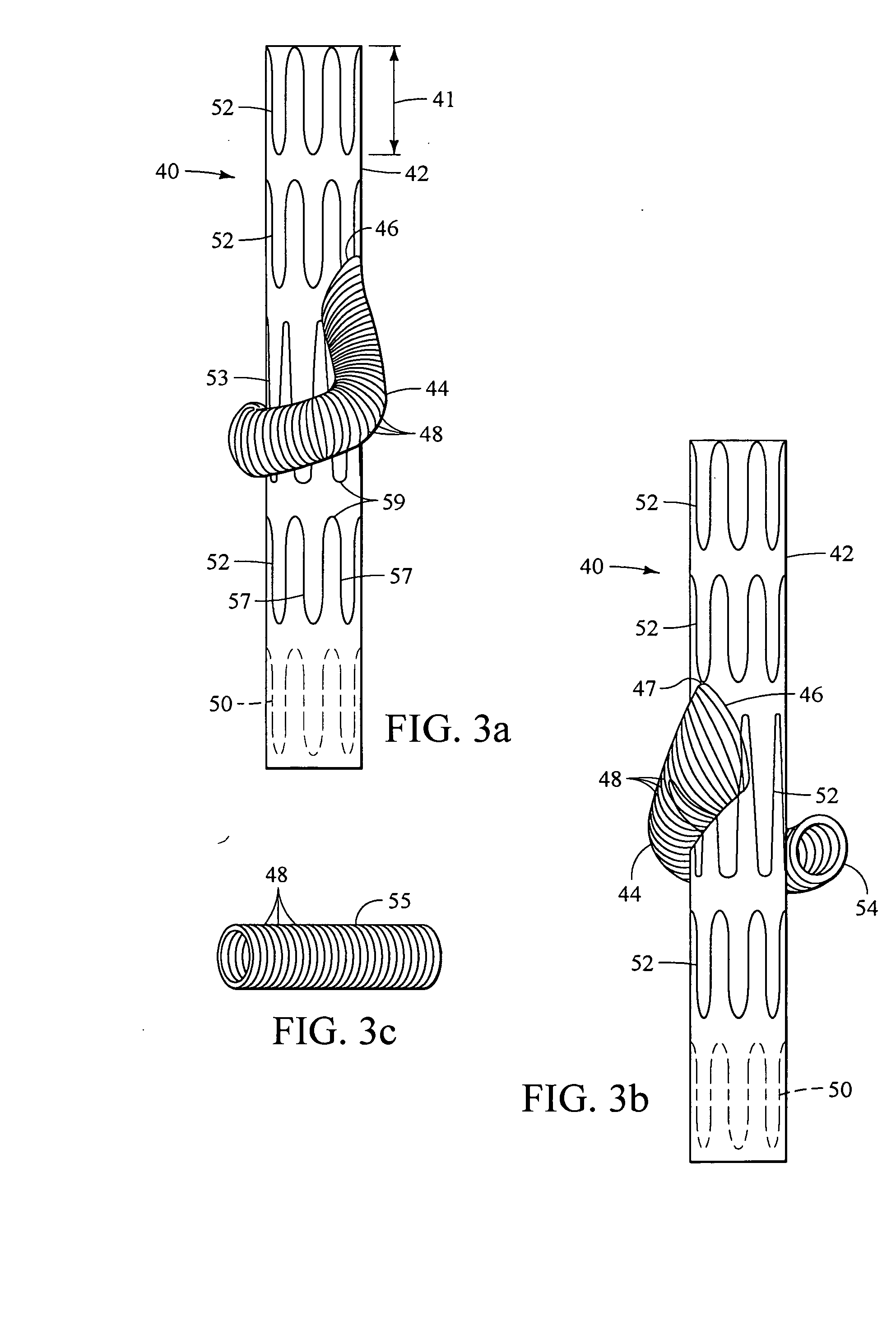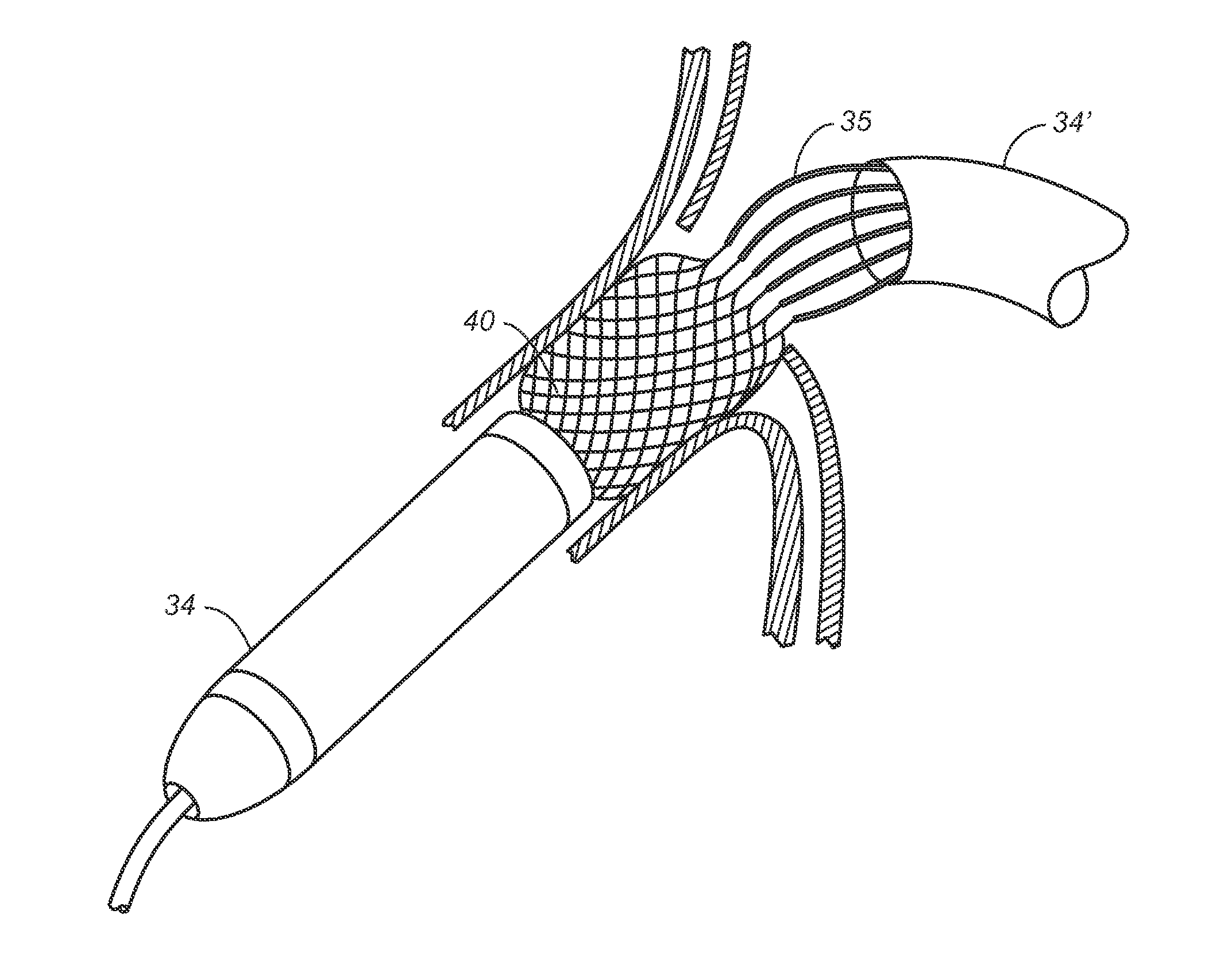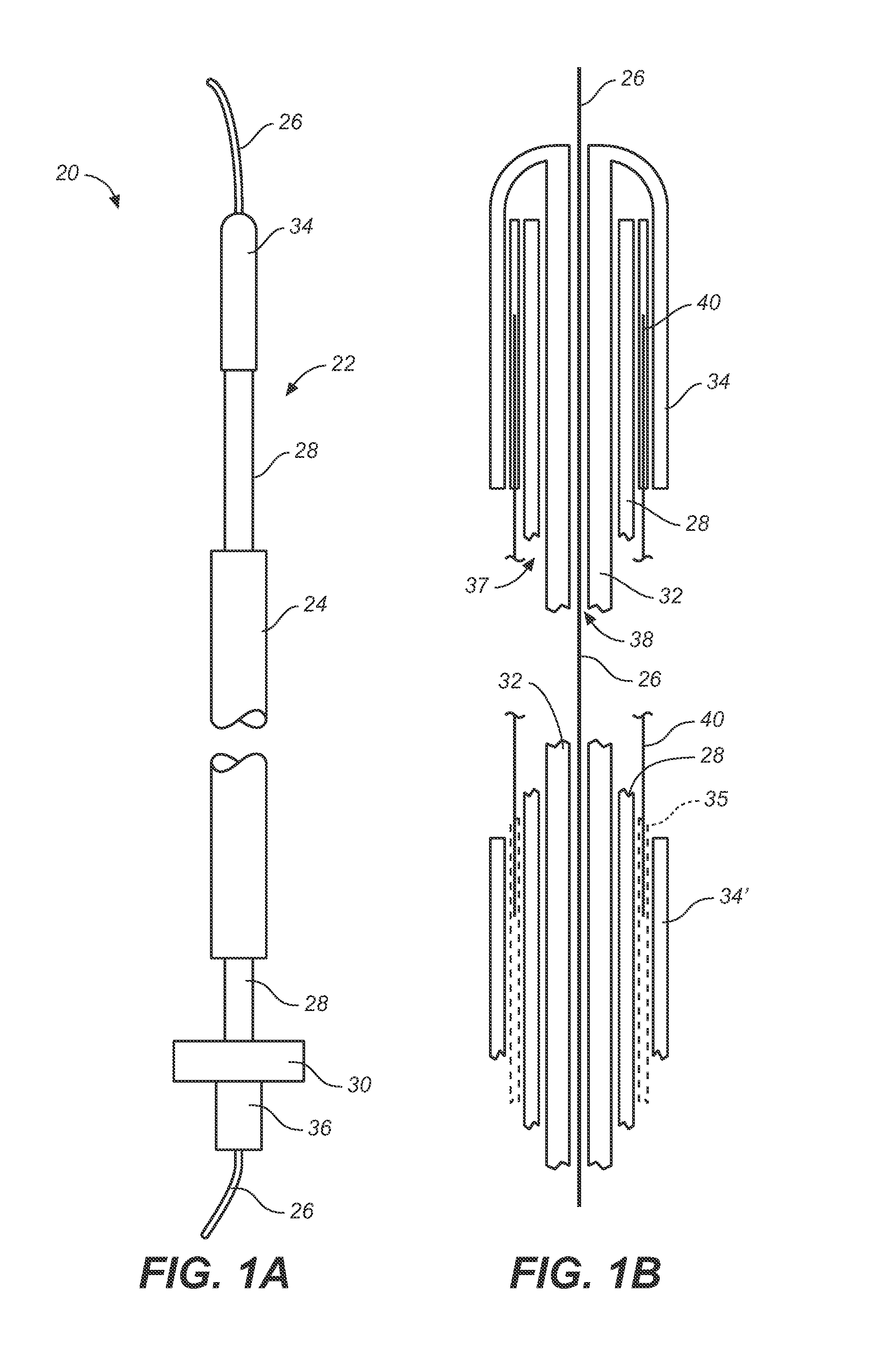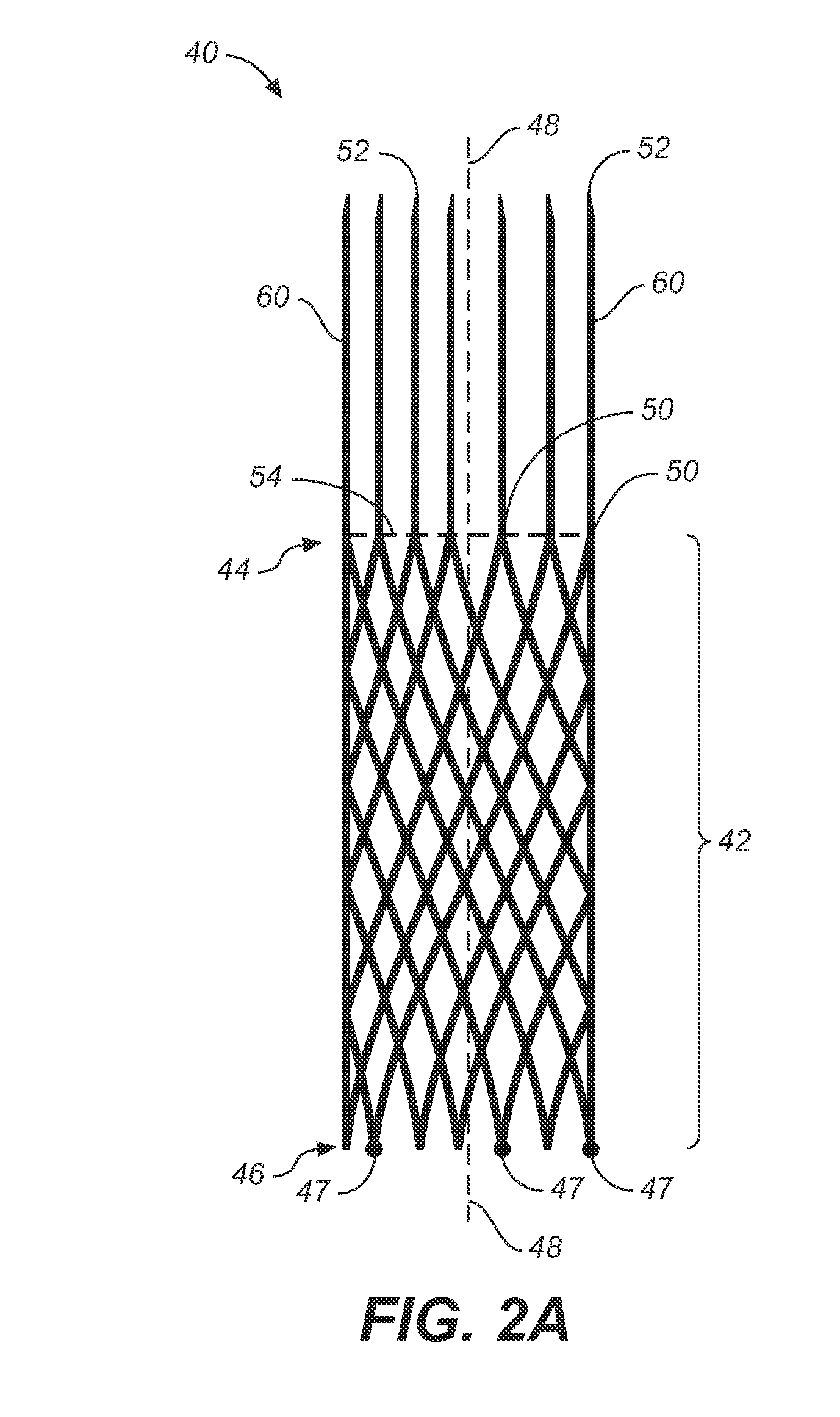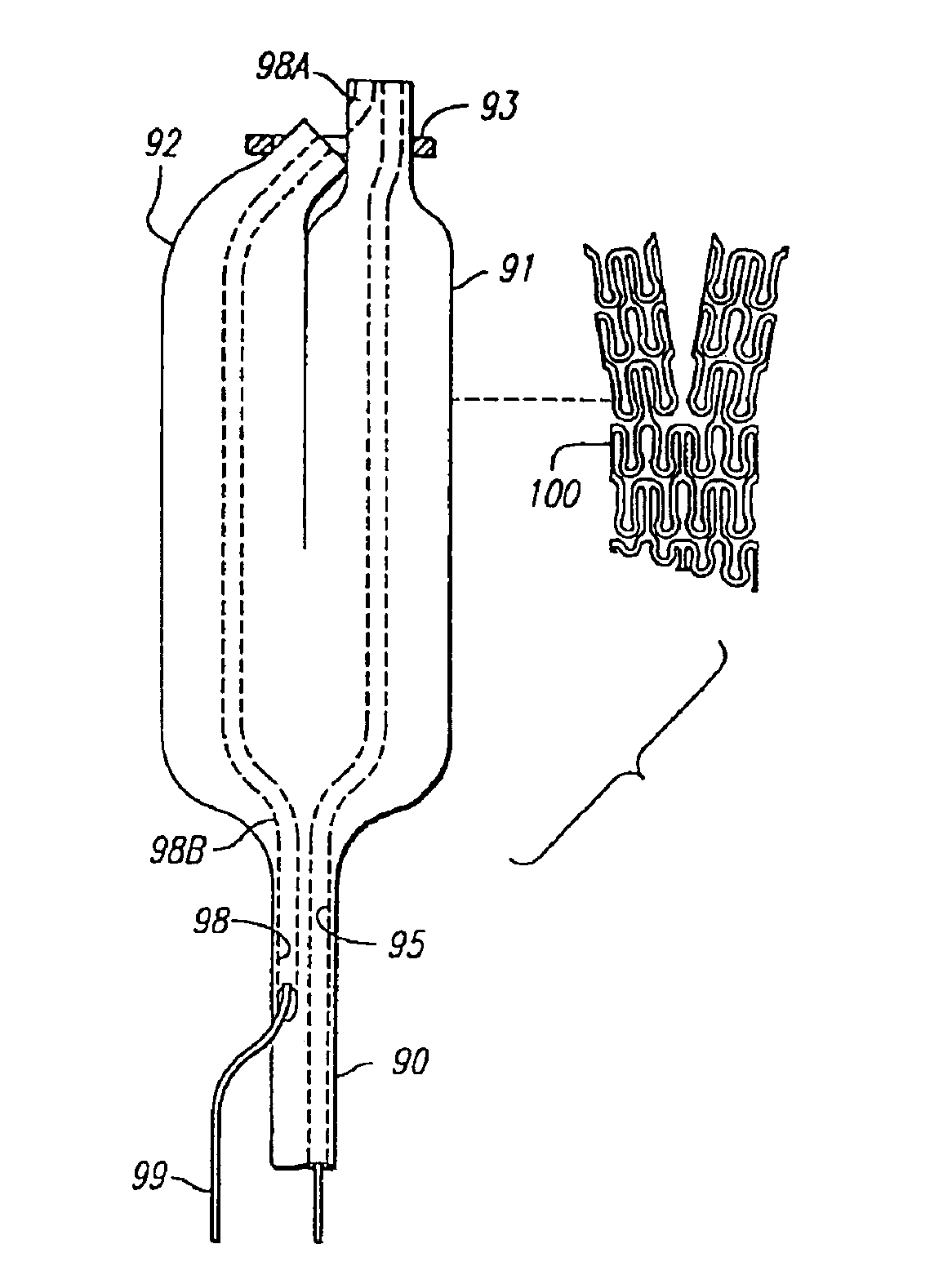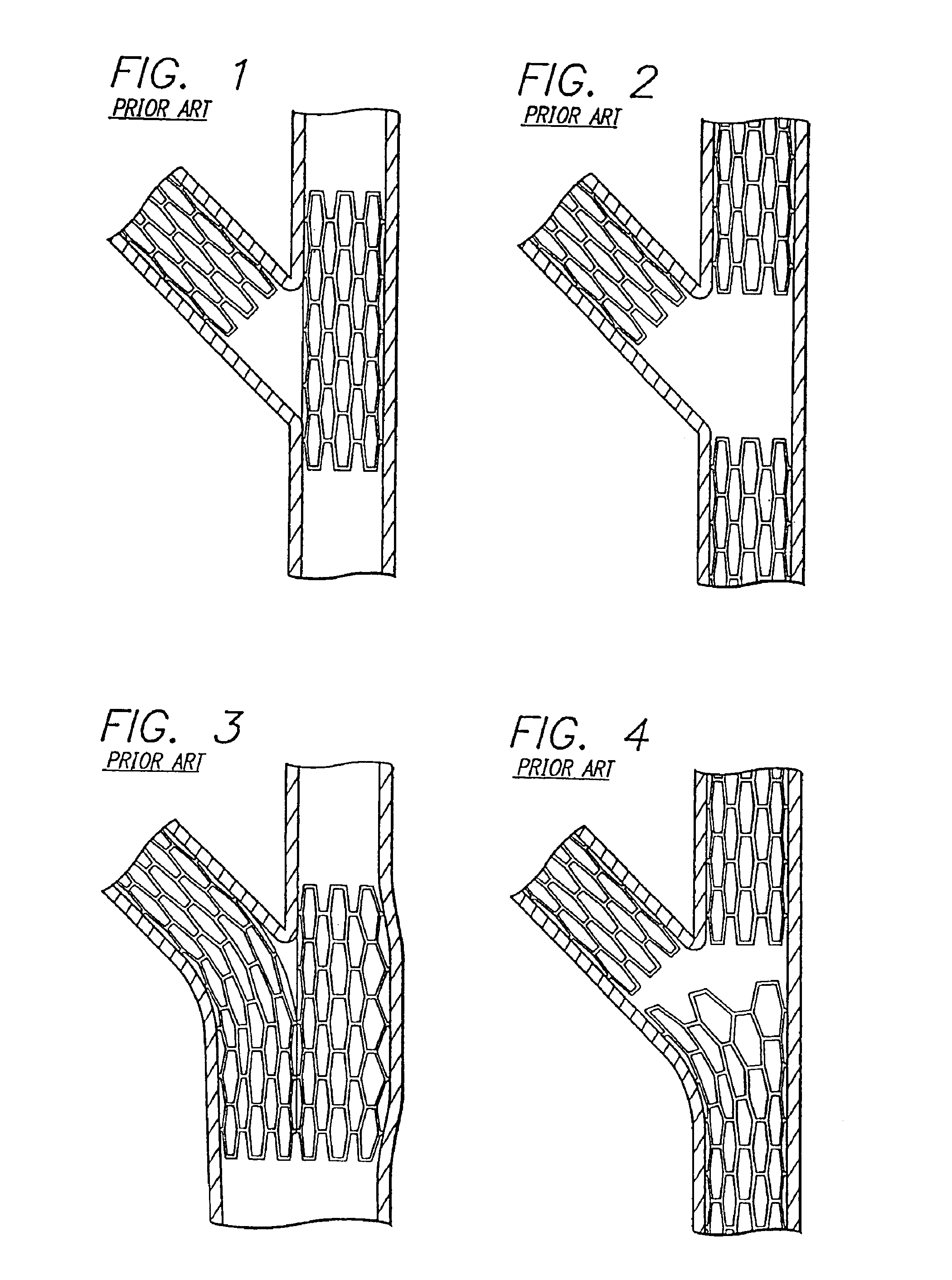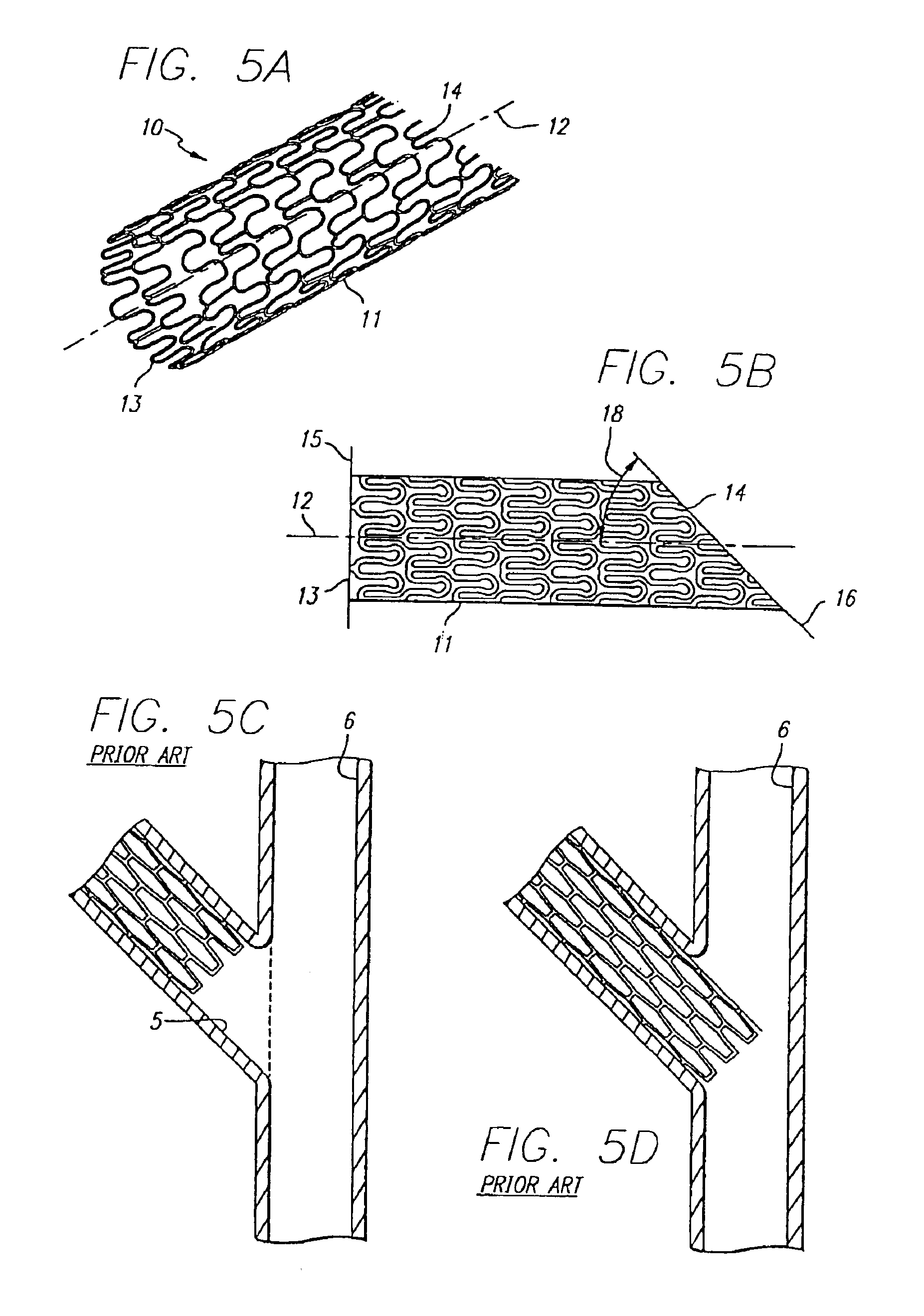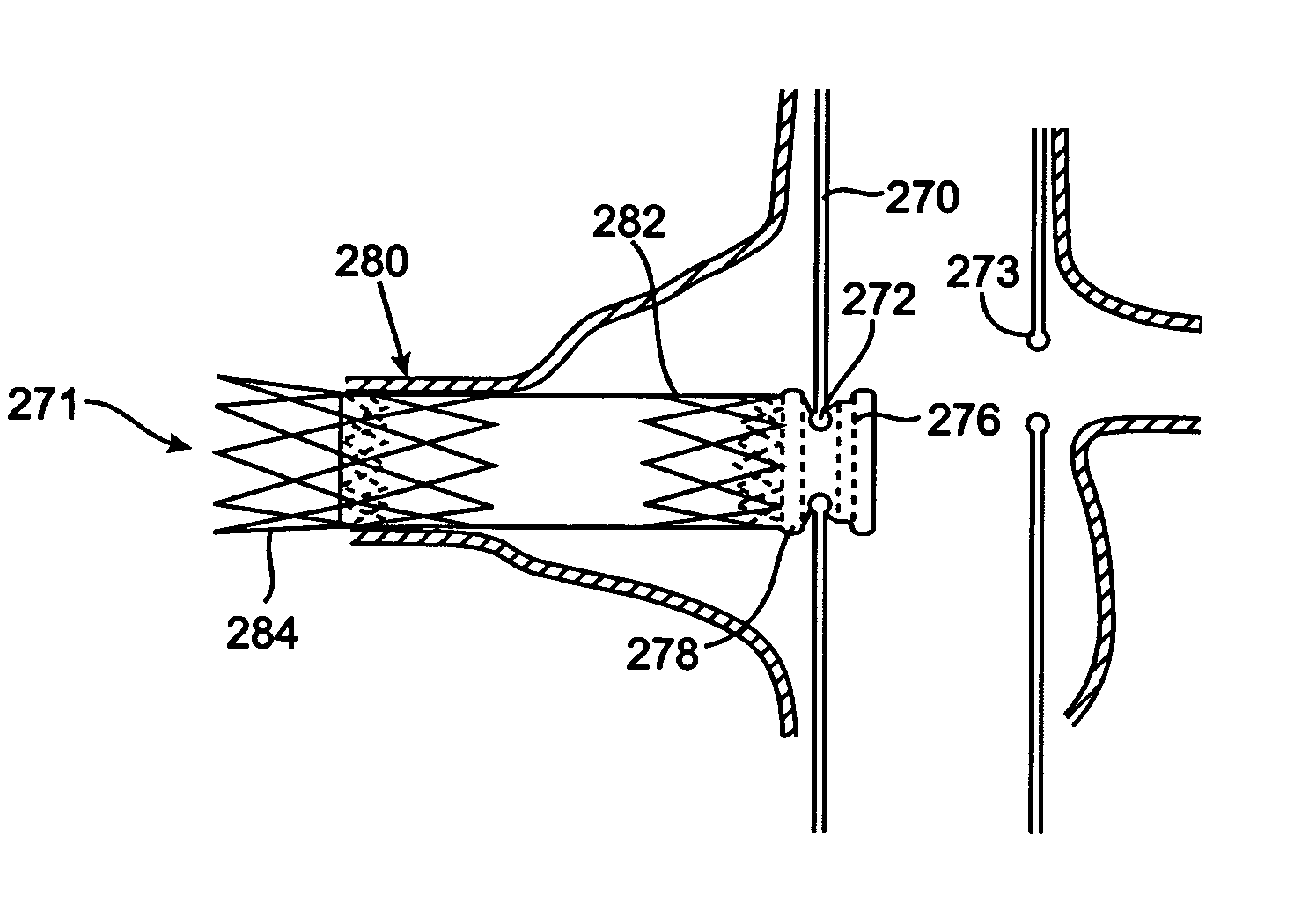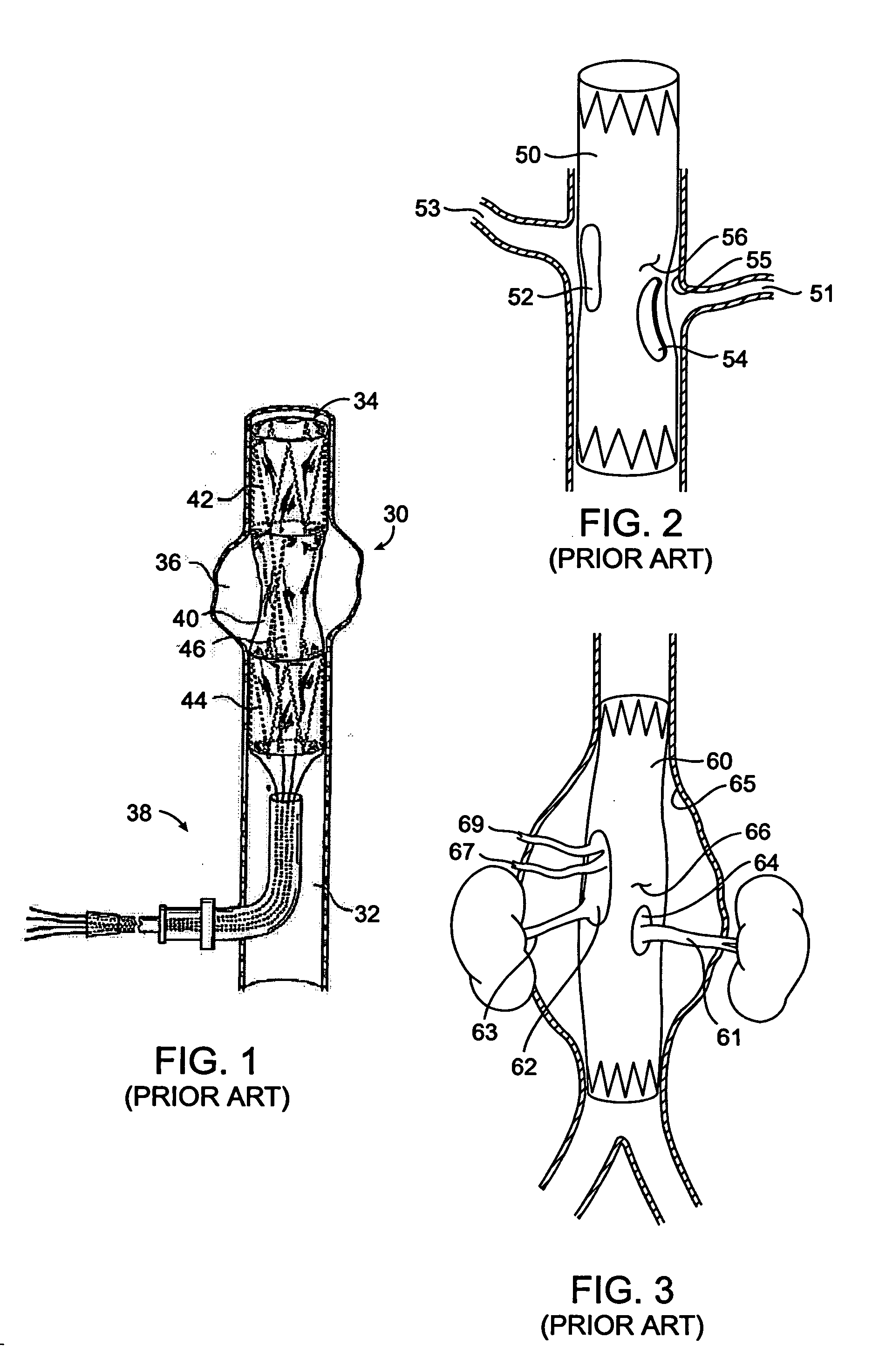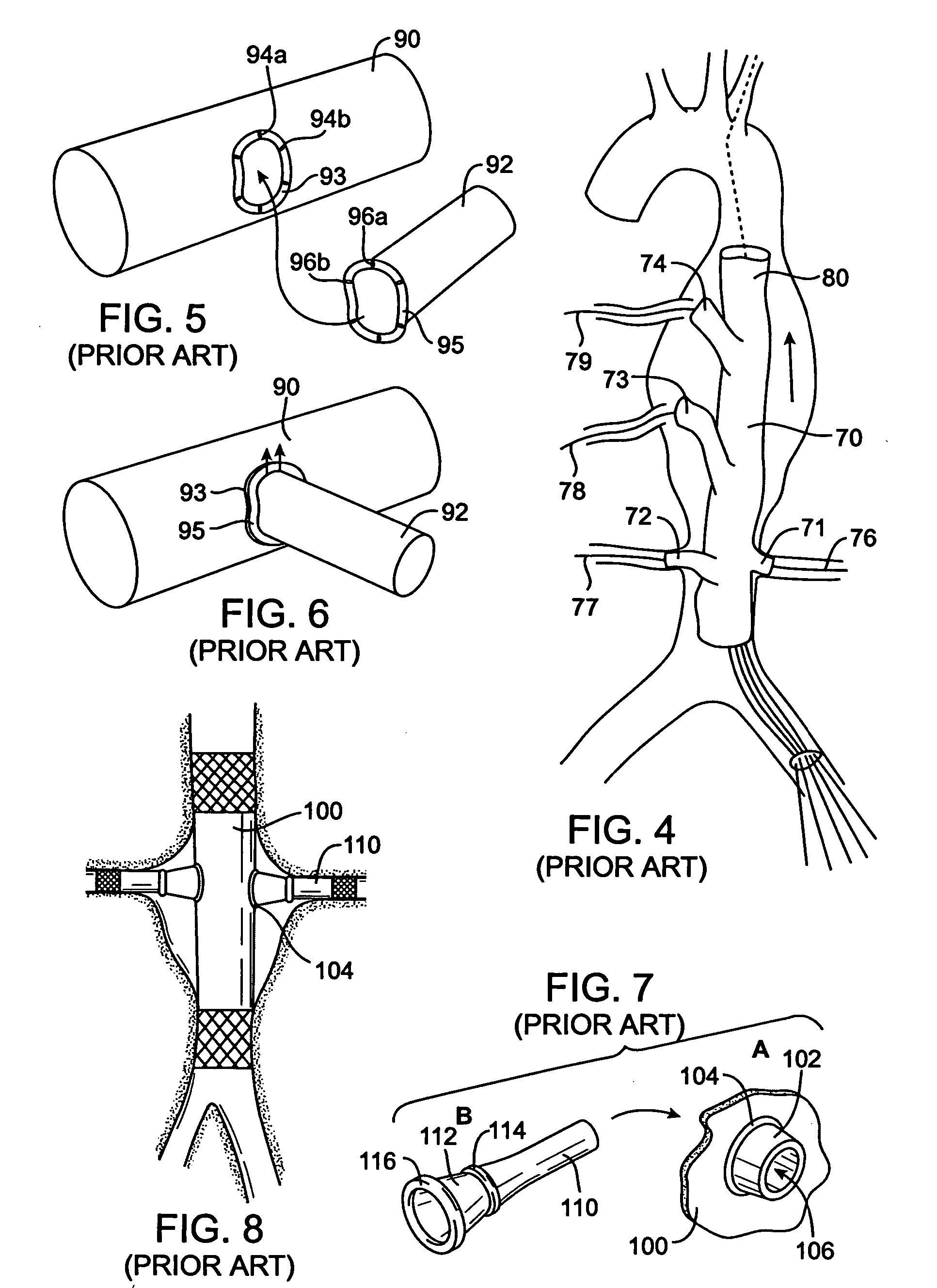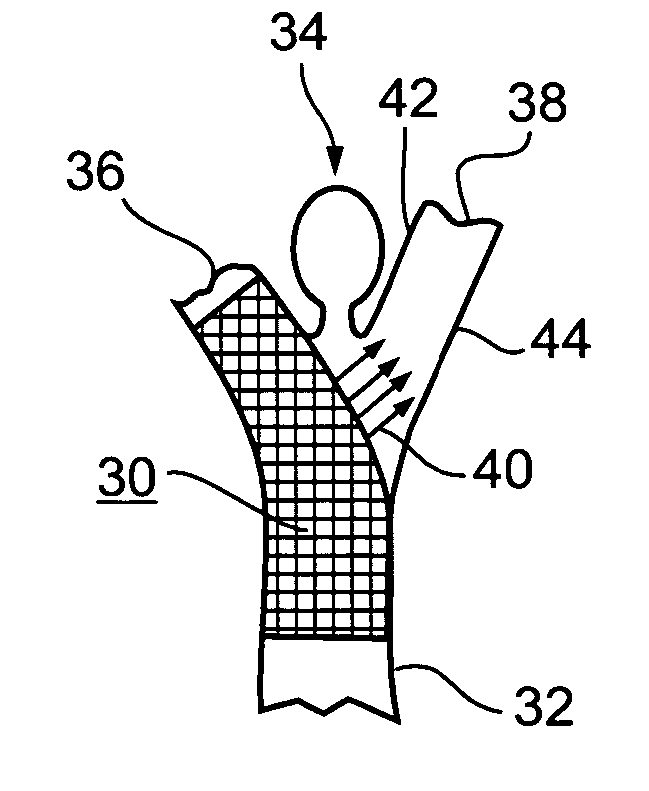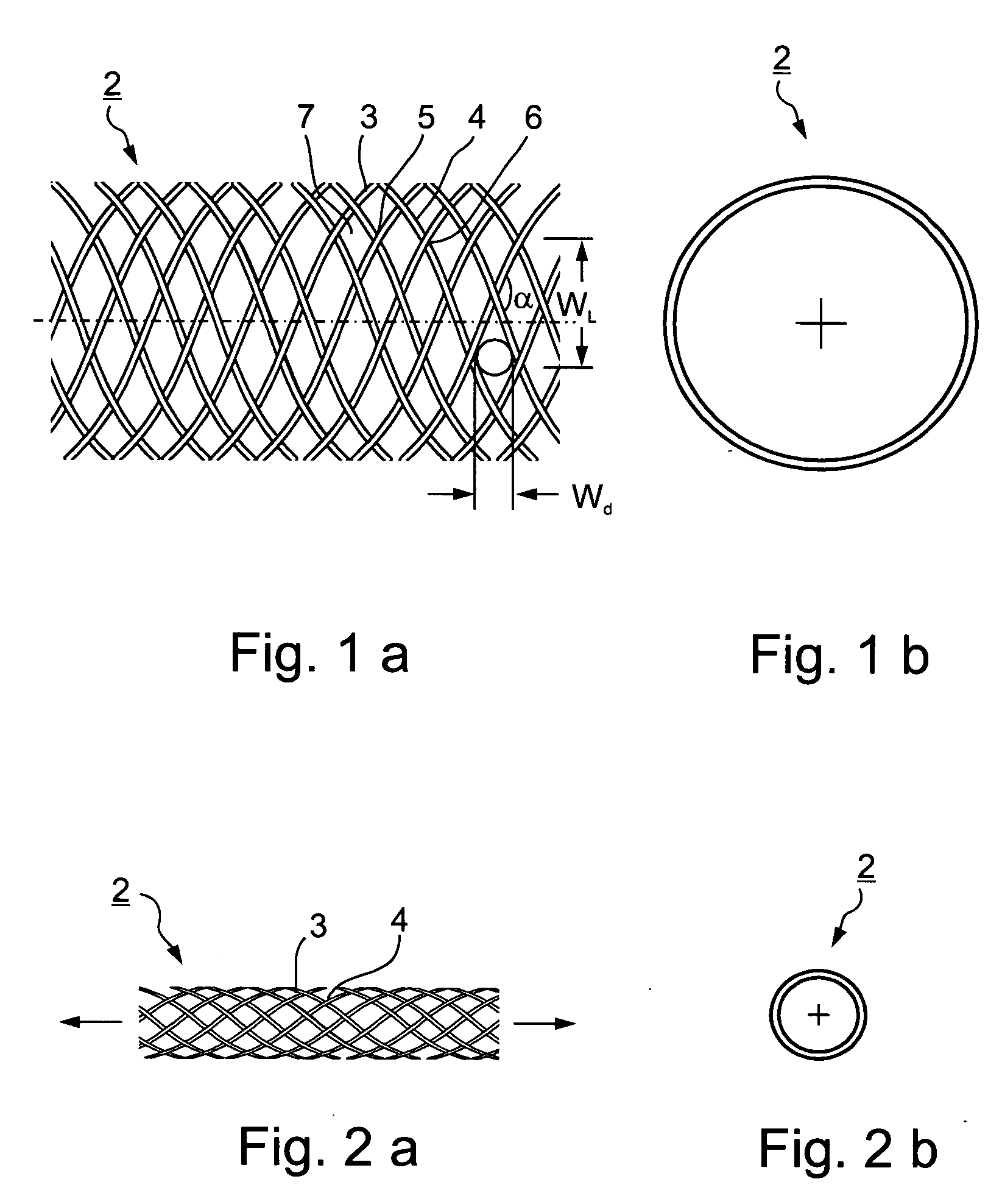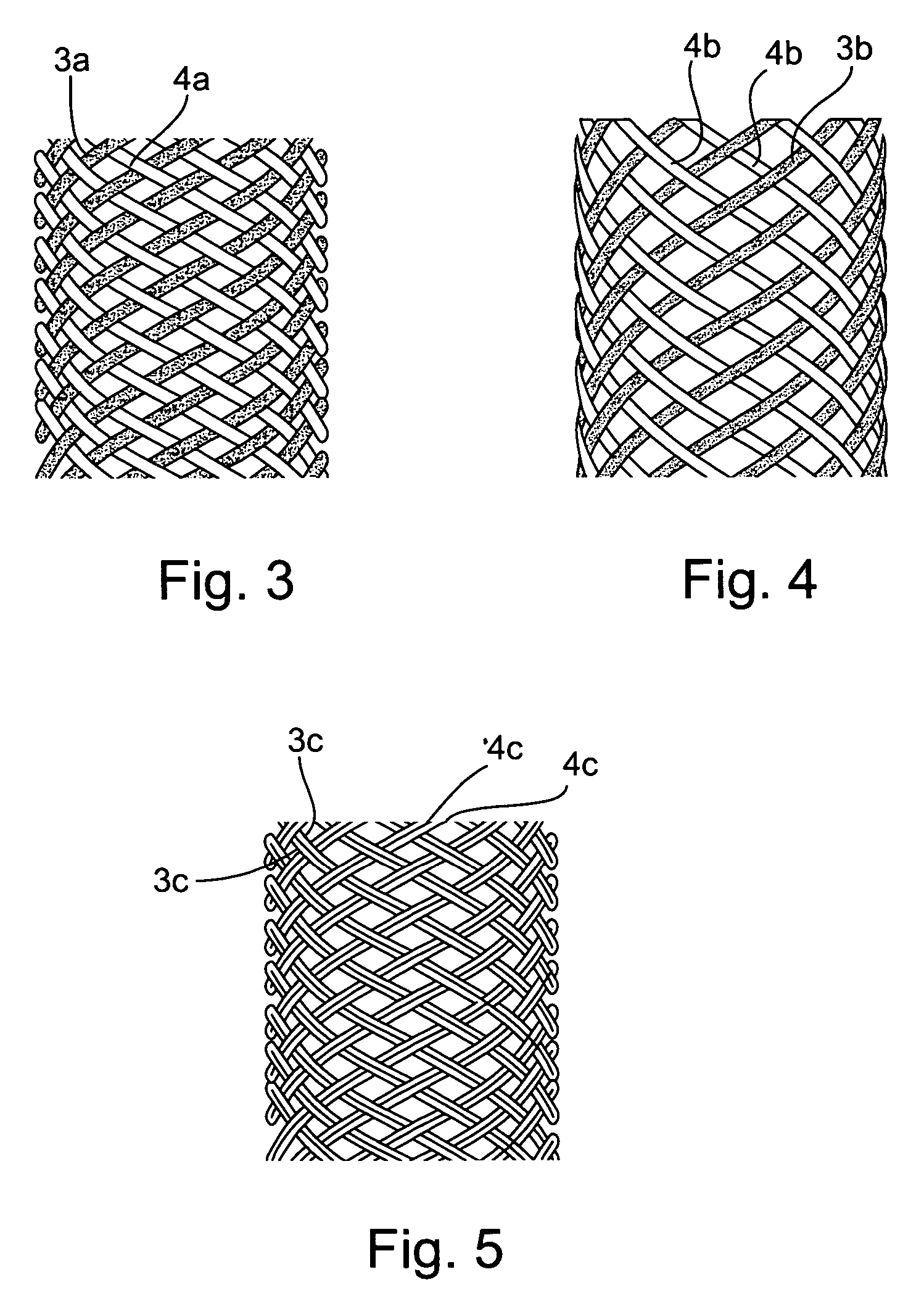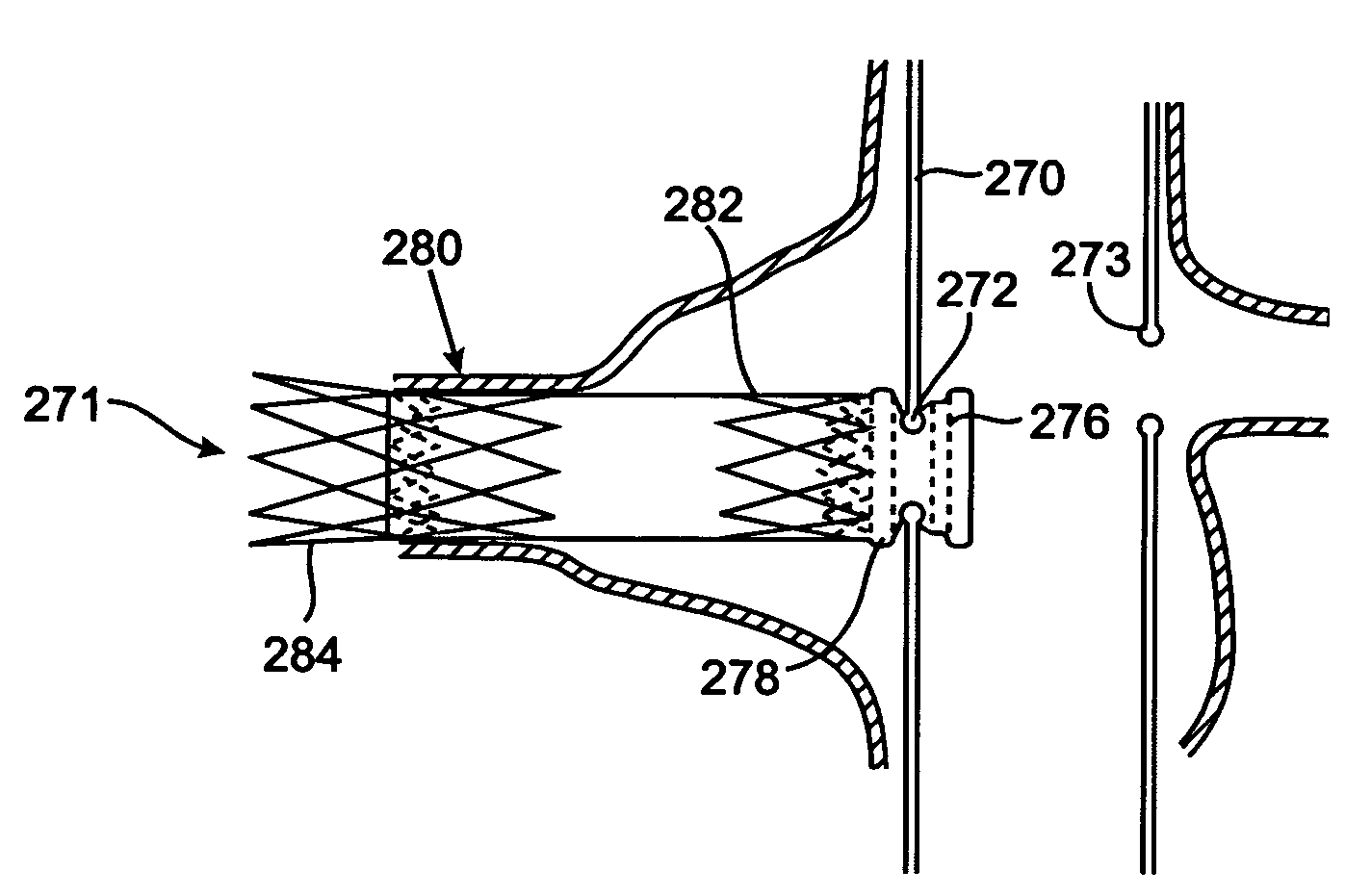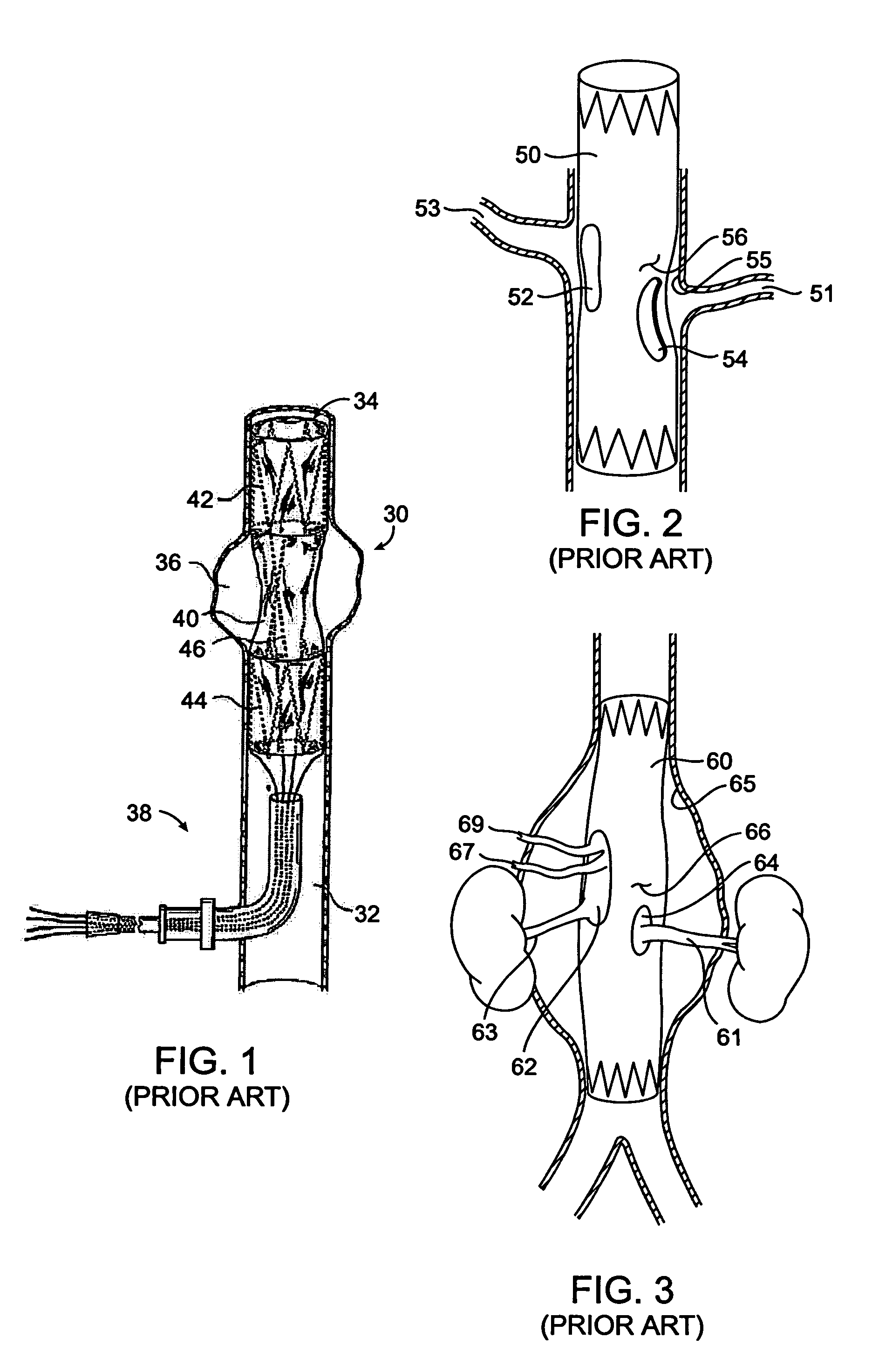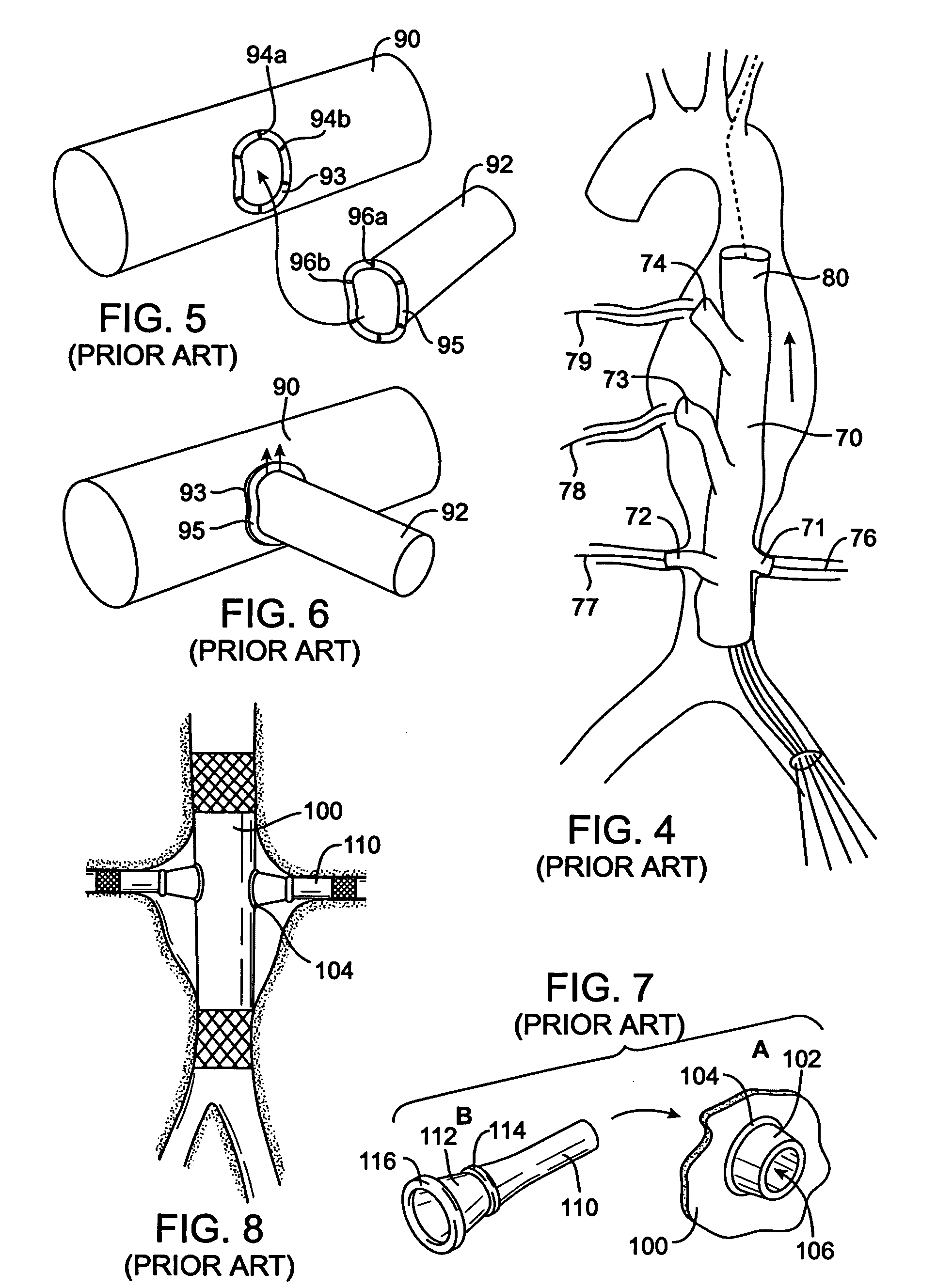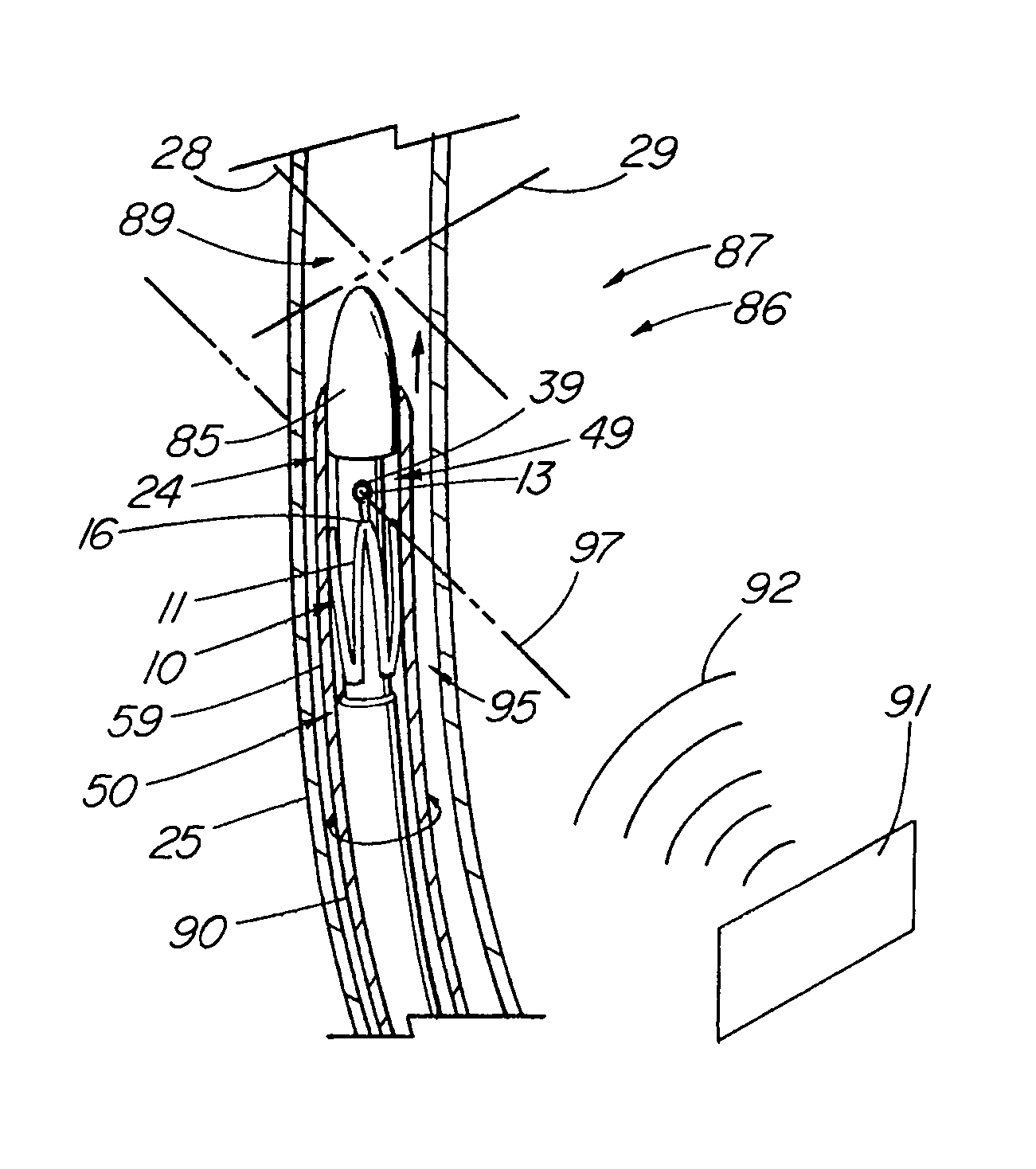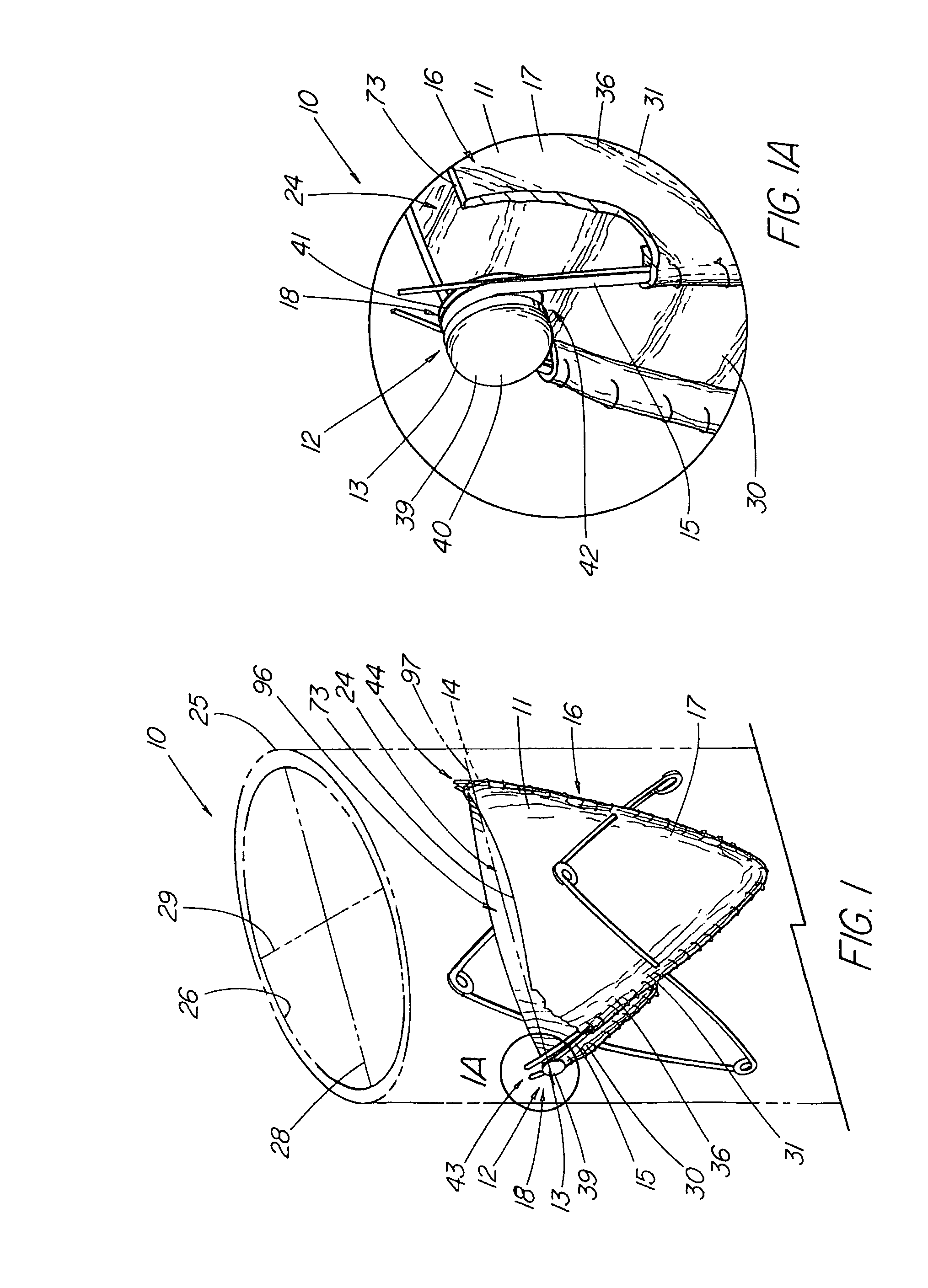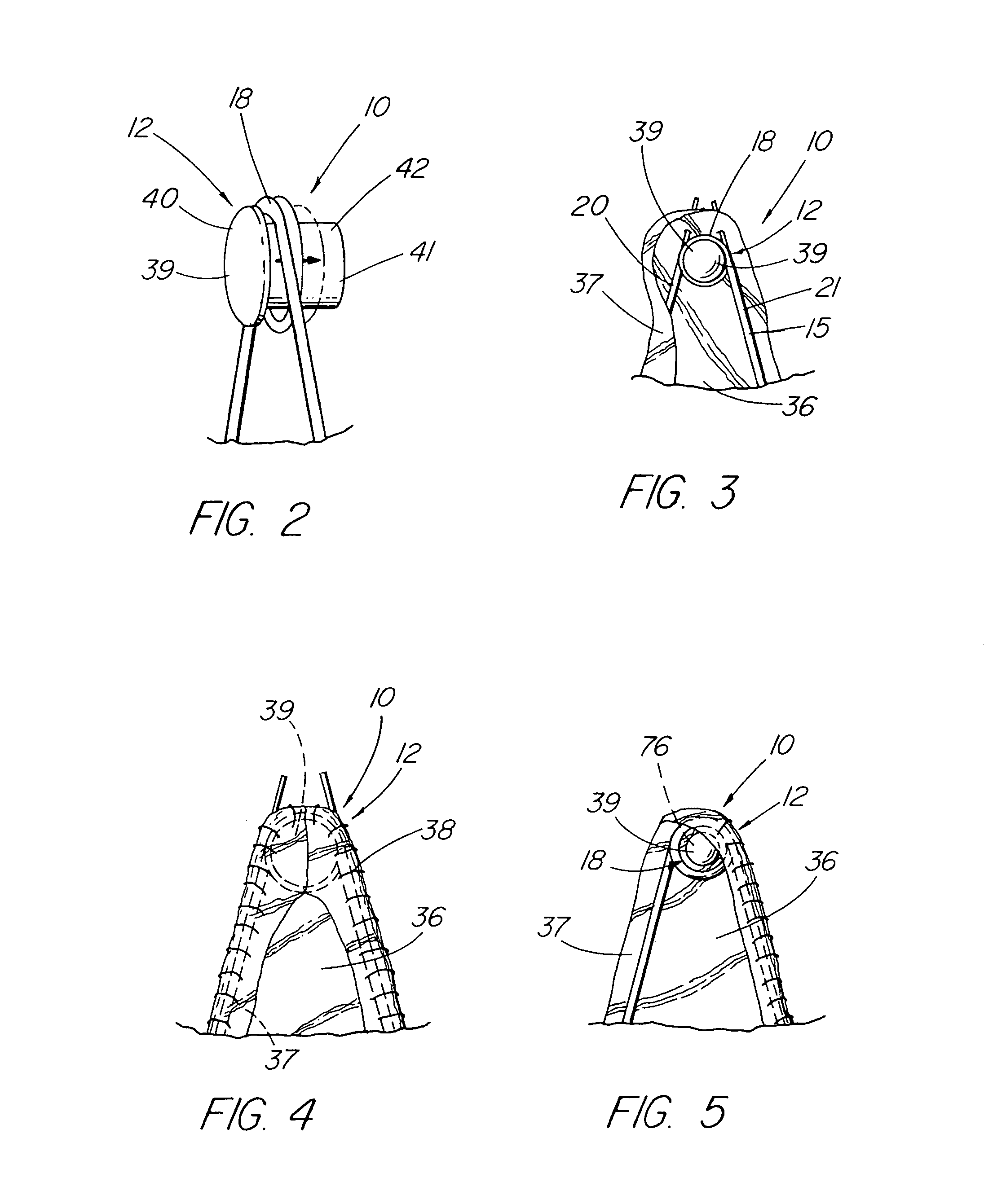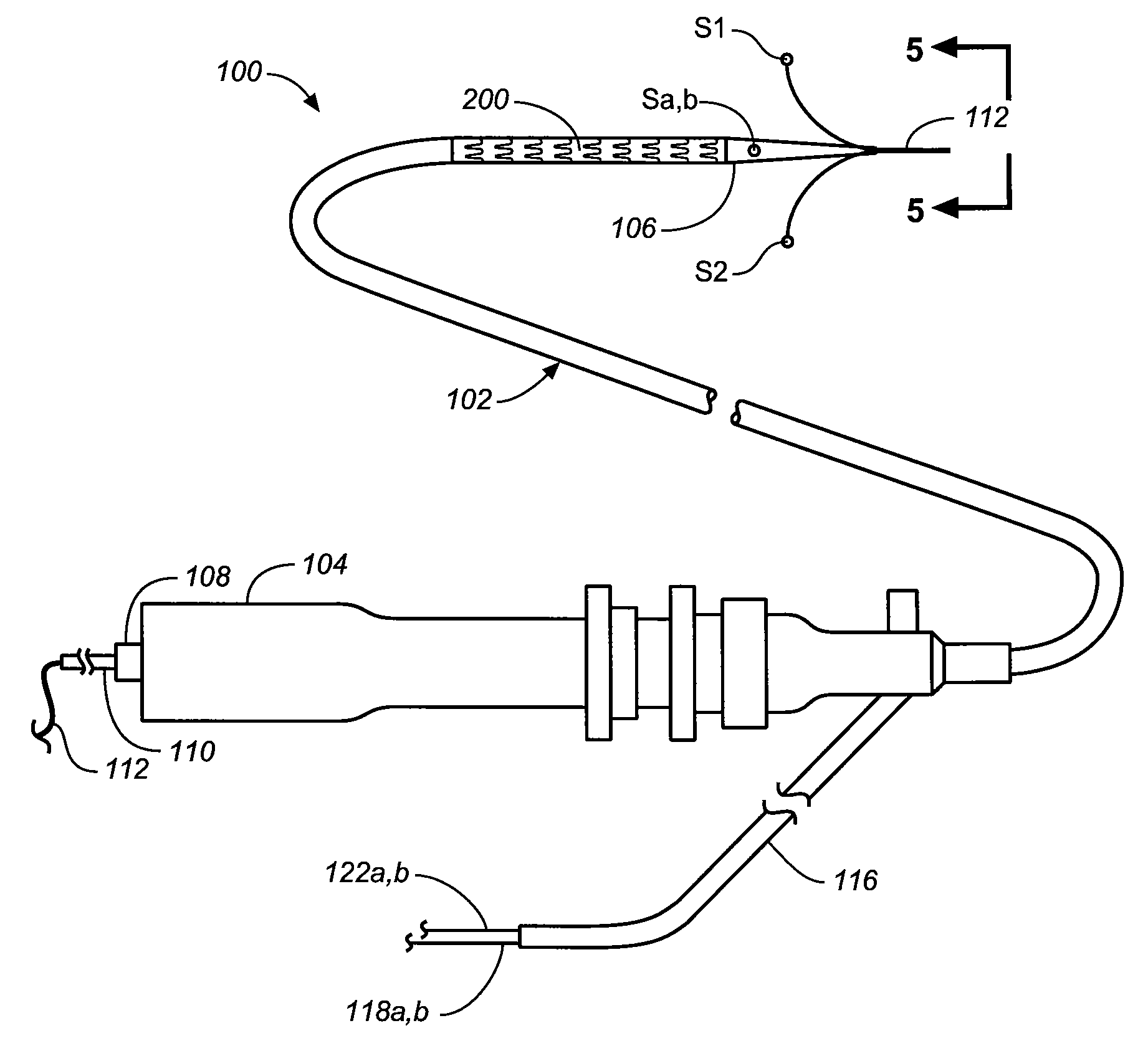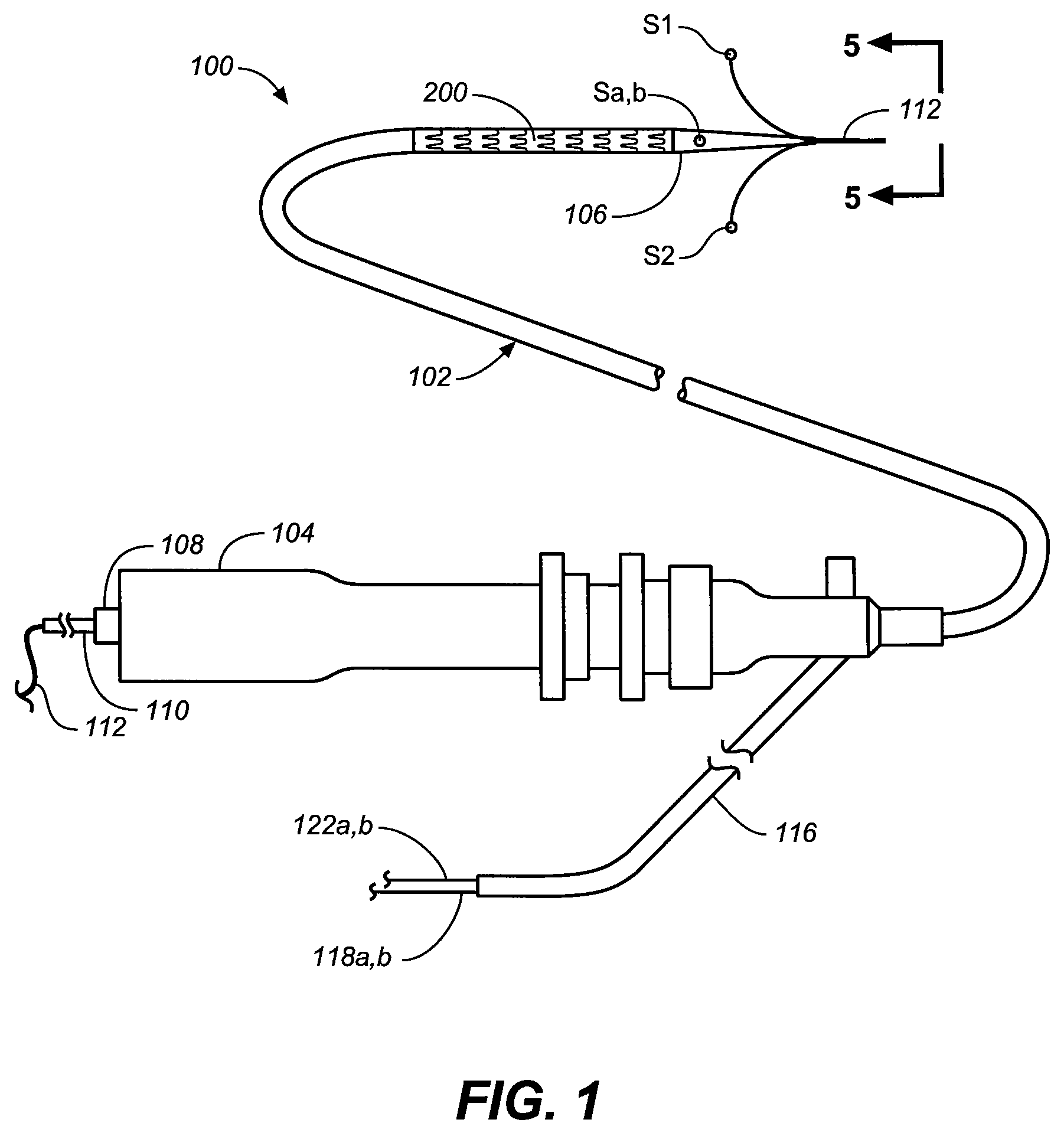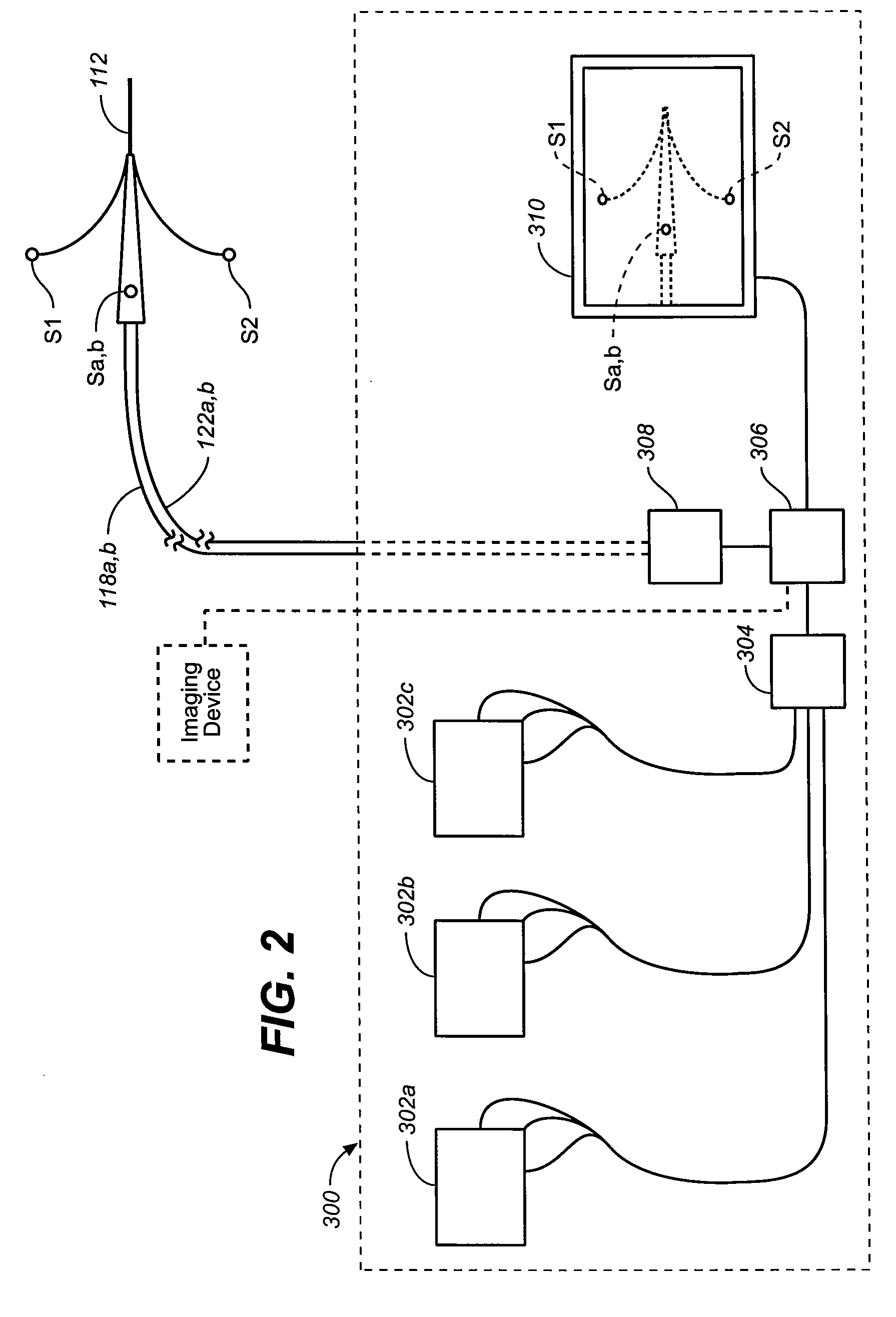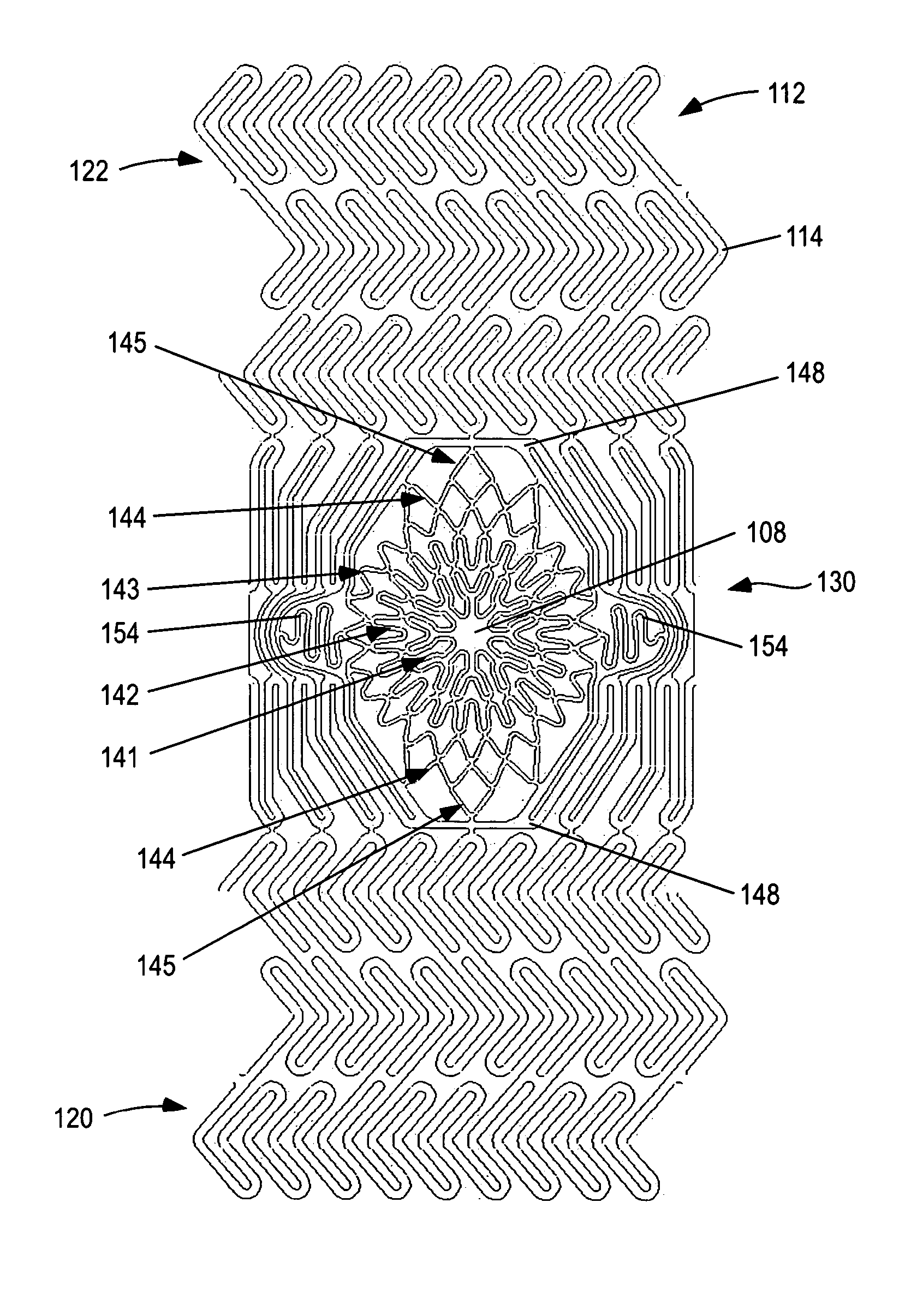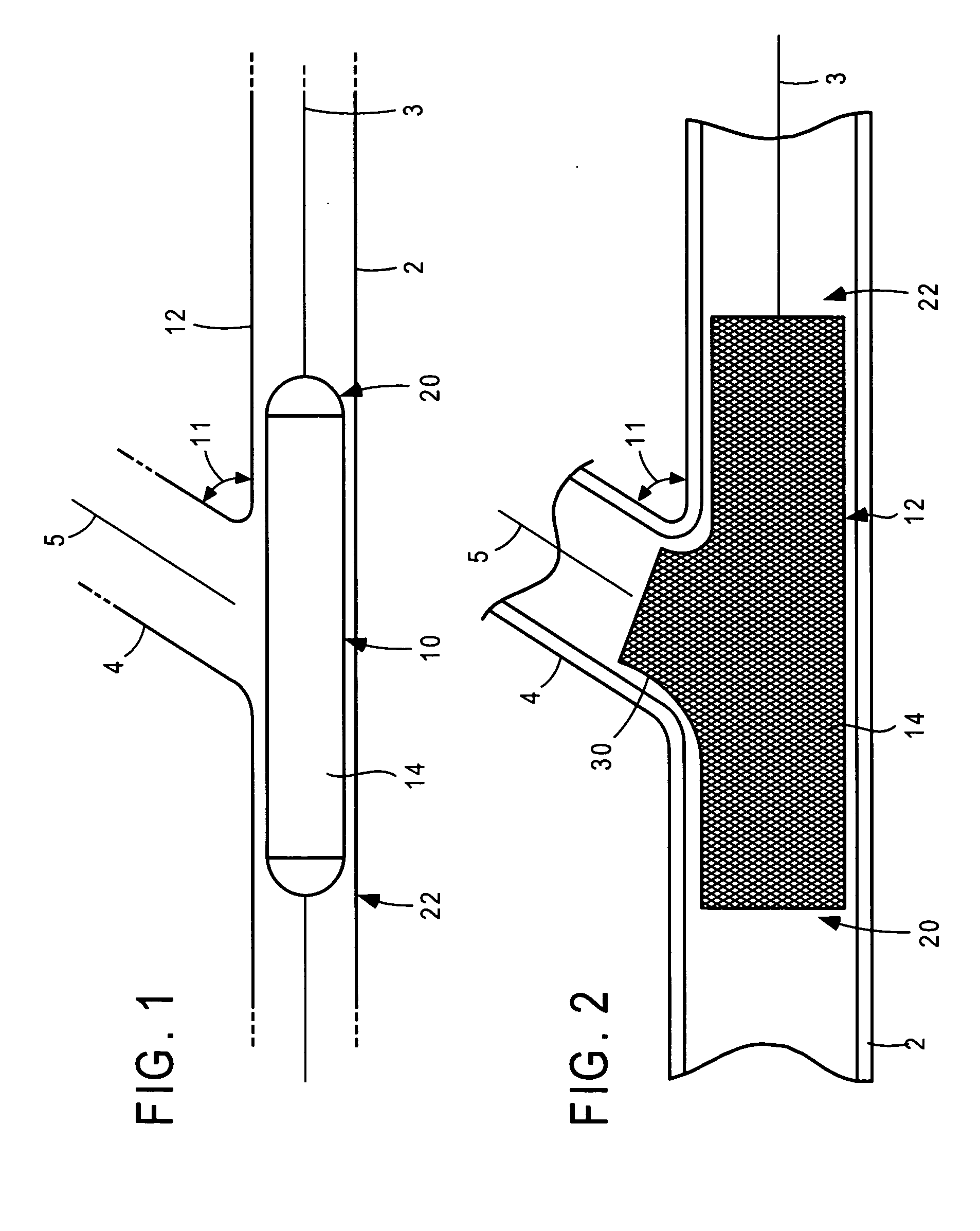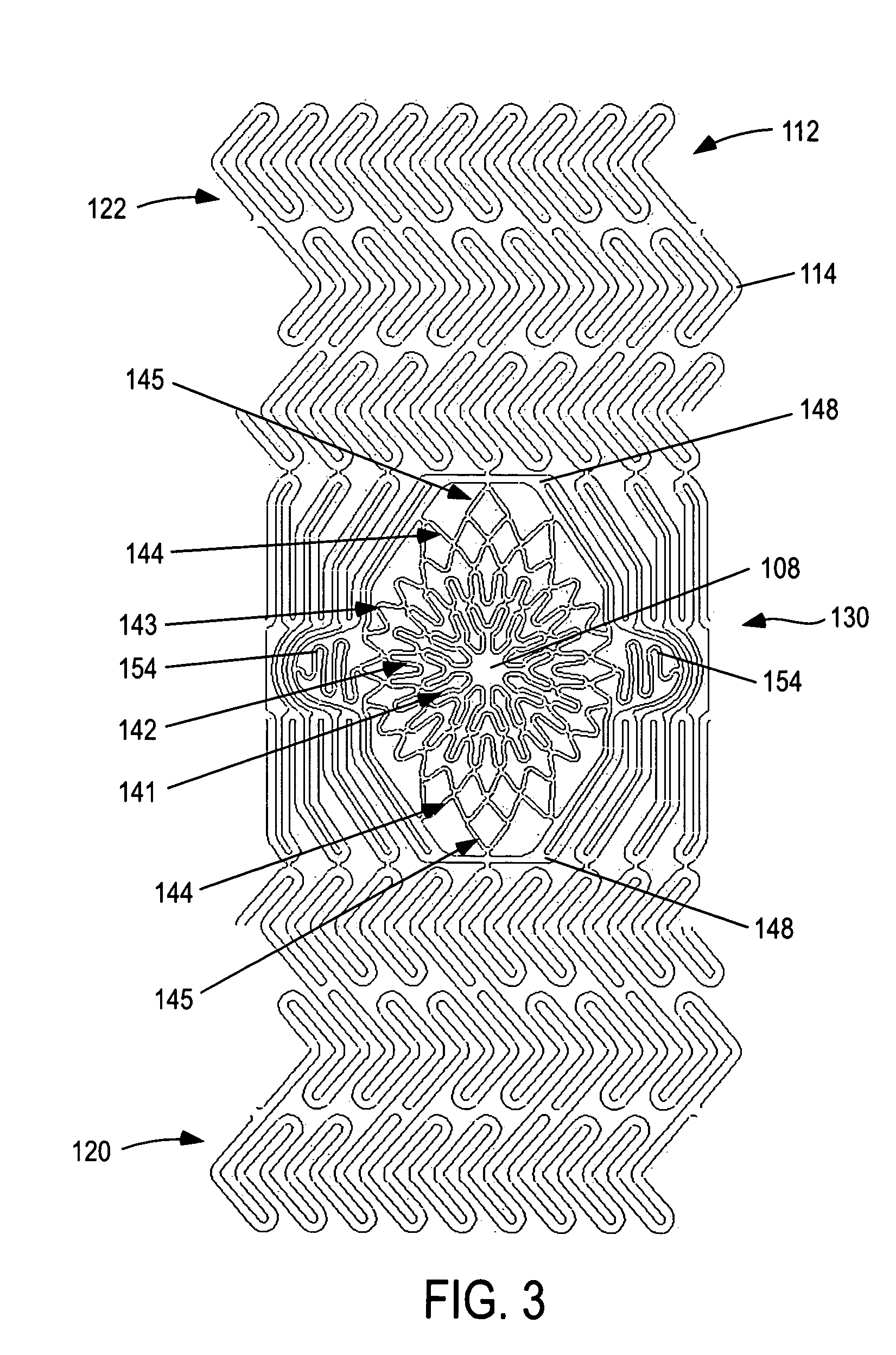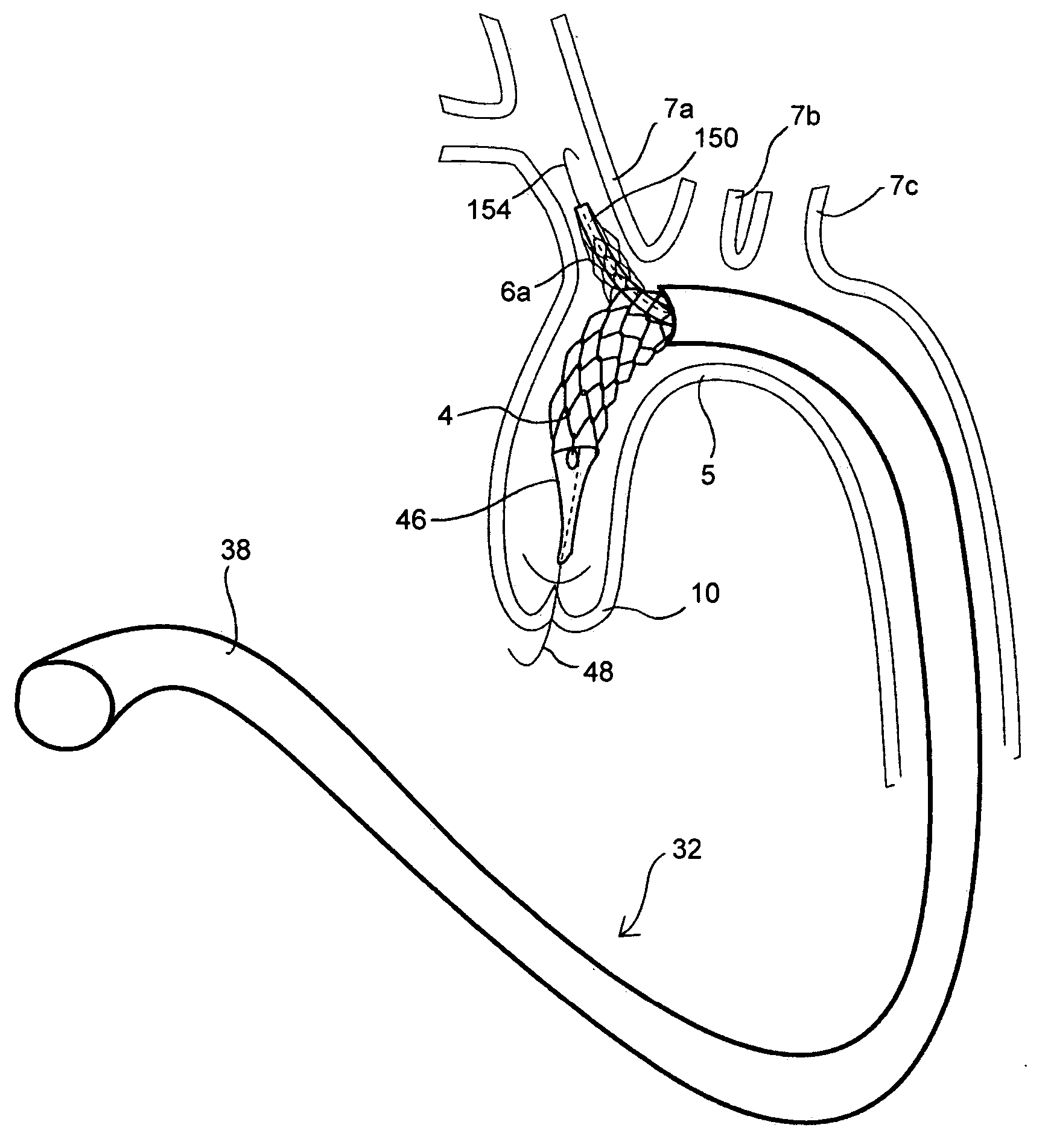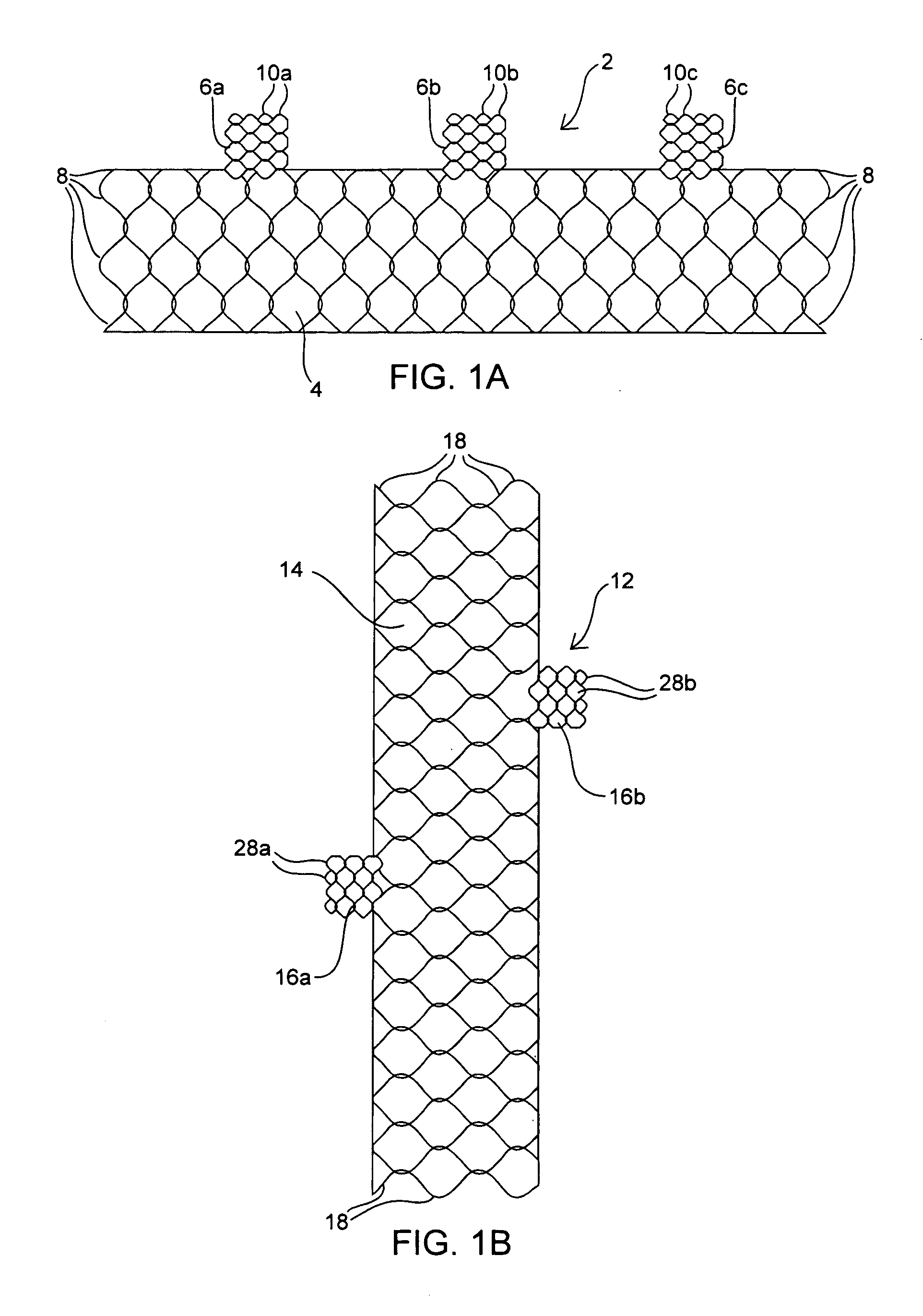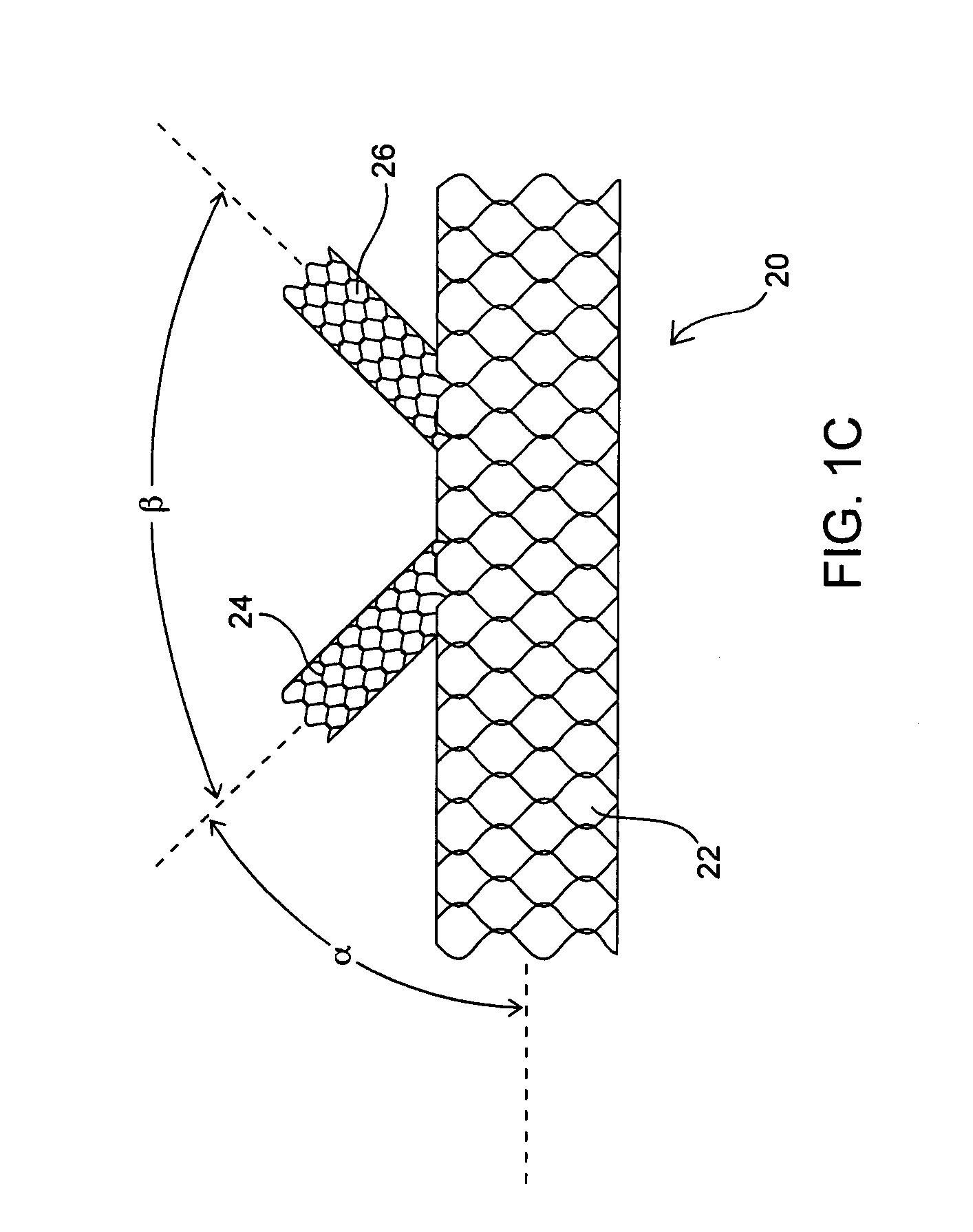Patents
Literature
447 results about "Branch vessel" patented technology
Efficacy Topic
Property
Owner
Technical Advancement
Application Domain
Technology Topic
Technology Field Word
Patent Country/Region
Patent Type
Patent Status
Application Year
Inventor
Stent or graft support structure for treating bifurcated vessels having different diameter portions and methods of use and implantation
A self-expanding stent structure is provided having a main portion that expands to a first diameter and a branch portion that expands to a second diameter, different the first diameter, the main portion having a link portion that forms a flexible linkage to, and forms part of, the branch portion. The self-expanding structure may be compressed to a reduced diameter for delivery, and resumes an expanded diameter during deployment. The self-expanding stent structure also may be advantageously incorporated in an asymmetric stent-graft system. Methods of use are also provided, wherein the main portion of the self-expanding structure, when deployed in a trunk vessel, may be used to anchor the branch portion in a branch vessel.
Owner:UFLACKER RENAN
Intra-aortic renal drug delivery catheter
InactiveUS7122019B1Reduce the amount requiredDecreased blood flowBalloon catheterMulti-lumen catheterContinuous perfusionBoth kidneys
A catheter for delivering a therapeutic or diagnostic agent to a branch blood vessel of a major blood vessel, generally comprising an elongated shaft having at least one lumen in fluid communication with an agent delivery port in a distal section of the shaft, an expandable tubular member on the distal section of the shaft, and a radially expandable member on the tubular member. The tubular member is configured to extend within the blood vessel up-stream and down-stream of a branch vessel, and has an interior passageway which is radially expandable within the blood vessel to separate blood flow through the blood vessel into an outer blood flow stream exterior to the tubular member and an inner blood flow stream within the interior passageway of the tubular member. The radially expandable member is located down-stream of the shaft agent delivery port, and has an expanded configuration with an outer diameter larger than an outer diameter of the tubular member. The expanded radially expandable member is configured to decrease the blood flow in the outer blood flow stream down-stream of the branch vessel. The catheter provides for delivery of an agent to a branch vessel of a major vessel, and continuous perfusion of the major blood vessel. Another aspect of the invention is directed to methods of delivering a therapeutic or diagnostic agent to one or both kidney's of a patient.
Owner:ANGIODYNAMICS INC
Intra-aortic renal drug delivery catheter
InactiveUS7329236B2Avoid and limit detrimental effectIncrease concentrationBalloon catheterMulti-lumen catheterDiagnostic agentGuide tube
A catheter for delivering a therapeutic or diagnostic agent to a branch blond vessel of a major blood vessel comprises an elongated shaft having at least one lumen in fluid communication with an agent delivery port in a distal section of the shaft, an expandable tubular member on the distal section of the shaft, and a radially expandable member on the tubular member. The tubular member is configured to extend within the blood vessel up-stream and down-stream of a branch vessel, and has an interior passageway which is radially expandable within the blood vessel to separate blood flow through the blood vessel into an outer blood flow stream exterior to the tubular member and an inner blood flow stream within the interior passageway of the tubular member.
Owner:ANGIODYNAMICS INC
Vessel Position and Configuration Imaging Apparatus and Methods
One or more markers or sensors are positioned in the vasculature of a patient to facilitate determining the location, configuration, and / or orientation of a vessel or certain aspects thereof (e.g., a branch vessel), determining the location, configuration and / or orientation of a endovascular devices prior to and during prosthesis deployment as well as the relative position of portions of the vasculature and devices, generating an image of a virtual model of a portion of one or more vessels (e.g., branch vessels) or devices, and / or formation of one or more openings in a tubular prosthesis in situ to allow branch vessel perfusion when the prosthesis is placed over one or more branch vessels in a patient (e.g., when an aortic abdominal artery stent-graft is fixed to the aorta superior to the renal artery ostia).
Owner:MEDTRONIC VASCULAR INC
Branched vessel endoluminal device with fenestration
An endoluminal prosthesis comprises a prosthetic trunk comprising a trunk lumen extending therethrough, a wall, an anastomosis in the wall, and a first fenestration in the wall, wherein the prosthetic trunk has a circumference. The endoluminal prosthesis further comprises a prosthetic branch comprising a branch lumen extending therethrough. The branch lumen is in fluid communication with the trunk lumen through the anastomosis. The prosthetic branch is disposed longitudinally along and circumferentially about the prosthetic trunk.
Owner:THE CLEVELAND CLINIC FOUND
Branch vessel prosthesis with a roll-up sealing assembly
A branch prosthesis configured for placement in a branch vessel includes an expandable tubular body portion, an expandable annular flange attached to a proximal end of the body portion, and a sealing sleeve proximally extending from the annular flange. The sealing sleeve is adapted to deform to a generally straight cylindrical hollow shape during implantation. When deployed, the sealing sleeve rolls up to a tightly-wound coil that bears against the annular flange. When used in conjunction with a main prosthesis having a side opening and deployed within in a main vessel, the annular flange of the branch prosthesis engages an outer surface of the main prosthesis around a perimeter of the side opening and the sealing sleeve engages an inner surface of the main prosthesis around the perimeter of the side opening to form a fluid-tight seal between the main prosthesis and the branch prosthesis.
Owner:MEDTRONIC VASCULAR INC
Catheter balloon systems and methods
An apparatus for treatment of a bifurcation of a body lumen, the bifurcation having a main vessel and a branch vessel, the apparatus includes a bifurcated balloon with a first branch portion and a second branch portion, the second branch portion including an inflatable portion adapted to extend toward the branch vessel, the bifurcated balloon also having a proximal shaft portion and a distal shaft portion connected to the inflatable portion of the second branch portion, and wherein the first branch portion and the second branch portion each have a longitudinal axis, the axis of the first branch portion being substantially parallel to the longitudinal axis of the second branch portion.
Owner:BOSTON SCI SCIMED INC
Implantable intraluminal device and method of using same in treating aneurysms
An intraluminal device implantable in a blood vessel having an aneurysm therein in the vicinity of a perforating vessel and / or of a bifurcation leading to a branch vessel. The intraluminal device includes a mesh-like tube of bio-compatible material having an expanded condition in which the tube diameter is slightly larger than the diameter of the blood vessel in which it is to be implanted, and the tube length is sufficient to straddle the aneurysm and to be anchored to the blood vessel on the opposite sides of the aneurysm. The mesh-like tube also has a contracted condition wherein it is sufficiently flexible so as to be easily manipulatable through the blood vessel to straddle the aneurysm. In its expanded condition, the mesh-like tube has a porosity index of 55%-80% such as to reduce the flow of blood through its wall to the aneurysm sufficiently to decrease the possibility of rupture of the aneurysm but not to unduly reduce the blood flow to a perforating or branch vessel to the degree likely to cause significant damage to tissues supplied with blood by such perforating or branch vessel.
Owner:STRYKER CORP
Method and apparatus for intra aortic substance delivery to a branch vessel
A renal flow system injects a volume of fluid agent into a location within an abdominal aorta in a manner that flows bilaterally into each of two renal arteries via their respectively spaced ostia along the abdominal aorta wall. A local injection assembly (100) includes two injection members (104, 106), each having an injection port (112) that couples to a source of fluid agent externally of the patient. The injection ports may be positioned within an outer region of blood flow along the abdominal aorta wall perfusing the two renal arteries.
Owner:ANGIODYNAMICS INC
Intra-aortic renal drug delivery catheter
InactiveUS7481803B2Reduce the amount requiredDecreased blood flowStentsBalloon catheterDiagnostic agentBlood vessel
A catheter for delivering a therapeutic or diagnostic agent to a branch blood vessel of a major blood vessel, generally comprising an elongated shaft having at least one lumen in fluid communication with an agent delivery port in a distal section of the shaft, an expandable tubular member on the distal section of the shaft, and a radially expandable member on the tubular member. The tubular member is configured to extend within the blood vessel up-stream and down-stream of a branch vessel, and has an interior passageway which is radially expandable within the blood vessel to separate blood flow through the blood vessel into an outer blood flow stream exterior to the tubular member and an inner blood flow stream within the interior passageway of the tubular member.
Owner:ANGIODYNAMICS INC
Method and apparatus for intra-aortic substance delivery to a branch vessel
A renal flow system injects a volume of fluid agent into a location within an abdominal aorta in a manner that flows bi-laterally into each of two renal arteries via their respectively spaced ostia along the abdominal aorta wall. A local injection assembly includes two injection members, each having an injection port that couples to a source of fluid agent externally of the patient. The injection ports may be positioned with an outer region of blood flow along the abdominal aorta wall perfusing the two renal arteries. A flow isolation assembly may isolate flow of the injected agent within the outer region and into the renals. The injection members are delivered to the location in a first radially collapsed condition, and bifurcate across the aorta to inject into the spaced renal ostia. A delivery catheter for upstream interventions is used as a chassis to deliver a bilateral local renal injection assembly to the location within the abdominal aorta.
Owner:ANGIODYNAMICS INC
Method and apparatus for intra-aortic substance delivery to a branch vessel
A renal flow system injects a volume of fluid agent into a location within an abdominal aorta in a manner that flows bi-laterally into each of two renal arteries via their respectively spaced ostia along the abdominal aorta wall. A local injection assembly includes two injection members, each having an injection port that couples to a source of fluid agent externally of the patient. The injection ports may be positioned with an outer region of blood flow along the abdominal aorta wall perfusing the two renal arteries. A flow isolation assembly may isolate flow of the injected agent within the outer region and into the renals. The injection members are delivered to the location in a first radially collapsed condition, and bifurcate across the aorta to inject into the spaced renal ostia. A delivery catheter for upstream interventions is used as a chassis to deliver a bilateral local renal injection assembly to the location within the abdominal aorta.
Owner:ANGIODYNAMICS INC
System and method for endoluminal grafting of bifurcated and branched vessels
InactiveUS20050154444A1Improve efficiencyMore aortic aneurysmsStentsBlood vesselsCouplingMetal alloy
A system and method for endoluminal grafting of a main anatomic conduit in its diseased state in which it dilates to pose a life threatening condition and its various conduits that emanate from the main anatomic conduit. The grafting system comprises an endoaortic graft having at least one opening therein and at least one branch graft that is passable through the opening of the endoaortic graft into the branch anatomic conduit(s) such that the junction between the branch graft and the endoaortic graft is substantially fluid tight. A system and method for delivery of the endoaortic graft and also a system and method for efficient alignment and deployment of the branch (e.g., side branch) graft such that the coupling of the branch graft with the endoaortic graft is efficient and exact and fluid-tight; and a system and method for coupling the branch to the endoaortic graft via a coupling mechanism employing a memory metal alloy; a system and method for the proper and exact alignment of the endoaortic graft and the branch using magnetic force of a suitable nature, and which does not use the magnetic force as the coupling mechanism.
Owner:CARDIAQ VALVE TECH
Stent and catheter assembly and method for treating bifurcations
An apparatus and method is provided for stenting bifurcated vessels. A proximal angled stent is configured for implanting in a side-branch vessel wherein the proximal angled stent has an angulated portion that corresponds to the angle formed by the intersection of the side-branch vessel and the main vessel so that all portions of the side-branch vessel at the bifurcation are covered by the proximal angled stent. A main-vessel stent is provided for implanting in the main vessel, wherein the main-vessel stent has an aperture or stent cell that aligns with the opening to the side-branch vessel to permit unobstructed blood flow between the main vessel and the side-branch vessel. Side-branch and main-vessel catheter assemblies are advanced over a pair of guide wires for delivering, appropriately orienting, and implanting the proximal angled stent and the apertured stent.
Owner:ABBOTT CARDIOVASCULAR
Intra-aortic renal drug delivery catheter
InactiveUS20060189960A1Reduce the amount requiredDecreased blood flowBalloon catheterMulti-lumen catheterDiagnostic agentBlood vessel
A catheter for delivering a therapeutic or diagnostic agent to a branch blond vessel of a major blood vessel comprises an elongated shaft having at least one lumen in fluid communication with an agent delivery port in a distal section of the shaft, an expandable tubular member on the distal section of the shaft, and a radially expandable member on the tubular member. The tubular member is configured to extend within the blood vessel up-stream and down-stream of a branch vessel, and has an interior passageway which is radially expandable within the blood vessel to separate blood flow through the blood vessel into an outer blood flow stream exterior to the tubular member and an inner blood flow stream within the interior passageway of the tubular member.
Owner:ANGIODYNAMICS INC
Bifurcated side-access intravascular stent graft
InactiveUS20080109066A1Readily and accurately positionedStentsBlood vesselsStent graftingMain channel
A bifurcated intravascular stent graft comprises primary stent segments and a primary graft sleeve, forming a main fluid channel and having a side opening therethrough. An external graft channel formed on the primary graft sleeve has a first end communicating with the side opening and an open second end outside the primary graft sleeve, thereby providing a branch flow channel from the main channel out through the side opening and external graft channel. The primary stent segments and graft sleeve engage an endoluminal surface of a main vessel and form substantially fluid-tight seals. The stent graft further comprises a secondary stent graft, which may be positioned partially within the external graft channel, through the open second end thereof, and partially within a branch vessel. The secondary stent graft engages the inner surface of the external graft channel and the endoluminal surface of the branch vessel, thereby forming substantially fluid-tight seals.
Owner:WL GORE & ASSOC INC
Expandable introducer sheath having a steering mechanism
An expandable introducer sheath provided with a steering mechanism is disclosed. The introducer sheath is configured for providing a prosthesis delivery system percutaneous access to a patient's vasculature. The introducer sheath includes a sheath component defining a central lumen and having a longitudinally-extending, radially-expandable portion. The sheath component also includes a steering wire slidably disposed within a wall thereof that longitudinally extends along the radially-expandable portion. When the steering wire is in a slackened configuration, the steering wire permits a width of the radially-expandable portion to increase. When the steering wire is in a taut configuration, the steering wire permits a distal portion of the sheath component to be manipulated or bent in order to align a distal port of the introducer sheath, for instance, with an ostium of a branch vessel.
Owner:MEDTRONIC VASCULAR INC
Device and Method for Controlling the Positioning of a Stent Graft Fenestration
A device and method for controlling the positioning of one or more flexible stent graft fenestrations are disclosed. The stent graft may be for repair of an aneurysm proximate a branch vessel. The stent graft includes a primary graft having an anchoring device, a graft material forming a central lumen and at least one flexible fenestration in a side wall thereof. A fenestration positioning member extends within the stent graft central lumen and has a distal end removably attached to the stent graft proximate the at least one flexible fenestration. The fenestration positioning member may include a tubular member having a wire extending there through, wherein a sidewall of the tubular member includes an aperture through which a loop of the wire extends and removably attaches to the fenestration. Alternatively, the fenestration positioning member may include a tubular member having a suture extending there through, wherein a loop of the suture distally extends from a distal end of the tubular member and is removably attached to the fenestration. The stent graft may include one or more flexible fenestrations, each fenestration having a fenestration positioning member removably attached thereto.
Owner:MEDTRONIC VASCULAR INC
Gutter filling stent-graft and method
ActiveUS20170290654A1Minimizing chanceEliminate chanceStentsBlood vesselsStent graftingInsertion stent
A primary stent-graft is deployed into a primary vessel to exclude an aneurysm. To maintain perfusion to a branch vessel covered by the primary stent-graft, a gutter filling stent-graft is deployed in parallel to the primary stent-graft. The gutter filling stent-graft includes a balloon that is pressurized and inflated by the patient's own blood thereby sealing any gutters formed around the gutter filling stent-graft. By sealing the gutters, the chance of type I endoleaks, migrations, and overall failure to exclude the aneurysm is minimized.
Owner:MEDTRONIC VASCULAR INC
Endoluminal prosthetic assemblies, and associated systems and methods for percutaneous repair of a vascular tissue defect
A prosthetic assembly for repairing a target tissue defect within a target vessel region configured includes an exclusion structure sized to substantially bypass target tissue defect, and includes a branch assembly. The branch assembly can include a self-expanding outer branch prosthesis having an inflow region configured to deform to a non-circular cross-sectional-shape when deployed, and a support structure at least partially disposed within the inflow region. The support structure preserves blood flow to the branch vessel while the deformed inflow region inhibits blood leakage between and / or around the prosthetic assembly.
Owner:MEDTRONIC VASCULAR INC
Branched vessel endoluminal device with fenestration
An endoluminal prosthesis comprises a prosthetic trunk comprising a trunk lumen extending therethrough, a wall, an anastomosis in the wall, and a first fenestration in the wall, wherein the prosthetic trunk has a circumference. The endoluminal prosthesis further comprises a prosthetic branch comprising a branch lumen extending therethrough. The branch lumen is in fluid communication with the trunk lumen through the anastomosis. The prosthetic branch is disposed longitudinally along and circumferentially about the prosthetic trunk.
Owner:THE CLEVELAND CLINIC FOUND
Branch Vessel Suture Stent System and Method
A branch vessel suture stent system and method including a branch vessel suture stent having a stent body having a first end, a second end, and a central axis, the first end having a first periphery; and shape memory hooks disposed about the first periphery, each of the shape memory hooks being attached to the first periphery at an attachment point, the shape memory hooks being elongated in a stressed state and looped in a parent state, each of the shape memory hooks defining a loop plane in the parent state. The shape memory hooks are substantially parallel to the central axis in the stressed state, and the first periphery at the attachment point for each of the shape memory hooks is substantially orthogonal to the loop plane for each of the shape memory hooks in the parent state. The delivery system allows the main body of the branch device to expand while maintaining the hooks in an undeployed configuration using individual hypotubes. Then once the body of the suture stent has expanded allowing the suture stent shape memory hooks to be released and engage the main graft body and / or surrounding tissue.
Owner:MEDTRONIC VASCULAR INC
Stent and catheter assembly and method for treating bifurcations
An apparatus and method is provided for stenting bifurcated vessels. A proximal angled stent is configured for implanting in a side-branch vessel wherein the proximal angled stent has an angulated portion that corresponds to the angle formed by the intersection of the side-branch vessel and the main vessel so that all portions of the side-branch vessel at the bifurcation are covered by the proximal angled stent. A main-vessel stent is provided for implanting in the main vessel, wherein the main-vessel stent has an aperture or stent cell that aligns with the opening to the side-branch vessel to permit unobstructed blood flow between the main vessel and the side-branch vessel. Side-branch and main-vessel catheter assemblies are advanced over a pair of guide wires for delivering, appropriately orienting, and implanting the proximal angled stent and the apertured stent.
Owner:ABBOTT CARDIOVASCULAR
Branch vessel graft design and deployment method
A branch graft stent system includes a tubular primary graft having a branch graft opening which when deployed is located in alignment with a side branch vessel emanating from the primary vessel in which a branch graft is deployed. A connector (flange) member forms a perimeter of the branch graft opening and is constructed so that the connector member is substantially flush with the wall of the tubular primary graft. The tubular branch graft has a first expandable ring and a second expandable ring spaced apart from each other as part of a connection section located at a proximal end of the tubular branch graft. The first expandable ring, the second expandable ring, and graft or other material spaced between the first expandable ring and the second expandable ring when engaged with the perimeter of the branch graft opening of the primary graft, the assembly forms a flexible sealed connection between the primary graft and branch graft lumens to continue to exclude the aneurysm while providing a conduit for blood flow to the branch vessel. A distal end of the branch graft can be anchored by a balloon expandable or a self-expanding stent to the wall of the branch vessel beyond the aneurysm.
Owner:MEDTRONIC VASCULAR INC
Implantable intraluminal device and method of using same in treating aneurysms
InactiveUS20050010281A1Sufficiently flexibleSufficiently pliableStentsBlood vesselsPorosityProximate
Owner:STRYKER CORP +1
Branch vessel graft design and deployment method
A branch graft stent system includes a tubular primary graft having a branch graft opening which when deployed is located in alignment with a side branch vessel emanating from the primary vessel in which a branch graft is deployed. A connector (flange) member forms a perimeter of the branch graft opening and is constructed so that the connector member is substantially flush with the wall of the tubular primary graft. The tubular branch graft has a first expandable ring and a second expandable ring spaced apart from each other as part of a connection section located at a proximal end of the tubular branch graft. The first expandable ring, the second expandable ring, and graft or other material spaced between the first expandable ring and the second expandable ring when engaged with the perimeter of the branch graft opening of the primary graft, the assembly forms a flexible sealed connection between the primary graft and branch graft lumens to continue to exclude the aneurysm while providing a conduit for blood flow to the branch vessel. A distal end of the branch graft can be anchored by a balloon expandable or a self-expanding stent to the wall of the branch vessel beyond the aneurysm.
Owner:MEDTRONIC VASCULAR INC
Prosthesis adapted for placement under external imaging
Owner:COOK MEDICAL TECH LLC
Vascular Position Locating and/or Mapping Apparatus and Methods
A branch vessel in a human patient is located or mapped using in vivo tracked field sensors where in one variation the sensor positions can be located by determining the positions of the sensors relative to a plurality of magnetic field sources of known location. This approach is used, for example, in locating the opening in a renal artery and positioning the proximal end of the AAA stent-graft adjacent to the opening. In another example, the sensors are tracked along the inner wall of an aneurysm and the acquired sensor location data processed to map the contour of the aneurysm to size a prostheses for spanning the aneurysm. The portions of the vessel adjacent the aneurysm also can be mapped. In a further embodiment, an in vivo sensor is positioned in a deployed prosthesis to create a reference for a prosthetic member having a sensor to track to during cannulation of the deployed prosthesis with the prosthetic member.
Owner:MEDTRONIC VASCULAR INC
Stent with protruding branch portion for bifurcated vessels
The present invention is directed to a stent for use in a bifurcated body lumen having a main branch and a side branch. The stent comprises a radially expandable generally tubular stent body having proximal and distal opposing ends with a body wall having a surface extending therebetween. The stent also comprises a branch portion that is deployable outwardly from the stent body into a branch vessel.
Owner:BOSTON SCI SCIMED INC
Features
- R&D
- Intellectual Property
- Life Sciences
- Materials
- Tech Scout
Why Patsnap Eureka
- Unparalleled Data Quality
- Higher Quality Content
- 60% Fewer Hallucinations
Social media
Patsnap Eureka Blog
Learn More Browse by: Latest US Patents, China's latest patents, Technical Efficacy Thesaurus, Application Domain, Technology Topic, Popular Technical Reports.
© 2025 PatSnap. All rights reserved.Legal|Privacy policy|Modern Slavery Act Transparency Statement|Sitemap|About US| Contact US: help@patsnap.com



